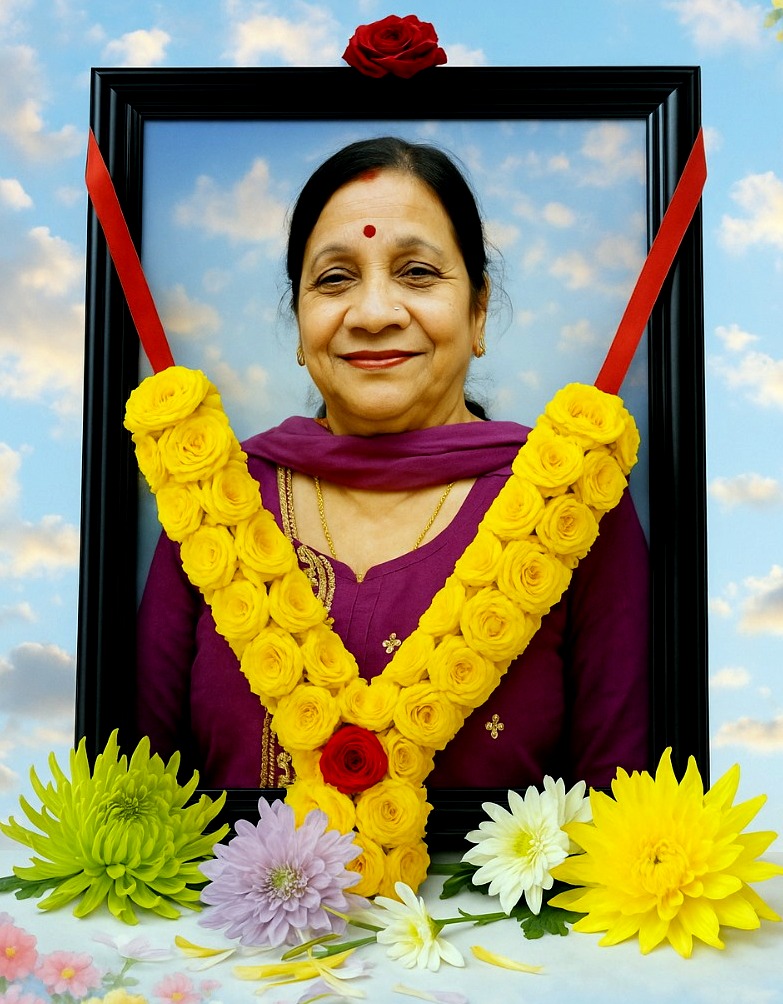The Indo-American Press Club (IAPC), the largest organization representing media professionals of Indian origin in North America, has announced the awardees who will honored at the 10th annual International Media Conference from May 3 to May 5, 2025 at The Woodlands Inn and Resort in Poconos, Pennsylvania.
The Media Conference will have participation from renowned journalists, media professionals, writers, and community leaders for discussions on media excellence, innovation, and global collaboration.
Marking a decade of fostering connections among media professionals, the conference will provide a vital platform for networking, knowledge-sharing, and building meaningful collaborations. Attendees can expect insightful panel discussions, keynote speeches, and interactive sessions led by media experts, offering valuable perspectives on the evolving world of journalism.
With digital transformation and press freedom remaining critical global issues, the conference will facilitate discussions on key challenges and potential solutions shaping the future of journalism.
Dr. Satheesh Kathula. Lifetime Achievement Award 2025
Dr. Satheesh Kathula, a board-certified hematologist and oncologist from Dayton, Ohio, practicing Medicine for over two decades, is the President of the American Association of Physicians of Indian Origin (AAPI).
Dr. Kathula is a clinical professor of medicine at Wright State University-Boonshoft School of Medicine, Dayton, Ohio, and is a Diplomate of the American Board of Lifestyle Medicine. He has authored several papers and articles in medical journals and has authored a book, describing his journey as an immigrant physician. The book is being released today at our Conference.
Dr. Kathula has dedicated his career to treating patients and actively supporting various nonprofit organizations. He strongly believes that acquiring new knowledge is crucial for professionals, especially physicians, with a changing healthcare environment. Recently, Dr. Kathula acquired a certificate from Stanford University in Artificial Intelligence in Healthcare. He graduated in May 2024 from Harvard University completing a “Global Healthcare Leaders Program.”
Dr. Kathula was the President and founding member of the Association of Indian Physicians from Ohio, President of the Miami Valley Association of Physicians of Indian Origin as well as the President of the ATMGUSA (Association of Telugu Medical Graduates in USA). In addition, he has worked with the Ohio State Medical Association on various issues. He has been actively involved in community service locally, nationally, and internationally for the last two decades. He was awarded ‘Man of the Year – 2018’ by the Leukemia and Lymphoma Society.
Not satisfied with his personal and professional achievements, Dr. Kathula has been active in the Indian community. With the objective of enabling Physicians of Indian Origin to give back to their motherland, India, he organized the Global Healthcare Summit is New Delhi, India in October this year.
Dr Kathula’s love for his motherland has manifested in him setting up humanitarian and medical projects in India. The most important of them is establishing a state-of-the-art pharmacy college in Warangal in Telangana, where he grew up. Named the Pathfinder Institute of Pharmacy and Educational Research (PIPER), the non-profit with Dr Kathula as the Chairman, provides quality education and has already graduated over 1,000 students who are now working in different parts of India and abroad. He conducted several medical camps close to his native place and donated a defibrillator, water purification plant, and library to his native place.
In 2024, Dr. Kathula was honored with the Inspirational Award given by Raising Awareness of Youth with Autism (RAYWA) Foundation for his contributions to the country, particularly in the field of healthcare, and his
Anju Vallabhaneni – Lifetime Achievement Award 2025
Anju Vallabhaneni is a highly committed leader with extensive expertise in global delivery and a deep passion for community service. He is the National President of ITServe Alliance, a non-profit association representing over 2,500 IT companies across the United States.
Anju’s impressive academic background includes an Engineering degree and an MBA. His career spans more than 25 years, during which he has served as President and CEO of several companies in North America, Latin America, and India.
His leadership and strategic vision have been instrumental in managing businesses with revenues ranging from $5 million to over $100 million.
In 2002, Anju founded United Software Group (USG), a company that has seen tremendous growth under his guidance. Over the past two decades, USG has expanded to employ over 2,000 professionals worldwide. The company’s success has been recognized on a national scale; Inc. 5000 listed USG among America’s Fastest-Growing Private Companies, and it was ranked #107 in the US-Midwest region in 2024.
Anju’s dedication extends beyond his professional achievements. He is deeply involved in philanthropic efforts, actively supporting over ten non-profit organizations. His commitment to giving back to the community highlights his belief in the importance of social responsibility.
Beyond his professional and philanthropic endeavors, Anju is also a seasoned athlete. He has completed more than 25 marathons, demonstrating his discipline, perseverance, and dedication in both his personal and professional life.
Anju is also a seasoned athlete, having completed over 25 marathons. Anju Vallabhaneni’s multifaceted career and contributions make him a deserving recipient of the Lifetime Achievement Award 2025, a testament to his enduring impact on the IT industry and his unwavering commitment to community service and personal excellence.
Prakash A. Shah. Lifetime Achievement Award 2025
Prakash Shah, Chairman and Chief Executive of First Growth Mortgage and Realty Group, is the current President of the Global Organization for the People of Indian Origin (GOPIO) International. He is a Founding Life Member of GOPIO, Asian American Hotel Owner’s Association (AAHOA ), National Federation of Indian Association and the New York City based India Chamber of Commerce of America, which he led for 15 Years, He is a former Chairman of New Jersey Development Authority and President Clinton’s Appointee to the Board of $108 Million Southern Africa Fund for 12 Countries of Southern Africa and Chair of the Board’s Investment Committee,
Prakash Shah served as the Chairman of New Jersey Development Authority under Governors Florio and Whitman. Mr. Shah was the Global Ambassador of GOPIO and later on, he was the Convener of the GOPIO Convention 2024 in New Jersey.
Mr. Shah, a well-respected leader in the Indian diaspora community, has more than 45 years of experience in the areas of mortgage banking, international investment banking, venture capital, financial management, computer systems and management sciences. Prior to founding First Growth, a financial company, Mr. Shah was concurrently Managing Directo of Asian Oceanic Group (a merchant banking group based in New York, Hong Kong and Singapore). Mr. Shah was Vice President of American Express Bank Ltd. and was responsible for the strategic planning and management information systems departments.
Mr. Shah was elected as a Hillary Clinton Delegate to the Democratic National Convention. Mr. Shah received a B.S.M.E. degree from the University of Baroda (India) in 1967, an M.S. degree in Management Sciences from Stevens Institute of Technology in 1969, and in 1971, completed course work for a Ph.D. at New York University. Mr. Shah holds Real Estate and Title Insurance Producer Licenses and is a Certified Hotel Administrator (CHA) and Certified Hotel Owner (CHO).
Dr. Vemuri S Murthy, MD, MS, FAHA, FICS. Lifetime Achievement Award 2025
Dr. Vemuri S. Murthy is an alumnus of Guntur Medical College and All India Institute of Medical Sciences, New Delhi, India (General Surgery). A former Chicago Anesthesiologist (and Department Chairman) for over thirty years, he is currently an Associate Professor (Adjunct) in the Department of Emergency Medicine at the University of Illinois College of Medicine in Chicago, Illinois, USA.
Dr. Murthy introduced the resuscitation training model for Indian Medical Colleges at Dr.NTR University of Health Sciences in 2012. He has been affiliated with the American Heart Association (AHA) for over thirty years in various capacities, such as Member of the International Committee, National Faculty and Advisor to AHA International Training Centers in India.
Dr. Murthy is a visiting professor at various Indian medical institutes, such as the All India Institute of Medical Sciences.He chaired many Resuscitation and Emergency Medical Care Conferences in India, AHA ReSS sessions program in the USA, lectured at acclaimed US Medical Universities and authored resuscitation-related Journal articles and Cardiology book chapters. He is the co-investigator of a ground-breaking Cardiac Arrest Registry in India, “Warangal Area Cardiac Arrest Registry”.
Dr. Murthy founded Chicago Medical Society’s Community CPR Project SMILE (Saving More Illinois Lives through Education) in 2011. As an Advisor to the Odisha State Government (Health and Family Welfare), he initiated India’s first State Governmental community CPR training project in Odisha in 2023. He also founded the first Indo-US Community Health and CPR Training Center at the National India Hub, Schaumburg, Illinois, USA (2024).
Dr. Murthy, a past President of the Chicago Medical Society and Indian American Medical Association (Illinois), has received several prestigious national and international awards including two Lifetime Achievement Awards and a Medal of US Congress as “Global Champion of Resuscitation” for his professional and community service contributions in the USA and India. He has been contributing to Indo-US News media articles and videos raising awareness of Heart disease and Cardiac Arrests among Indians and Indian diaspora for over two decades.
Sam Maddula. Lifetime Achievement Award 2025
Sam Maddula, Founder & CEO of Bank’s Apothecary Specialty Pharmacy, is an esteemed leader, entrepreneur, and committed philanthropist. His life transformed dramatically when his parents discovered an Eye Camp set up by the Eye Foundation of America (EFA) in 1987 in Andhra Pradesh. This camp enabled him to overcome legal blindness and poverty, changing his life trajectory from darkness to light.
After earning his doctorate in pharmaceutical studies from Rutgers University, Maddula founded a specialty pharmacy in 2010, focusing on mental health and substance disorders. His leadership propelled Bank’s Apothecary Specialty Pharmacy to generate $350 million in annual revenue, becoming the largest independently held behavioral health specialty pharmacy with operations in 16 states.
With over 15 years of experience driving growth and innovation in healthcare and specialty pharmacy, Maddula’s expertise spans business, medicine, and philanthropy. His ventures aim to improve lives through healthcare innovation and support both for-profit and non-profit initiatives. He established the Maddula Foundation, contributing significantly to healthcare and educational initiatives for underserved communities.
Maddula serves on the Executive Advisory Council Board at the University of Washington School of Pharmacy, the Board of Directors at Liguori Academy, and the Eye Foundation of America. He is a renowned speaker on healthcare, philanthropy, and leadership, with two decades of experience as a pharmacist, clinician, and CEO. Maddula mentors aspiring pharmacists and continues to advocate for a more equitable society through various non-profits and civic organizations.
A passionate philanthropist, Maddula has contributed significantly to the Eye Foundation of America and mentors the next generation of leaders. His commitment to giving back is evident in his active involvement in community service and advocacy for societal change.
Madhavan B. Nair. Lifetime Achievement Award 2025
Madhavan B. Nair (MBN) is a Chartered Financial Consultant and esteemed community leader, renowned for his dedication to public service, cultural involvement, and philanthropy. Based in New Jersey, he has long committed himself to advancing the well-being of the Indian-American community through various leadership roles and grassroots initiatives.
Professionally, Mr. Nair is the Principal and owner of MBN Insurance & Financial Services Inc., where he has built a strong reputation for trust, integrity, and service. His entrepreneurial career provided a solid foundation for his broader involvement in community development.
Mr. Nair is the Founder and Patron of the North American Malayalee Association of Malayalees (NAMAM), established in 2010 with the objectives of supporting and uplifting Indian culture and heritage among Indian immigrants in the USA. From 2018 to 2020, he served as President of FOKANA (Federation of Kerala Associations in North America), extending his leadership both across North America and internationally. Under his stewardship, FOKANA’s relief efforts during the COVID-19 pandemic and the Kerala floods received widespread appreciation.
In 2017, Mr. Nair established the MBN Foundation as the principal vehicle for his philanthropy. Upon retiring from full-time business in 2025, he dedicated himself entirely to advancing its mission. Today, the Foundation is devoted to nurturing student skill development and championing cancer-prevention initiatives—addressing urgent needs in education and healthcare to deliver lasting impact.
In 2023, Mr. Nair published two essay collections—’Sunlit Signs’ (in English) and ‘Veyil Kaazhchakal’ (in Malayalam)—in which he reflects on political developments, pivotal historical events, and pressing global affairs.
Leveraging his professional achievements and unwavering commitment to social causes, Mr. Nair has firmly established himself as a distinguished and influential leader within both the Indian American community and the larger society.
Rohit Vyas — Lifetime Achievement Award 2025
Rohit Vyas is an acclaimed documentary filmmaker and a veteran international broadcast journalist whose distinguished career spans over four decades across television, print, and documentary media. As the former News Director, Senior Vice President, and Principal Nightly News Anchor at TV ASIA (USA), he played a pivotal role in shaping the voice of one of the most influential South Asian networks in North America.
Prior to that, he served as News Director and Principal Anchor for Vision of Asia News, CH 47, delivering trusted news to the New York Tri-State area. In addition to his editorial leadership, Rohit Vyas serves as Chief Advisor to ITV Gold (USA), continuing to guide the network’s journalistic and programming strategy.
His editorial footprint extends to print journalism, where he was the Editor of several publications, including the International Observer, a newsweekly dedicated to United Nations affairs and global diplomacy. A respected figure in international media circles, he is a long-standing member of the United Nations Correspondents Association (for over 40 years) and a former member of the White House Traveling Media Delegation, covering pivotal moments and global summits alongside world leaders.
His commitment to public service and journalistic integrity earned him a place on the Asian American Pacific Advisory Council under New Jersey Governor Christine Whitman. His contributions have been honored by the New Jersey State Assembly, the Nassau County Executive of Long Island, New York, and numerous civic and professional organizations nationwide, celebrating his legacy of impactful journalism and unwavering service to the community.
An objective storyteller at heart, Rohit Vyas continues to create thought-provoking documentaries that shed light on diaspora narratives, international affairs, and pressing global issues.
Since its inception in 2013, the Indo-American Press Club has become a leading voice for Indian-origin journalists in North America. With active chapters in multiple cities—including Alberta, Atlanta, Connecticut, Dallas, Houston, New Jersey, New York, Niagara, Philadelphia, Toronto, Vancouver, and Washington, DC—the organization continues to champion press freedom, journalistic integrity, and professional development.
Through annual conferences, networking events, and training programs, IAPC has played a key role in advocating for ethical journalism while strengthening the connection between Indian American media professionals and mainstream journalism.
As the media landscape continues to change, this conference will serve as a critical forum for innovation, ethical discourse, and collaboration, ensuring that journalists remain at the forefront of truth, integrity, and impactful storytelling.
For details on registration, participation, and sponsorship opportunities, visit the official IAPC website at www.indoamericanpressclub.com

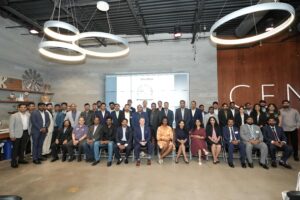
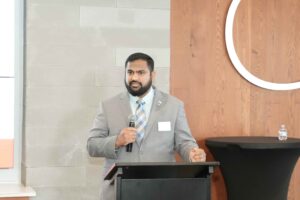
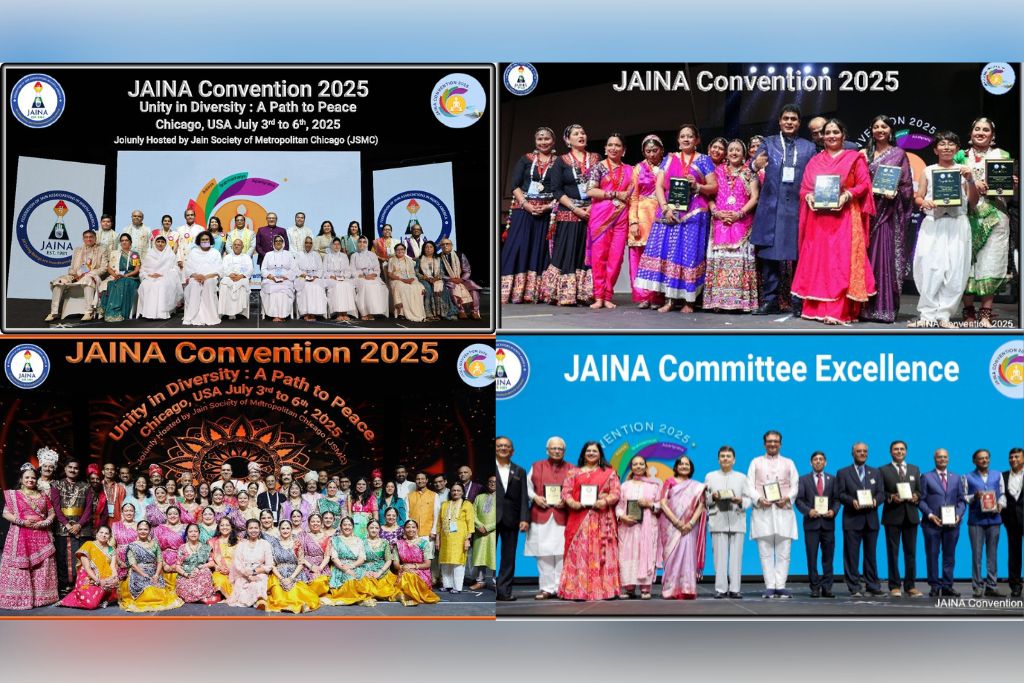 The 23rd Biennial JAINA Convention, hosted by the Federation of Jain Associations in North America (JAINA) in collaboration with the Jain Society of Metropolitan Chicago (JSMC), took place at the Renaissance Schaumburg Convention Center and Hyatt Regency in Schaumburg, Illinois. From July 3 to July 6, 2025, the convention gathered delegates from 72 Jain Centers across the U.S. and Canada, alongside attendees from 10 other countries including India, the UK, Germany, Oman, Dubai, and Kenya. Celebrated under the theme “Unity in Diversity: A Path to Peace,” this event highlighted Jain principles such as Ahimsa (non-violence), Anekantvad (multiple viewpoints), and Aparigraha (non-possessiveness).
The 23rd Biennial JAINA Convention, hosted by the Federation of Jain Associations in North America (JAINA) in collaboration with the Jain Society of Metropolitan Chicago (JSMC), took place at the Renaissance Schaumburg Convention Center and Hyatt Regency in Schaumburg, Illinois. From July 3 to July 6, 2025, the convention gathered delegates from 72 Jain Centers across the U.S. and Canada, alongside attendees from 10 other countries including India, the UK, Germany, Oman, Dubai, and Kenya. Celebrated under the theme “Unity in Diversity: A Path to Peace,” this event highlighted Jain principles such as Ahimsa (non-violence), Anekantvad (multiple viewpoints), and Aparigraha (non-possessiveness).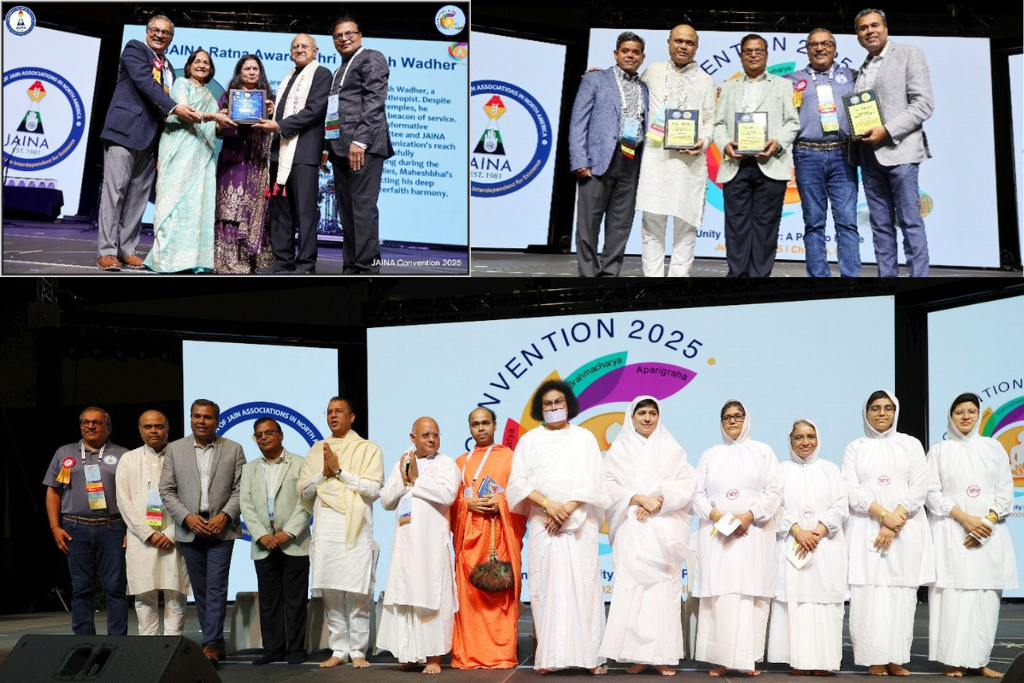 featuring Ashtapad—a unique creation showcasing 24 Tirthankaras—with sacred rituals and chants embracing the essence of Jainism. This was followed by the Exhibition Inauguration Ceremony displaying art, literature, and artifacts that emphasized the rich cultural heritage of Jainism.
featuring Ashtapad—a unique creation showcasing 24 Tirthankaras—with sacred rituals and chants embracing the essence of Jainism. This was followed by the Exhibition Inauguration Ceremony displaying art, literature, and artifacts that emphasized the rich cultural heritage of Jainism.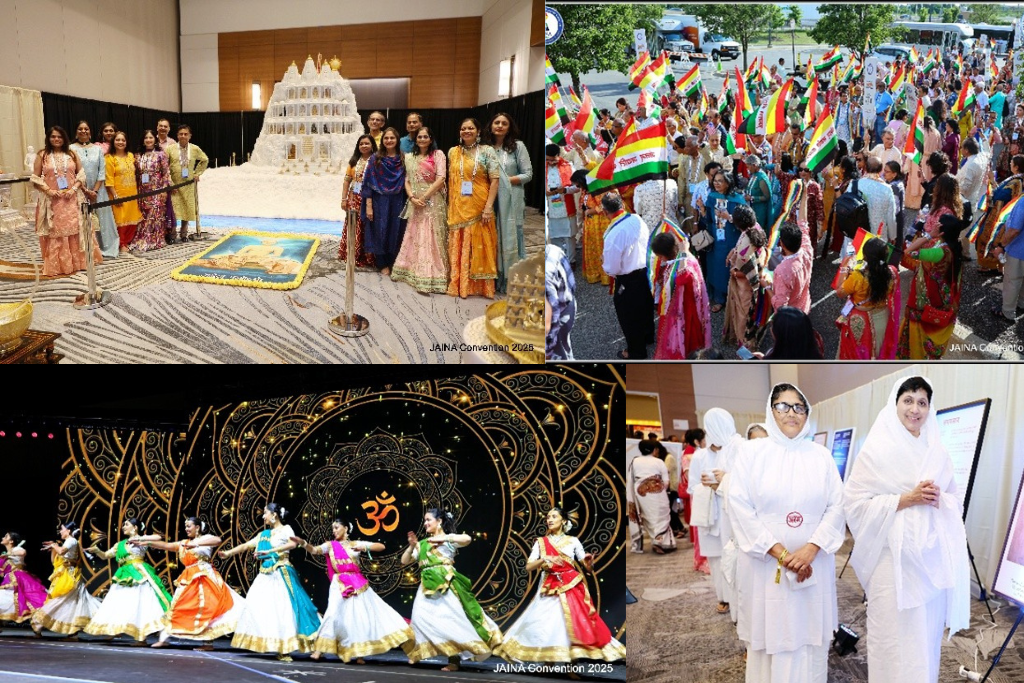 Day two on July 4 began with calming yoga and meditation sessions, led by Samani Dr. Pratibha Pragyaji and Samani Punya Pragyaji, fostering inner peace among attendees. The day’s events included stirring speeches by JAINA President Bindesh Shah and JSMC President Pragnesh Shah, followed by a keynote by Pujya Dr. Gyanvatsal Swamiji on spiritual resilience. A variety of sessions included “મૈત્રીવાદ નો શંખવાદ” by Dr. Tej Sahebji and “The Most Urgent Act of True Ahimsa: What We Eat” by Dr. Faraz Harsini advocating for veganism.
Day two on July 4 began with calming yoga and meditation sessions, led by Samani Dr. Pratibha Pragyaji and Samani Punya Pragyaji, fostering inner peace among attendees. The day’s events included stirring speeches by JAINA President Bindesh Shah and JSMC President Pragnesh Shah, followed by a keynote by Pujya Dr. Gyanvatsal Swamiji on spiritual resilience. A variety of sessions included “મૈત્રીવાદ નો શંખવાદ” by Dr. Tej Sahebji and “The Most Urgent Act of True Ahimsa: What We Eat” by Dr. Faraz Harsini advocating for veganism.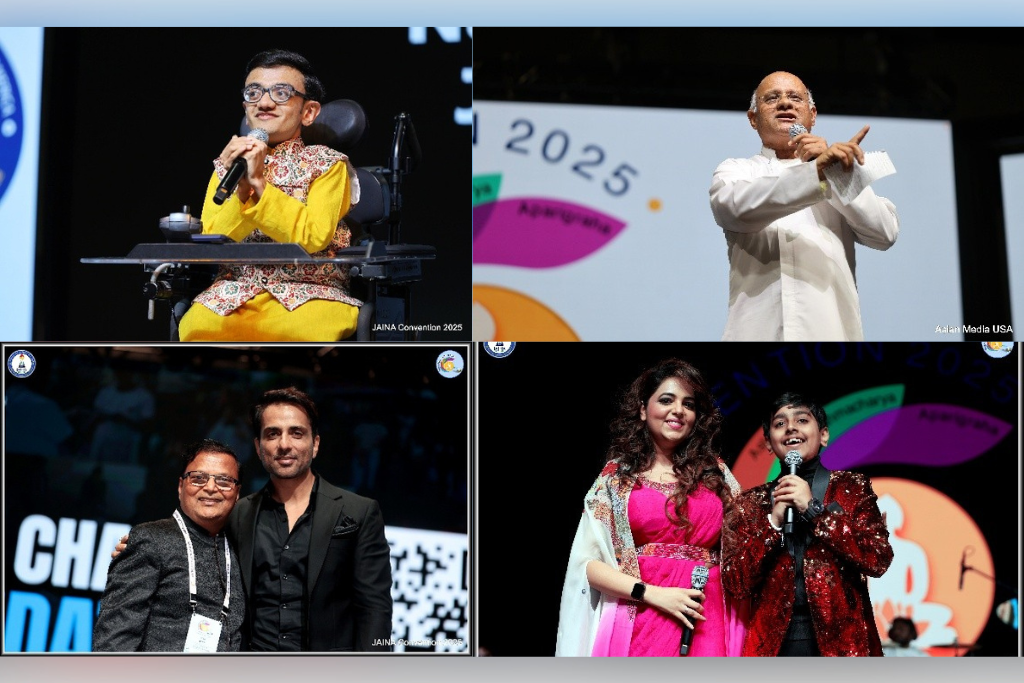 Empowerment Forum featuring Judge Neera Bahl among others. Keynote presentations and sessions explored diverse themes such as ecological crises and crisis care, enriching attendees with knowledge and inspiration. A blood drive that started on this day exemplified Jainism’s commitment to compassion, potentially impacting 276 lives.
Empowerment Forum featuring Judge Neera Bahl among others. Keynote presentations and sessions explored diverse themes such as ecological crises and crisis care, enriching attendees with knowledge and inspiration. A blood drive that started on this day exemplified Jainism’s commitment to compassion, potentially impacting 276 lives.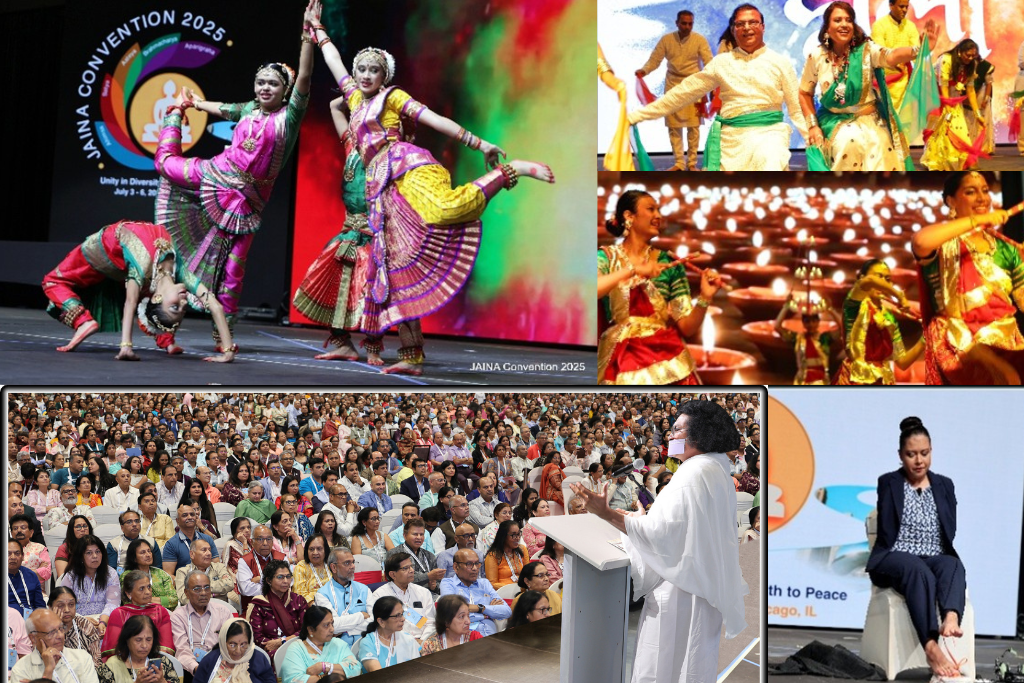 Attendees gained perspectives from sessions such as Digital Karma by Pinkesh Shah, exploring AI’s ethical dimensions, alongside unity and diversity topics. The evening culminated with cultural performances and a keynote by Bollywood icon Sonu Sood emphasizing charitable actions.
Attendees gained perspectives from sessions such as Digital Karma by Pinkesh Shah, exploring AI’s ethical dimensions, alongside unity and diversity topics. The evening culminated with cultural performances and a keynote by Bollywood icon Sonu Sood emphasizing charitable actions.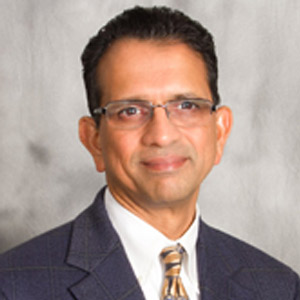
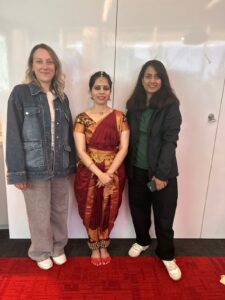
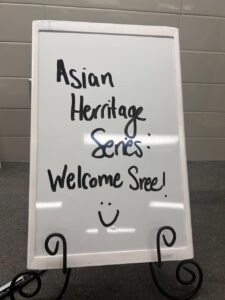
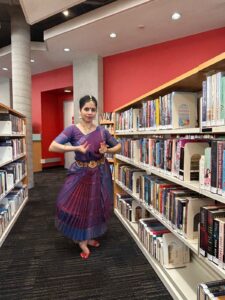

 Dr. Amit Chakrabarty: A Visionary Leader with Over Two Decades of Dedicated Service to AAPI, Poised to Propel the Organization to New Heights
Dr. Amit Chakrabarty: A Visionary Leader with Over Two Decades of Dedicated Service to AAPI, Poised to Propel the Organization to New Heights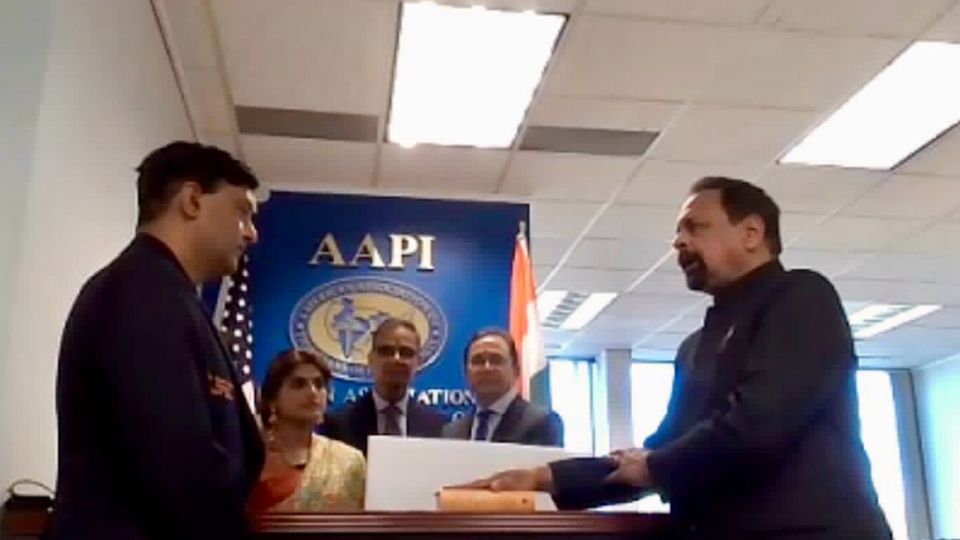
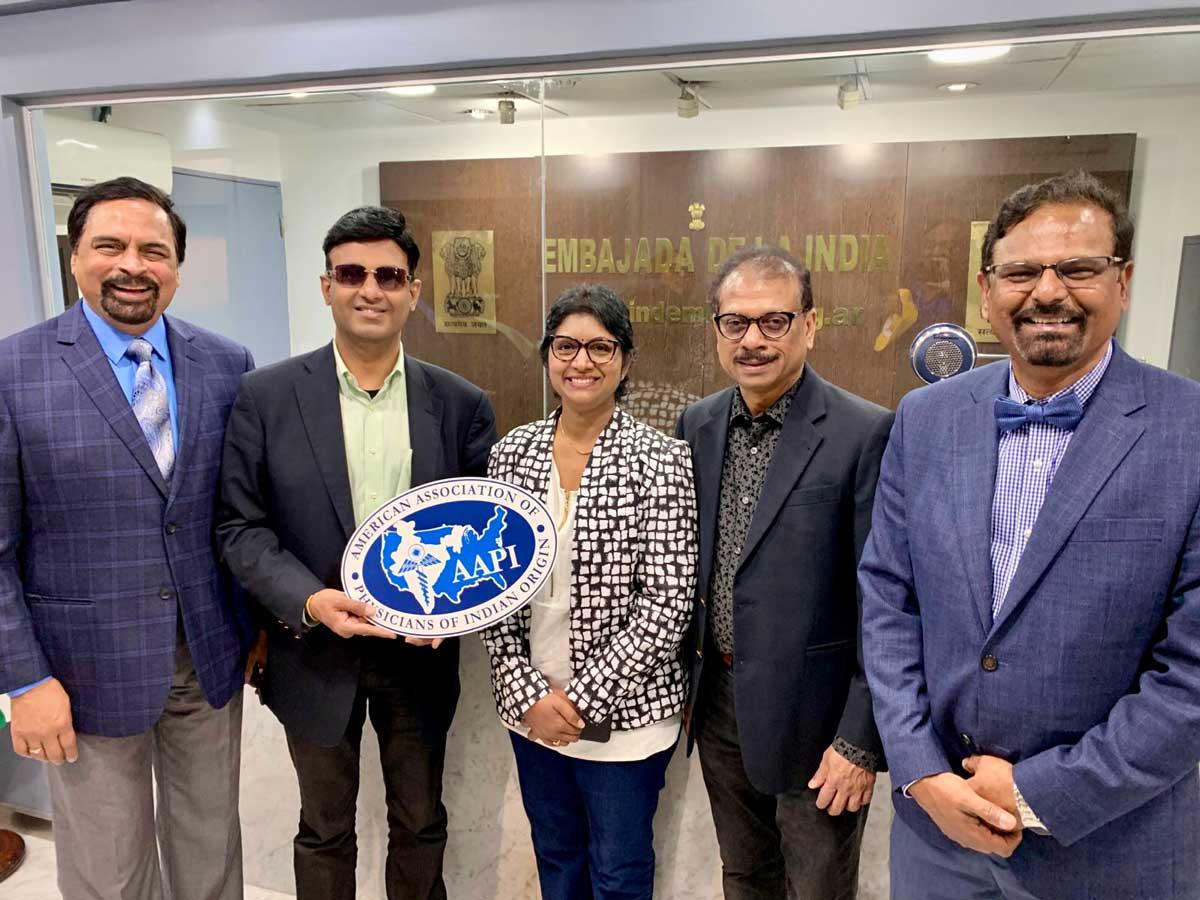
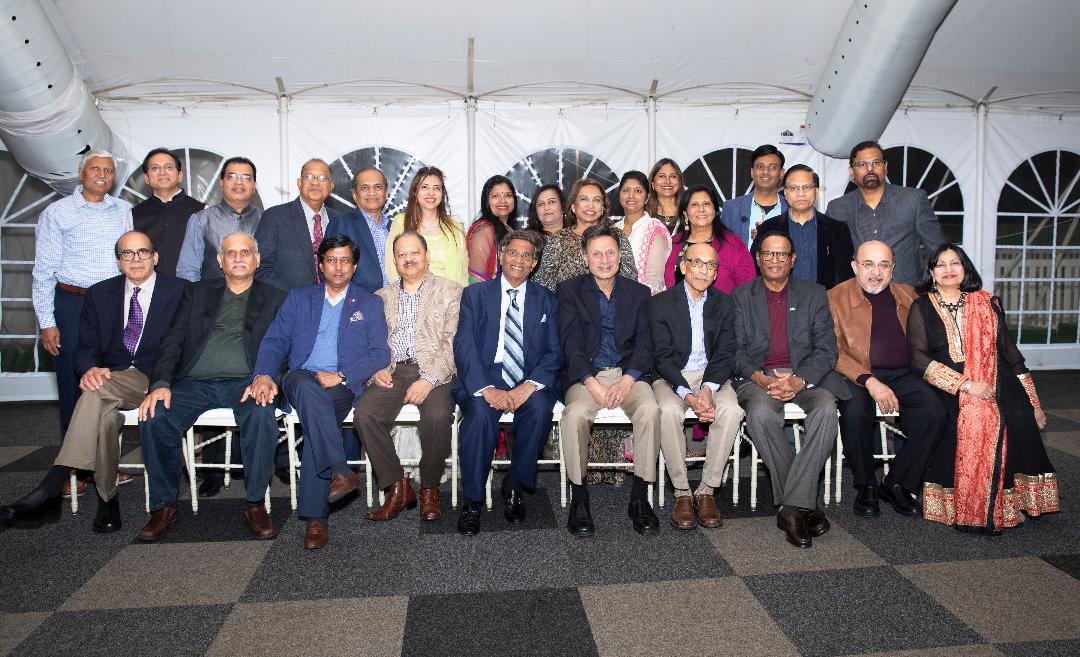
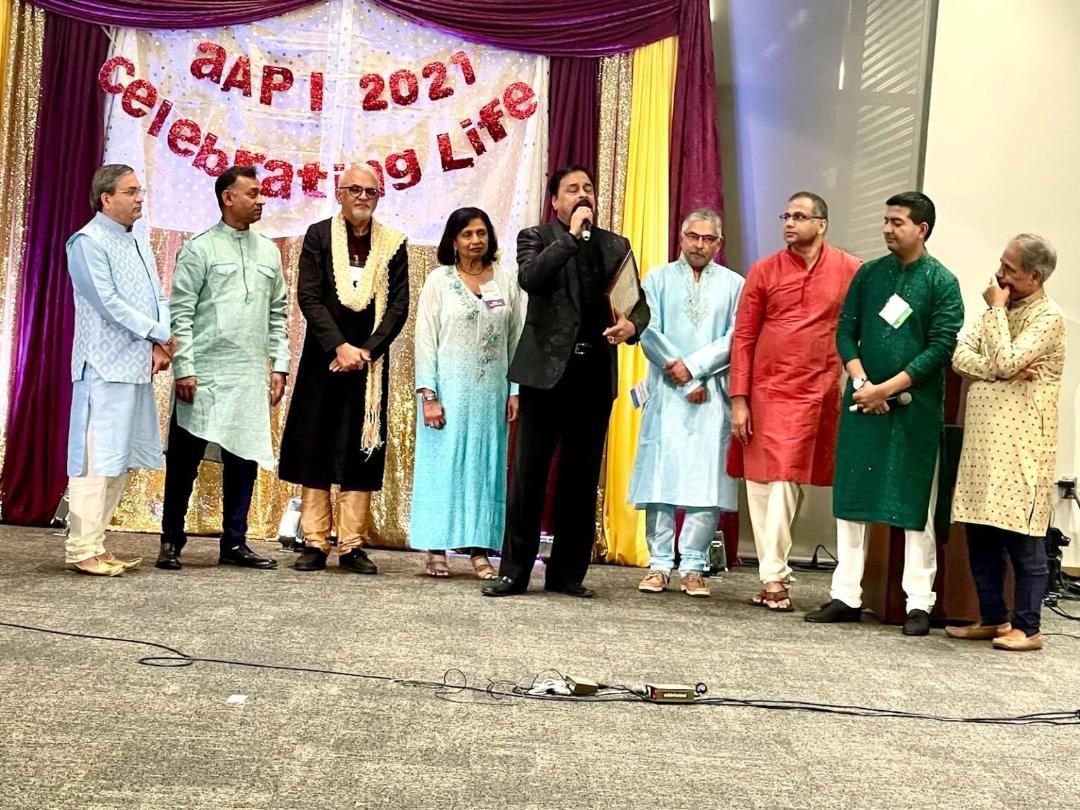
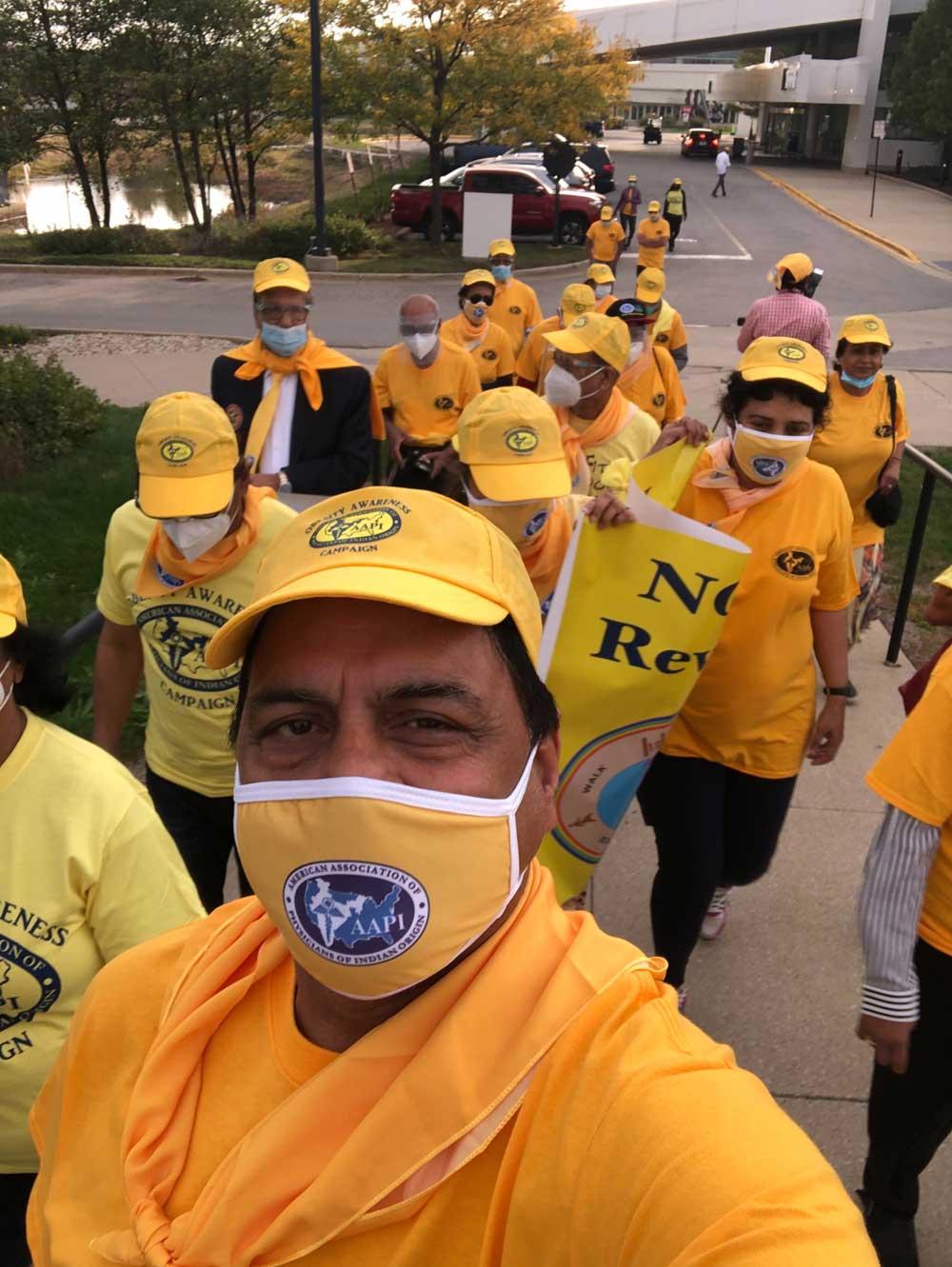 Dr. Amit Chakrabarty envisions a future where AAPI stands as a globally respected, politically empowered, and socially impactful force in healthcare. His international vision includes:
Dr. Amit Chakrabarty envisions a future where AAPI stands as a globally respected, politically empowered, and socially impactful force in healthcare. His international vision includes: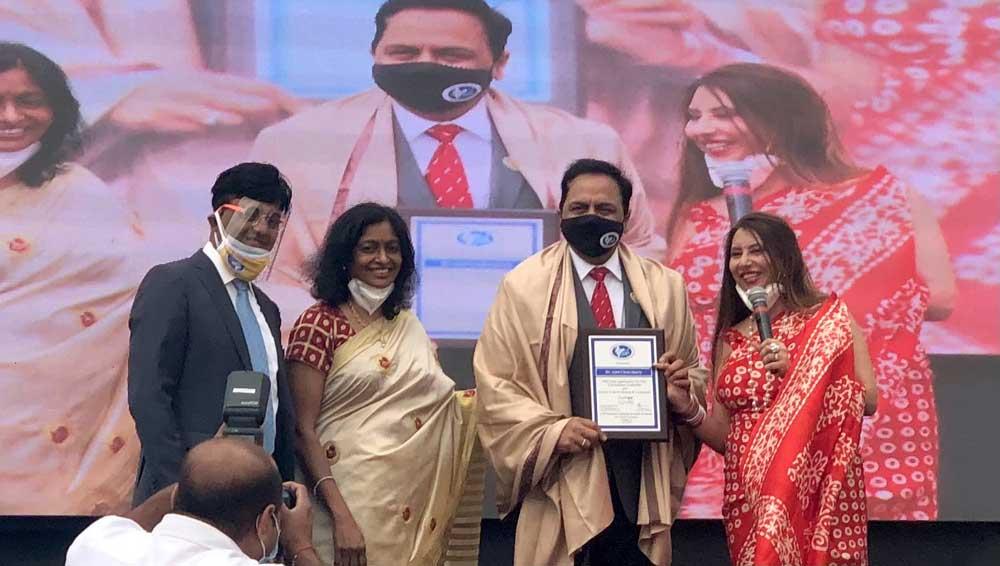
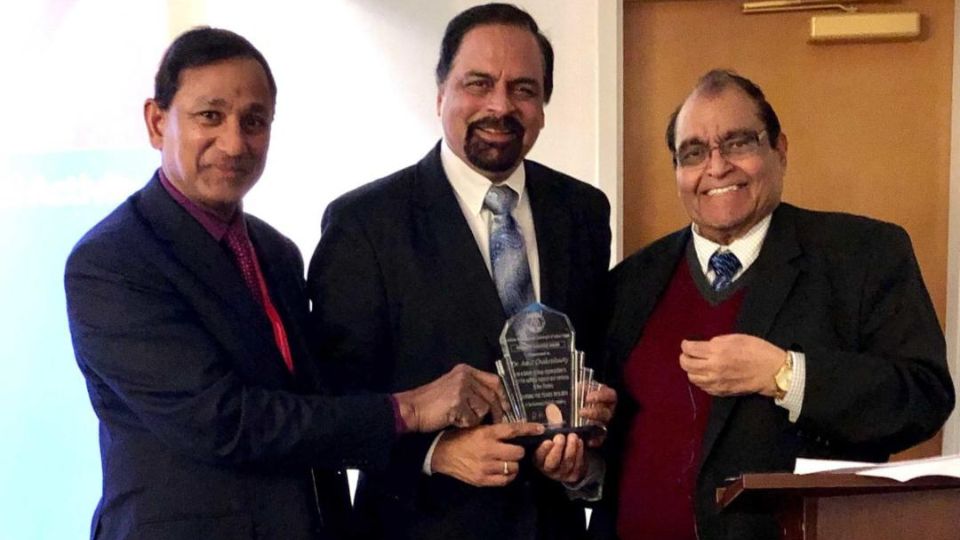
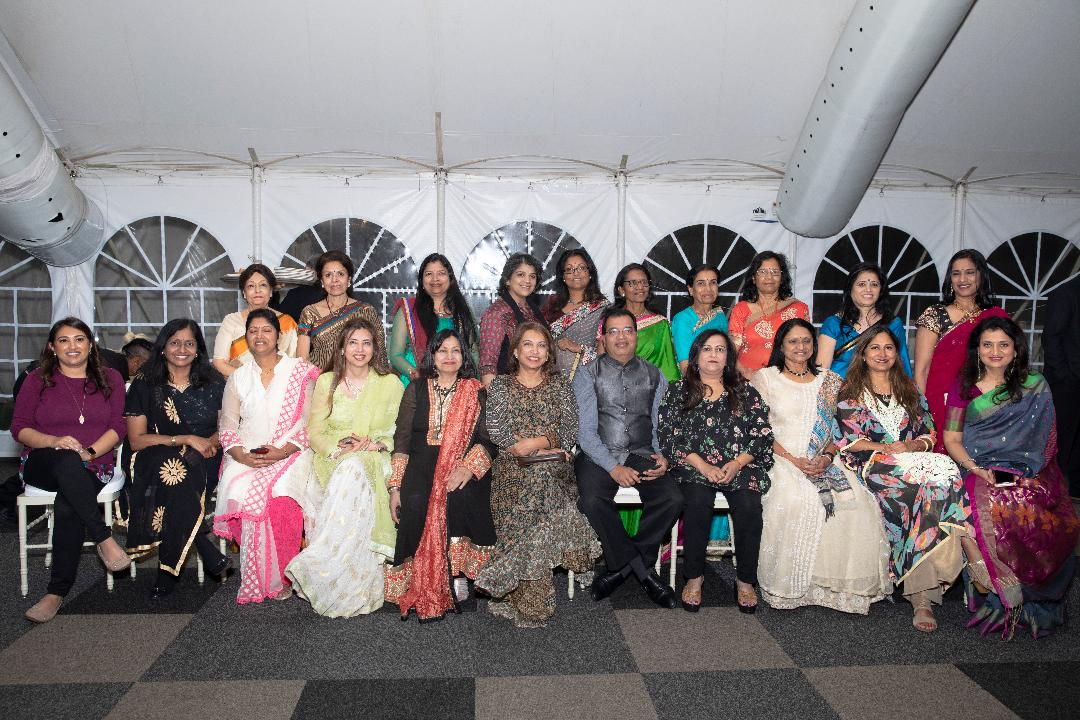
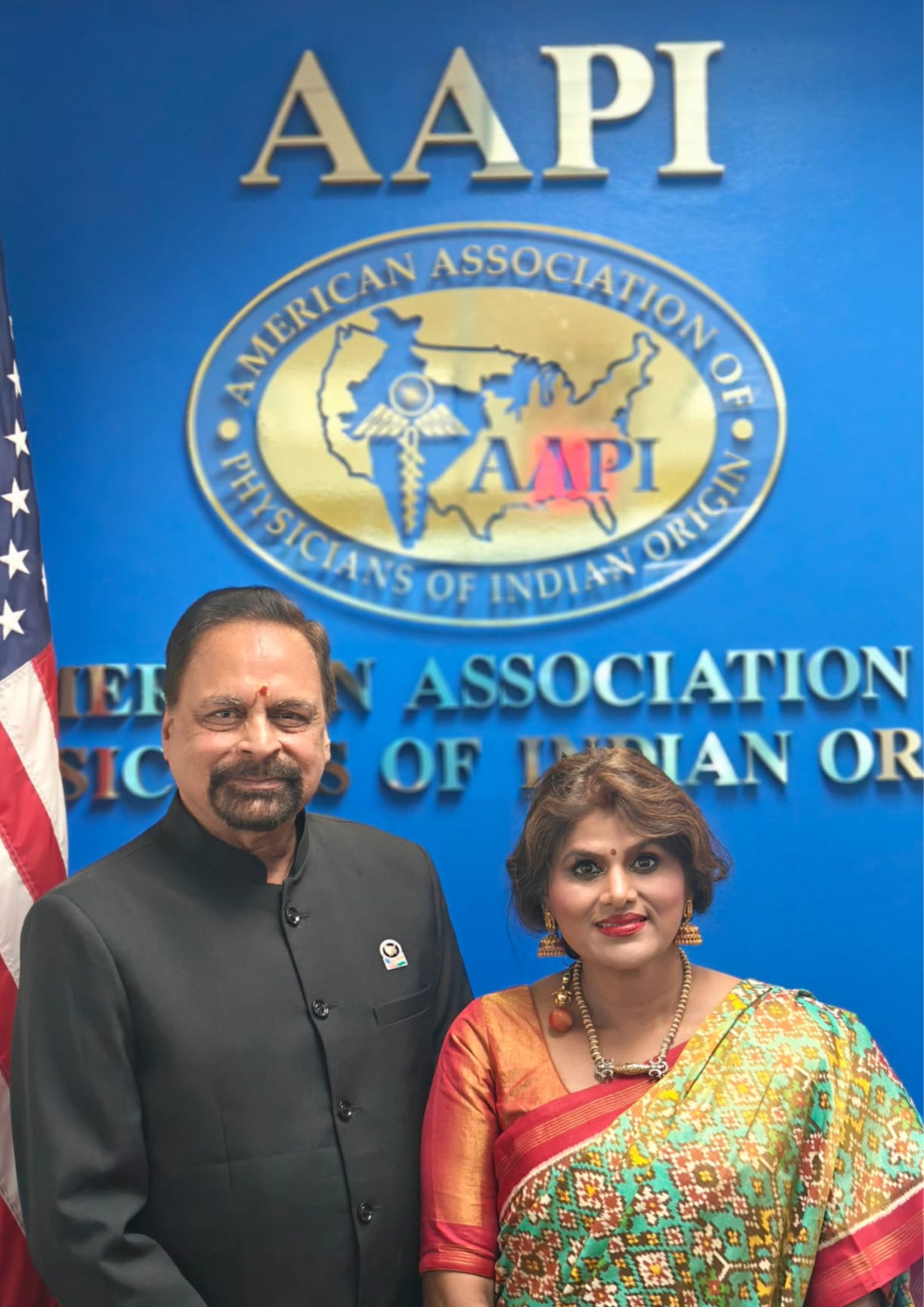 For the first time in the history of the American Association of Physicians of Indian Origin (AAPI), during a formal ceremony Dr. Amit Chakrabarty and Dr. Hetal Gor were formally administered the oath of office as the President & Chairperson of the Board of Trustees of AAPI, respectively at a solemn ceremony at the AAPI office in Oak Brook, IL, on July 3rd, 2025.
For the first time in the history of the American Association of Physicians of Indian Origin (AAPI), during a formal ceremony Dr. Amit Chakrabarty and Dr. Hetal Gor were formally administered the oath of office as the President & Chairperson of the Board of Trustees of AAPI, respectively at a solemn ceremony at the AAPI office in Oak Brook, IL, on July 3rd, 2025.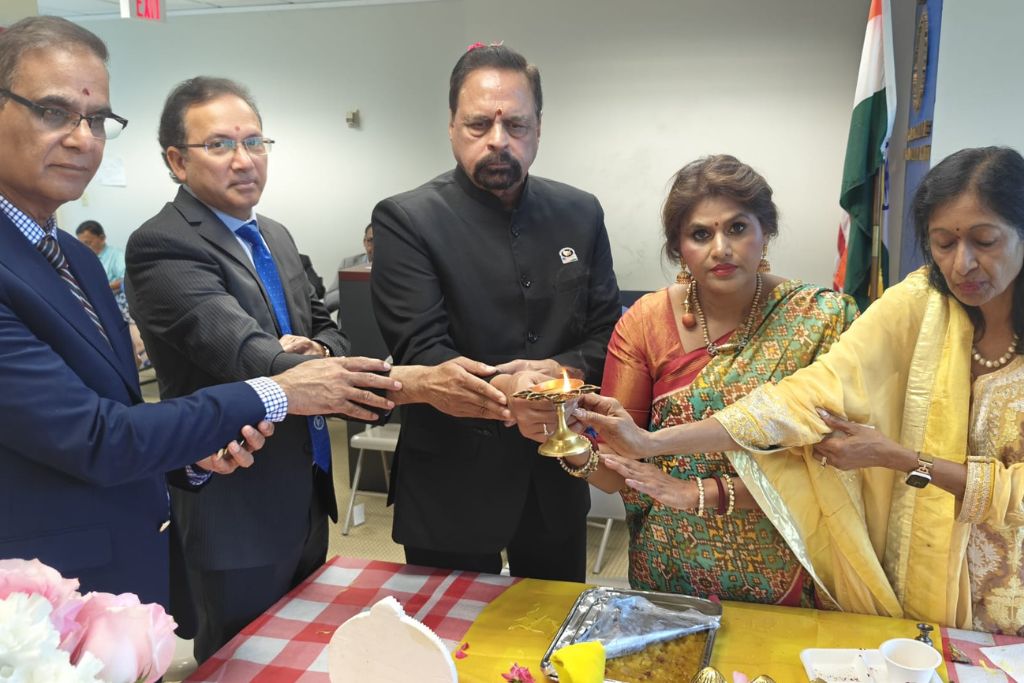 “We have the potential to make a significant impact on the healthcare landscape of this country,” Dr. Chakrabarty said. “My goal this year is to unify AAPI by transcending the regional divides that have hindered our progress in recent years. Indian American physicians represent tremendous talent and potential, and the key to realizing that lies in collective action and a united voice—something I am committed to fostering.”
“We have the potential to make a significant impact on the healthcare landscape of this country,” Dr. Chakrabarty said. “My goal this year is to unify AAPI by transcending the regional divides that have hindered our progress in recent years. Indian American physicians represent tremendous talent and potential, and the key to realizing that lies in collective action and a united voice—something I am committed to fostering.”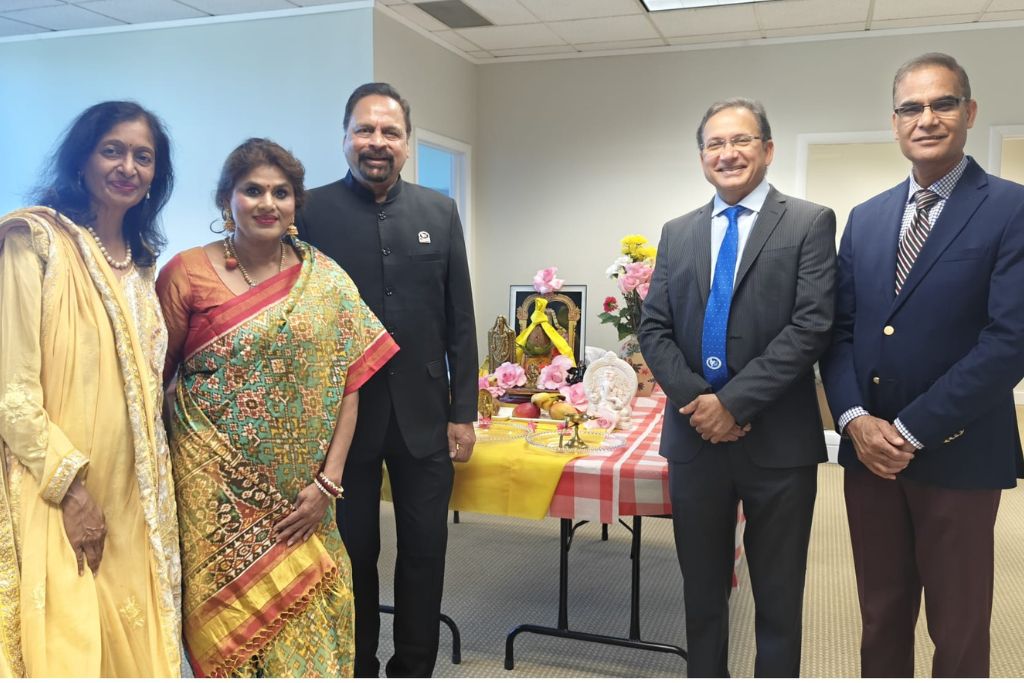 Physician, serving as the Medical Director of Mount Sinai Hospital, FAQH Center, and a Staff Physician Advocate at Good Samaritan Hospital as well as a Clinical Preceptor at UIC College of Medicine, Department of Family Medicine CMU School of Medicine also was administered the oath of office as the President Elect of AAPI.
Physician, serving as the Medical Director of Mount Sinai Hospital, FAQH Center, and a Staff Physician Advocate at Good Samaritan Hospital as well as a Clinical Preceptor at UIC College of Medicine, Department of Family Medicine CMU School of Medicine also was administered the oath of office as the President Elect of AAPI. Serving 1 in every 7 patients in the US, AAPI members care for millions of patients every day, while several of them have risen to hold high-flying jobs, shaping the policies and programs, and inventions that shape the landscape of healthcare in the US and around the world.
Serving 1 in every 7 patients in the US, AAPI members care for millions of patients every day, while several of them have risen to hold high-flying jobs, shaping the policies and programs, and inventions that shape the landscape of healthcare in the US and around the world.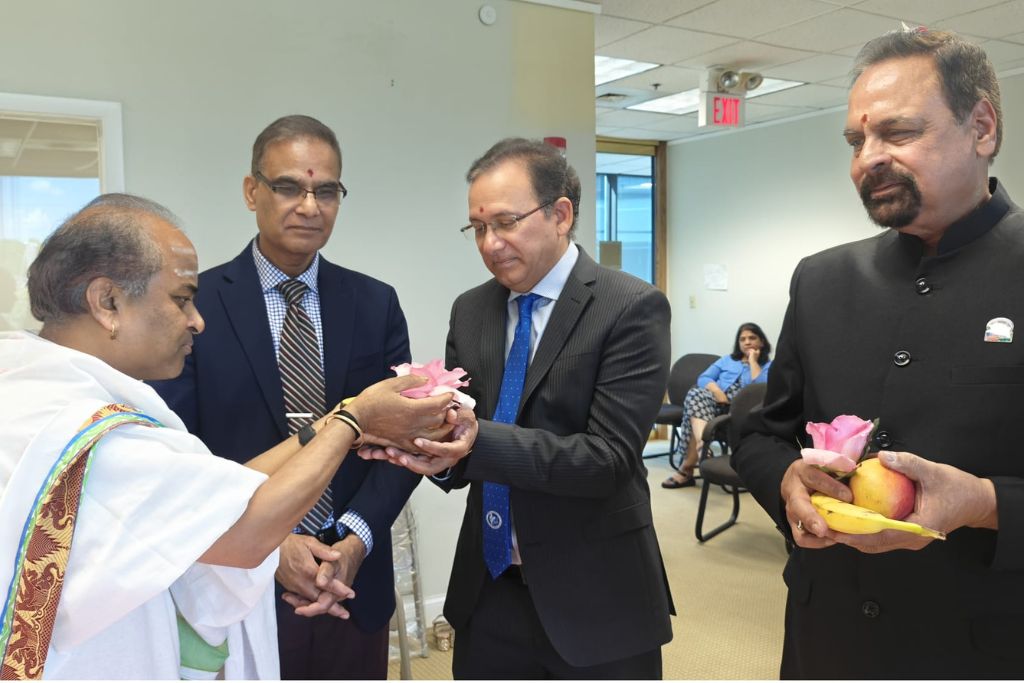
 The American Telugu Association (ATA) held its Board Meeting on Saturday, June 28, 2025, at the APA Hotel Woodbridge in New Jersey. The event began with a devotional prayer song, followed by graceful classical dance performances. The board discussed recently conducted events, upcoming priorities, and partnerships, and approved the site and dates for the 19th ATA Conference.
The American Telugu Association (ATA) held its Board Meeting on Saturday, June 28, 2025, at the APA Hotel Woodbridge in New Jersey. The event began with a devotional prayer song, followed by graceful classical dance performances. The board discussed recently conducted events, upcoming priorities, and partnerships, and approved the site and dates for the 19th ATA Conference.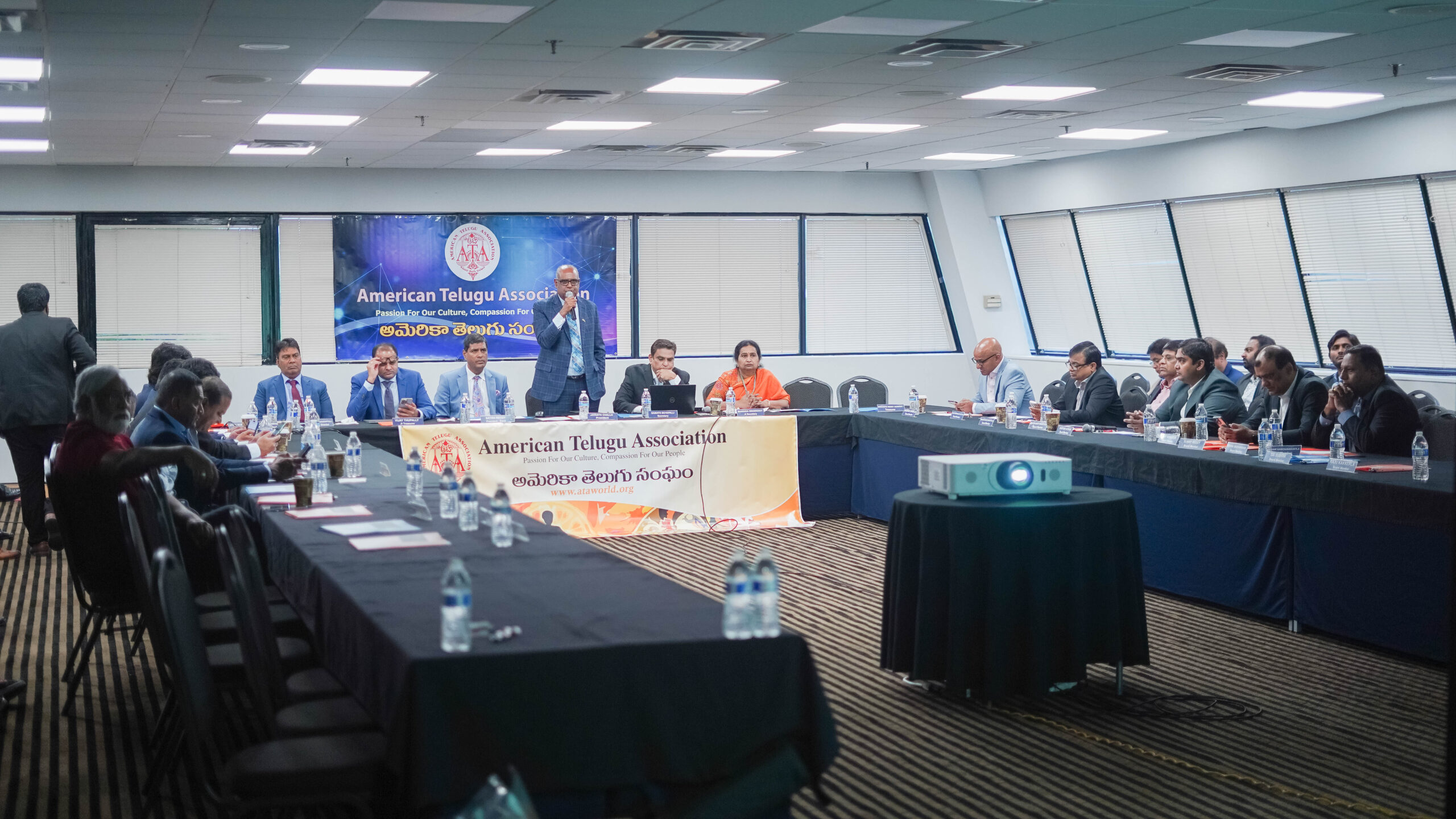 such as ATA Days, sports activities, 5K runs, yoga sessions, and community clean-up drives. Additionally, ATA has hosted a series of webinars addressing student concerns, health awareness, and immigration issues. Further initiatives include the launch of SAT preparation courses, IT training programs, and plans to expand health and fitness activities across multiple cities. Looking ahead, ATA will host Start-up Cubes competitions in six major cities to promote innovation and help transform promising ideas into successful ventures. ATA is also advancing support for small businesses and women entrepreneurs, especially in the non-IT sector, through a series of awareness seminars that will guide participants from business setup to scalable operations. Further
such as ATA Days, sports activities, 5K runs, yoga sessions, and community clean-up drives. Additionally, ATA has hosted a series of webinars addressing student concerns, health awareness, and immigration issues. Further initiatives include the launch of SAT preparation courses, IT training programs, and plans to expand health and fitness activities across multiple cities. Looking ahead, ATA will host Start-up Cubes competitions in six major cities to promote innovation and help transform promising ideas into successful ventures. ATA is also advancing support for small businesses and women entrepreneurs, especially in the non-IT sector, through a series of awareness seminars that will guide participants from business setup to scalable operations. Further 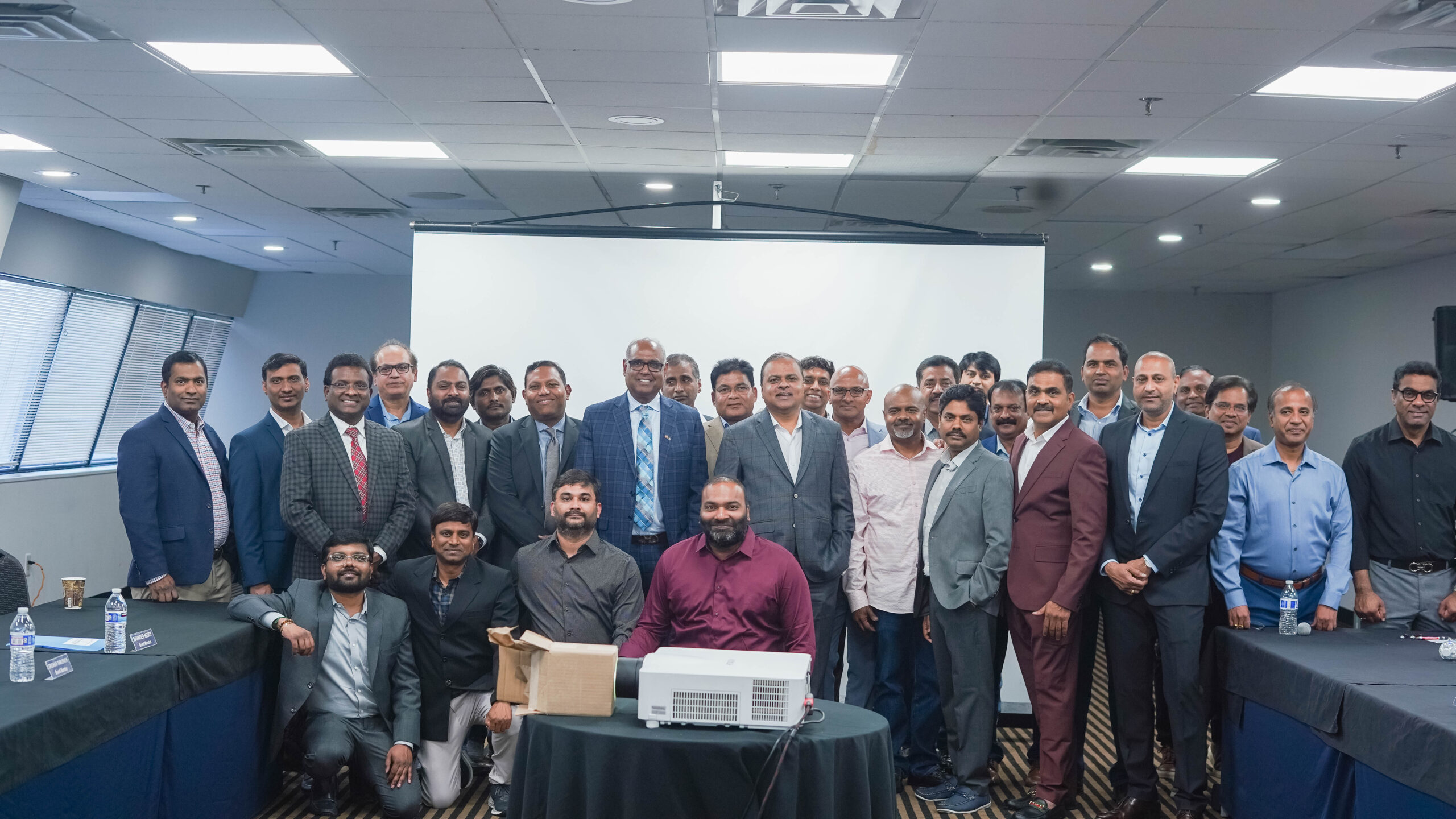 strengthening its service efforts, ATA is partnering on clean water projects to empower NRIs to support development initiatives in their hometowns and villages across Telugu-speaking states. In addition, A presentation was given on Krishivaas, an AI-based mobile app developed by Agribridge, which aims to assist rural farmers in improving agricultural productivity while enabling NRIs to contribute toward enhancing farmer livelihoods.
strengthening its service efforts, ATA is partnering on clean water projects to empower NRIs to support development initiatives in their hometowns and villages across Telugu-speaking states. In addition, A presentation was given on Krishivaas, an AI-based mobile app developed by Agribridge, which aims to assist rural farmers in improving agricultural productivity while enabling NRIs to contribute toward enhancing farmer livelihoods.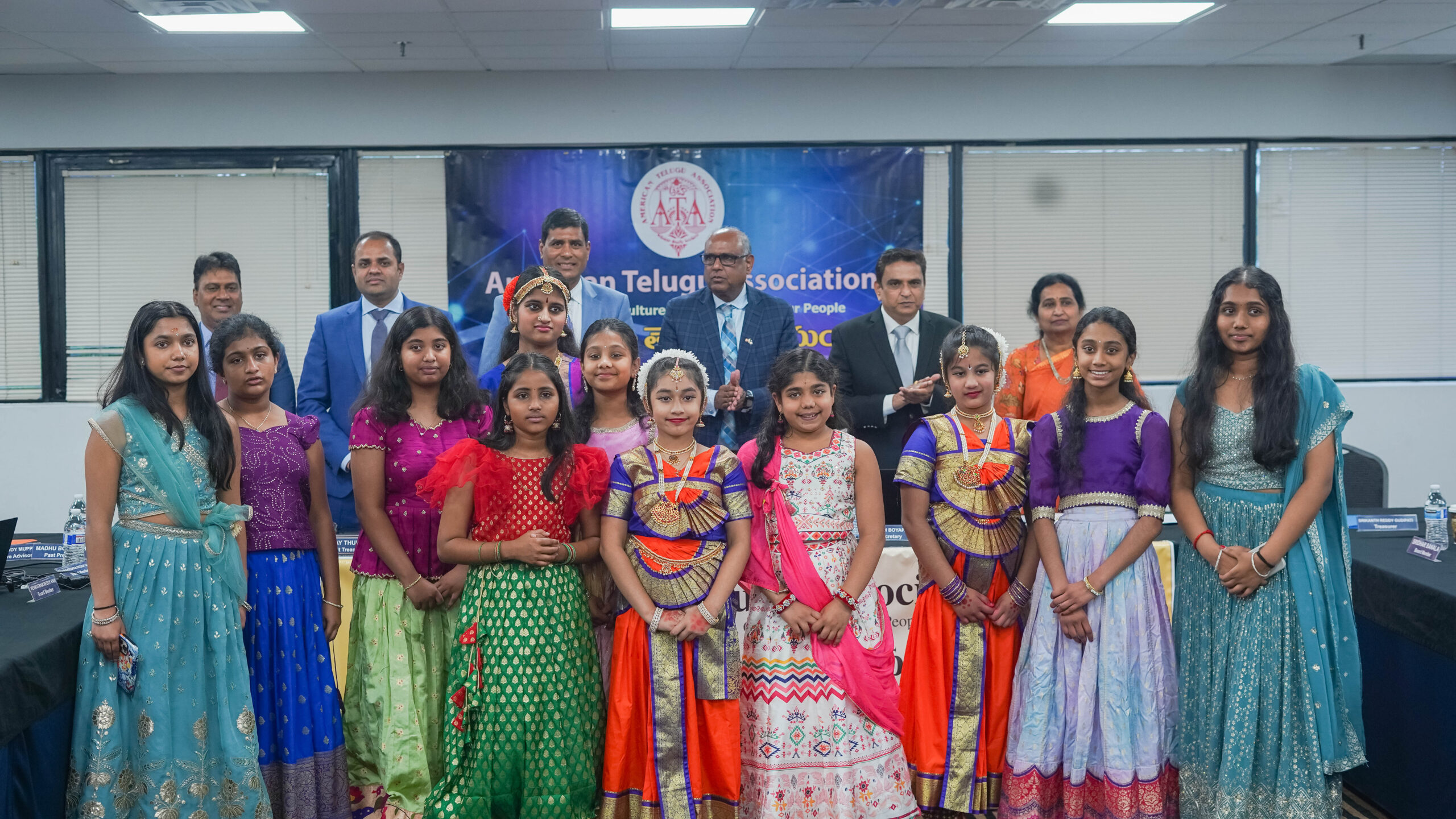 ideal choice for the convention. The event will take place under the leadership of ATA President Jayanth Challa. The ATA Board also reviewed and approved the budget for the upcoming national conference.
ideal choice for the convention. The event will take place under the leadership of ATA President Jayanth Challa. The ATA Board also reviewed and approved the budget for the upcoming national conference.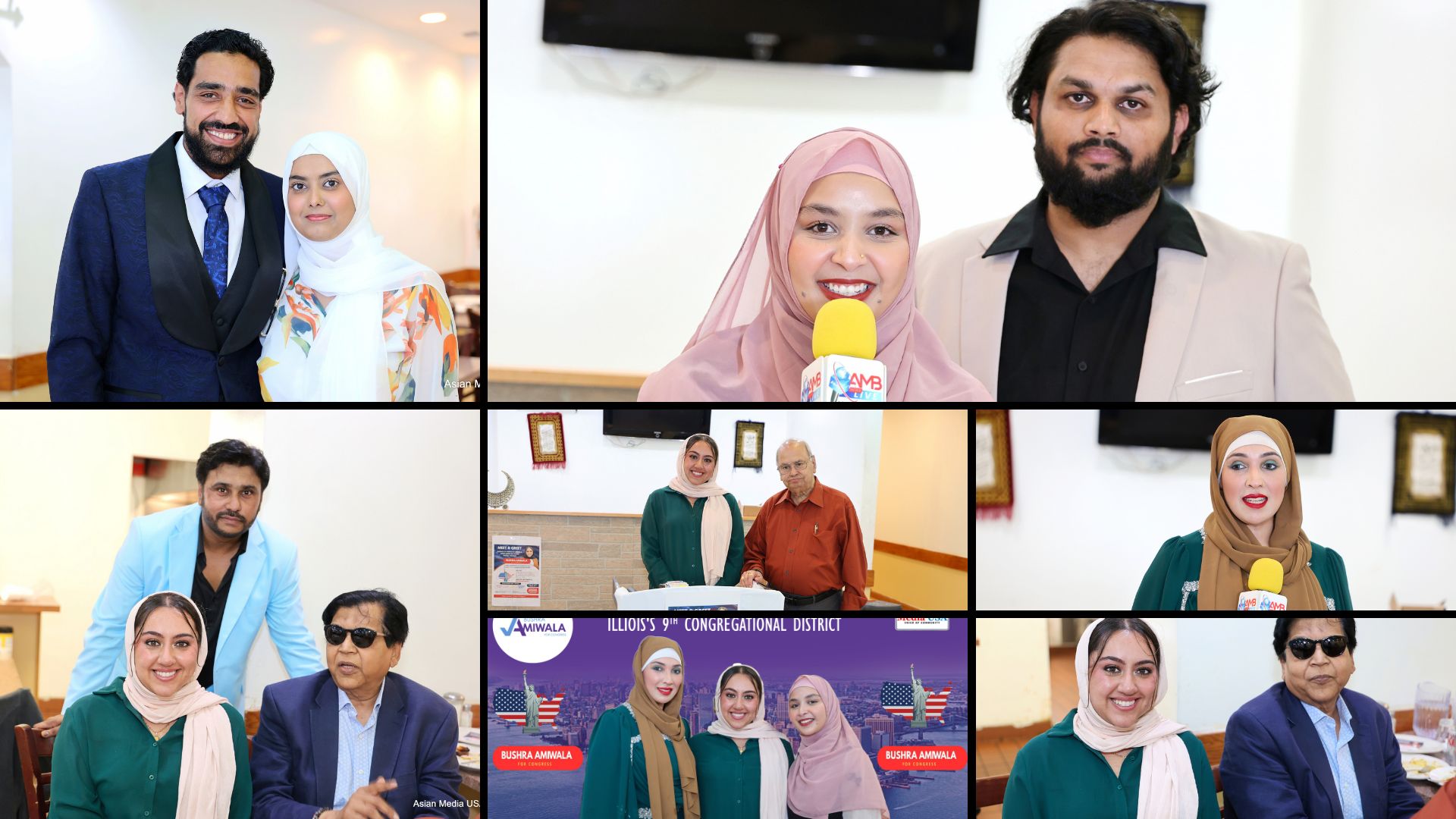
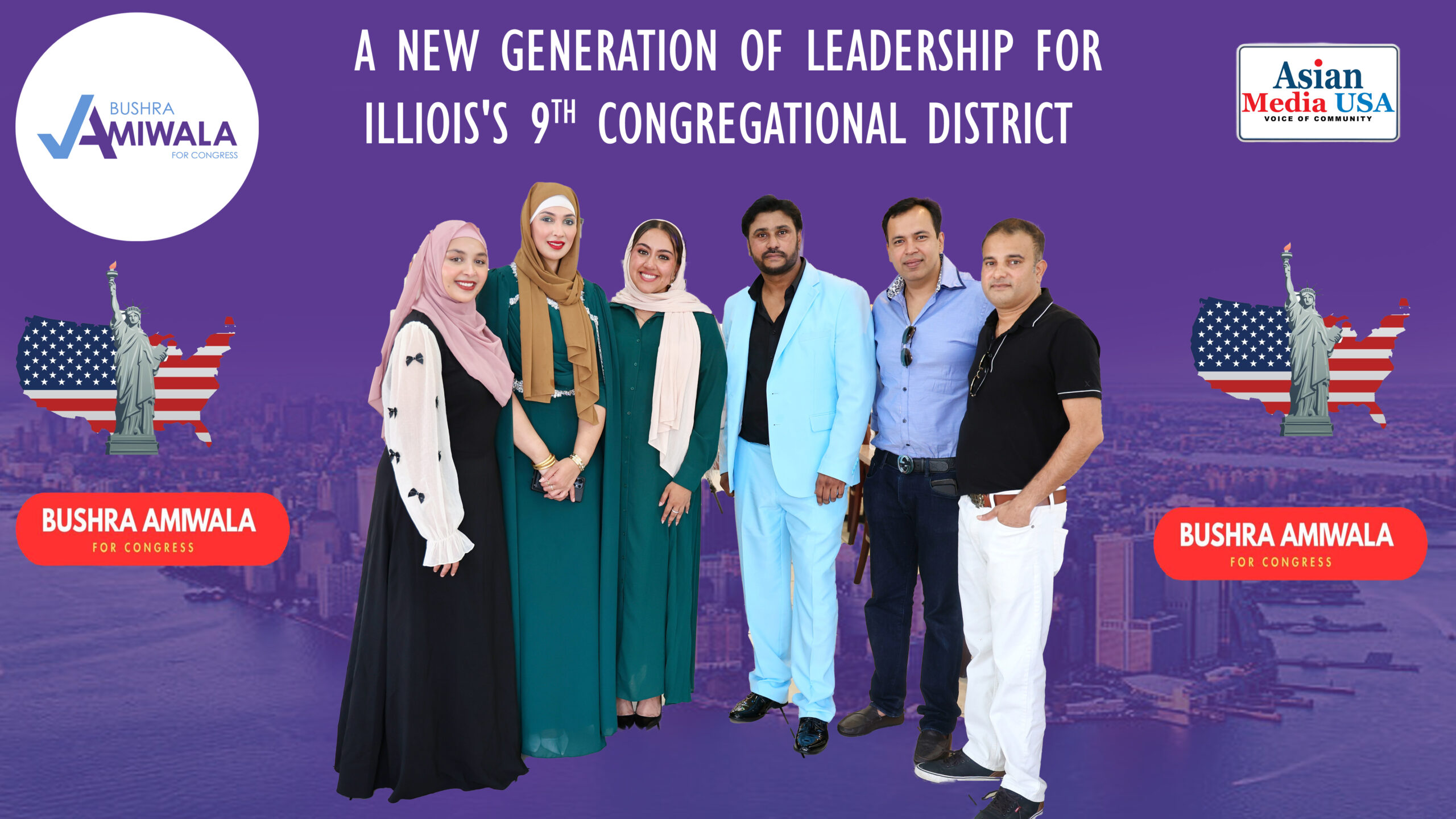 presenting Amiwala with a handcrafted poster titled “Bushra’s Brigade: Igniting Change in 2026.” The vibrant artwork, adorned with symbols of unity and progress, captured the spirit of the campaign and inspired attendees to rally behind Amiwala’s vision. “This poster represents our collective hope,” Feroz said. “Bushra’s leadership will light the way for a brighter future.”
presenting Amiwala with a handcrafted poster titled “Bushra’s Brigade: Igniting Change in 2026.” The vibrant artwork, adorned with symbols of unity and progress, captured the spirit of the campaign and inspired attendees to rally behind Amiwala’s vision. “This poster represents our collective hope,” Feroz said. “Bushra’s leadership will light the way for a brighter future.”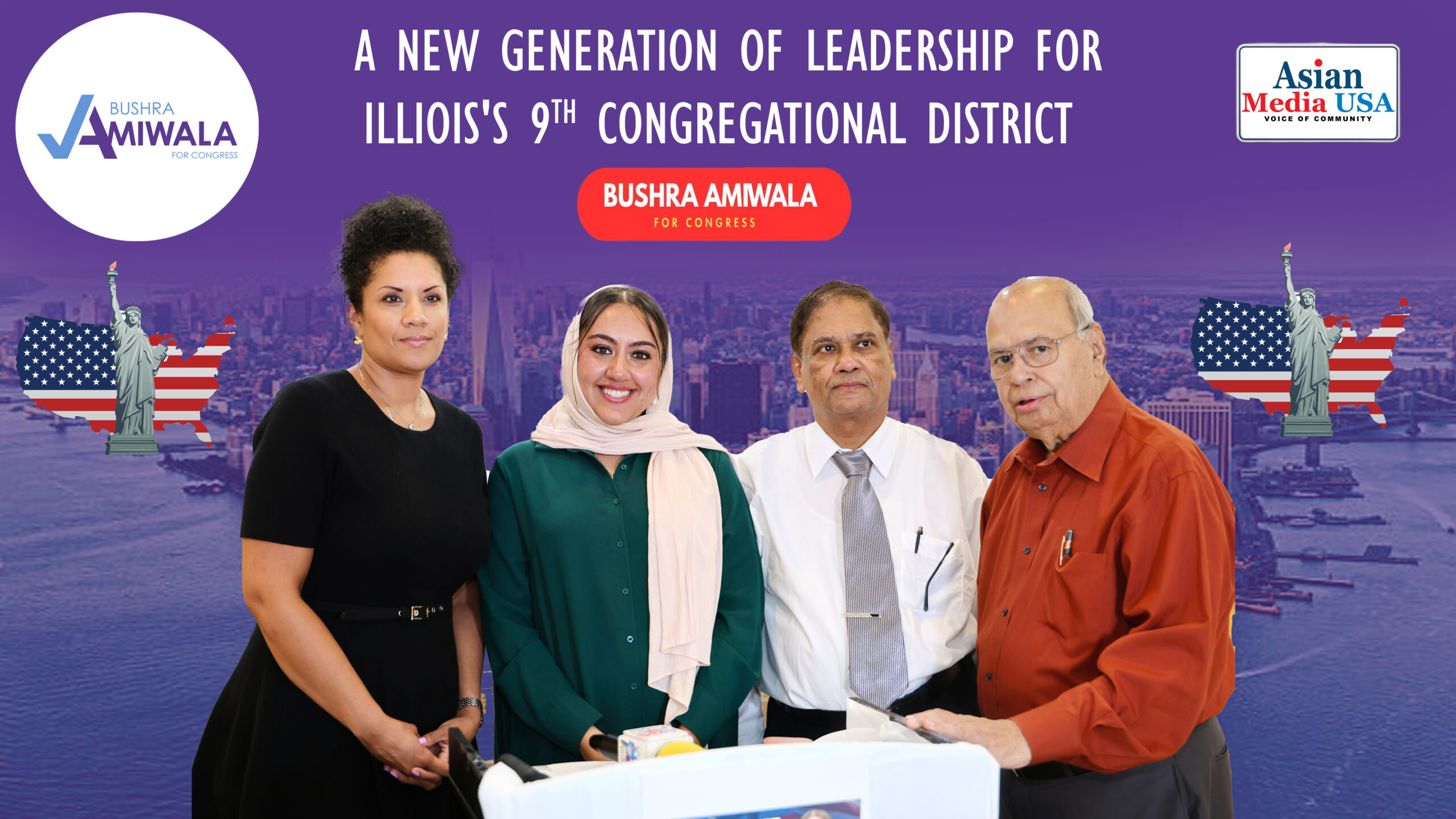 The event also highlighted Amiwala’s remarkable journey. A Google tech professional with an MBA from Kellogg-Northwestern, she has been recognized as Glamour Magazine’s College Woman of the Year, Seventeen Magazine’s Voice of the Year, and a Forbes 30 Under 30 honoree. Her story has been featured in documentaries on Hulu, Amazon, and PBS, cementing her as a role model for future leaders. As an International Peace Ambassador Award recipient from the United Nations, Amiwala’s global perspective informs her local mission.
The event also highlighted Amiwala’s remarkable journey. A Google tech professional with an MBA from Kellogg-Northwestern, she has been recognized as Glamour Magazine’s College Woman of the Year, Seventeen Magazine’s Voice of the Year, and a Forbes 30 Under 30 honoree. Her story has been featured in documentaries on Hulu, Amazon, and PBS, cementing her as a role model for future leaders. As an International Peace Ambassador Award recipient from the United Nations, Amiwala’s global perspective informs her local mission.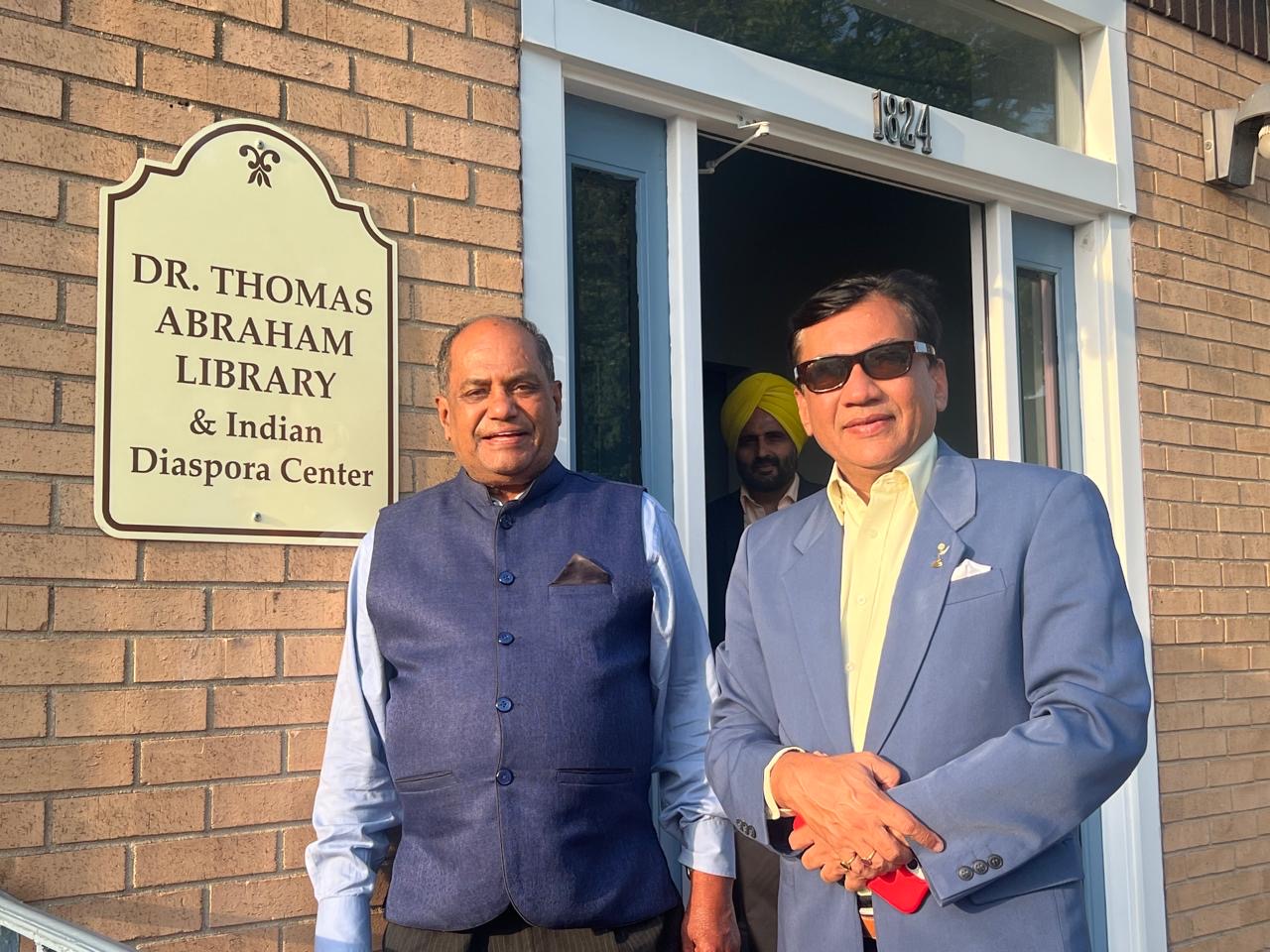
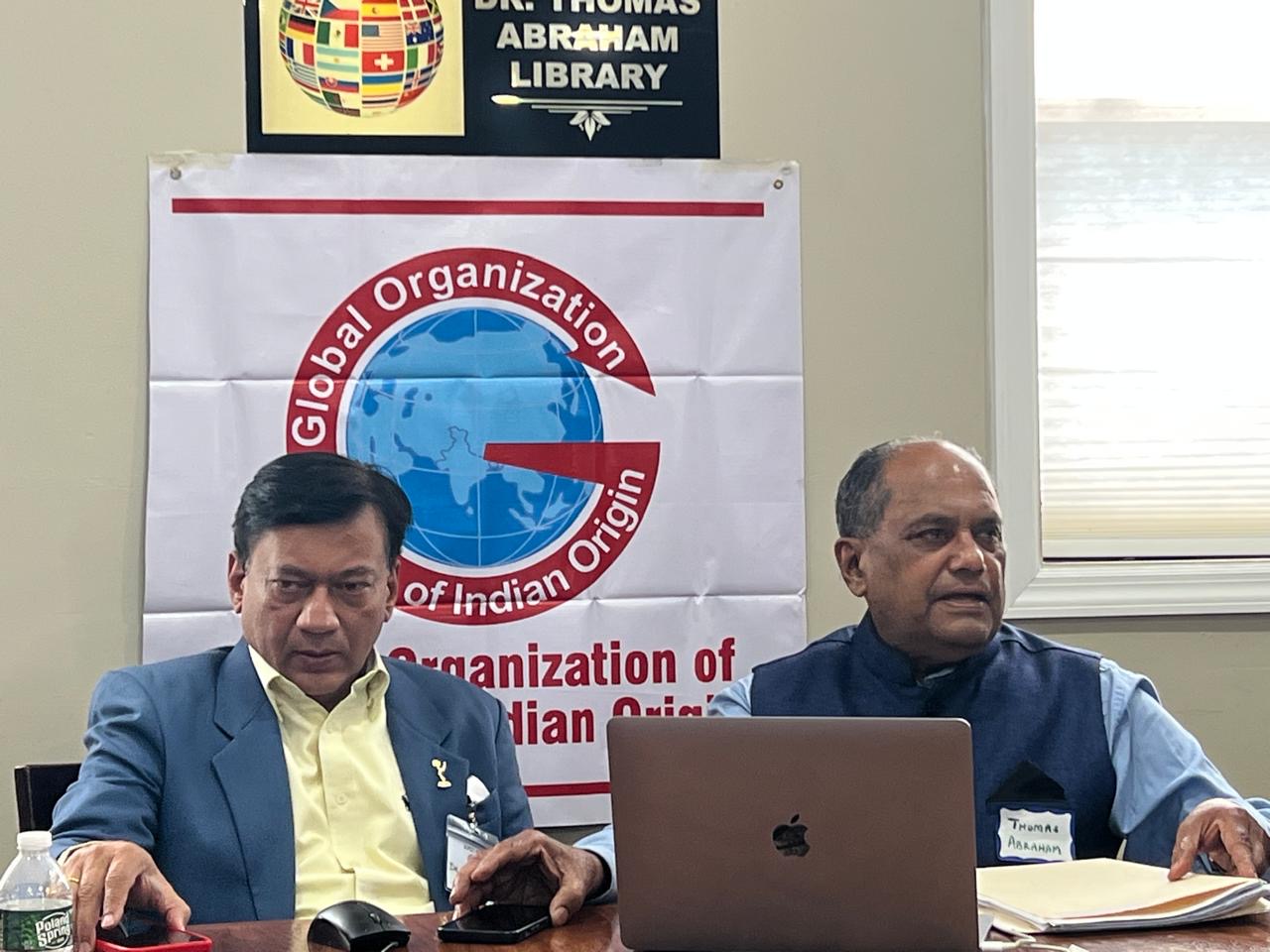
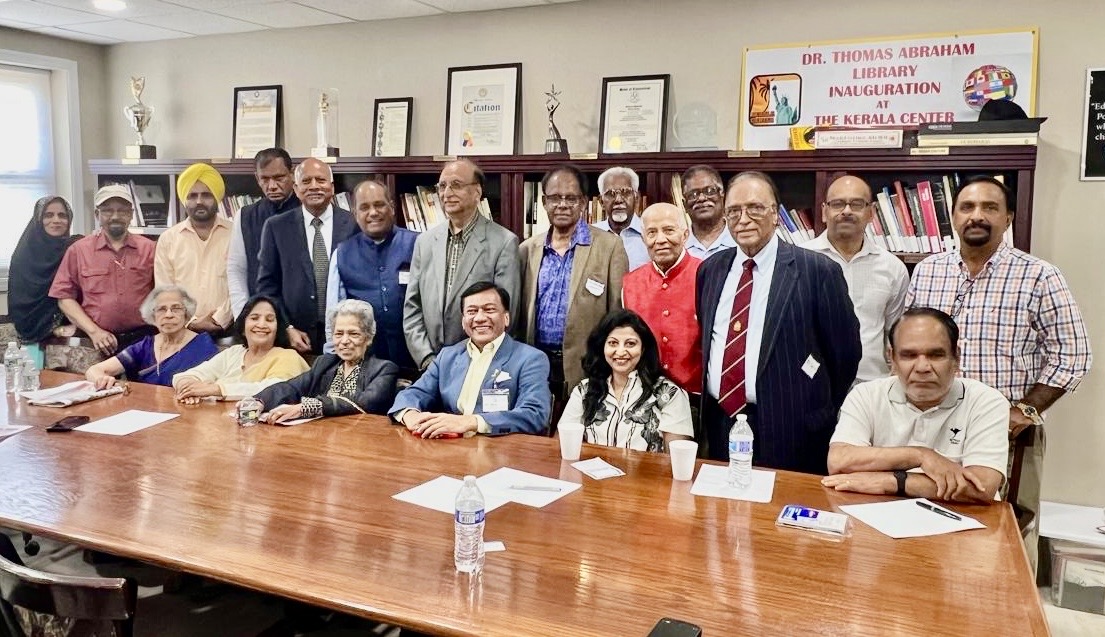
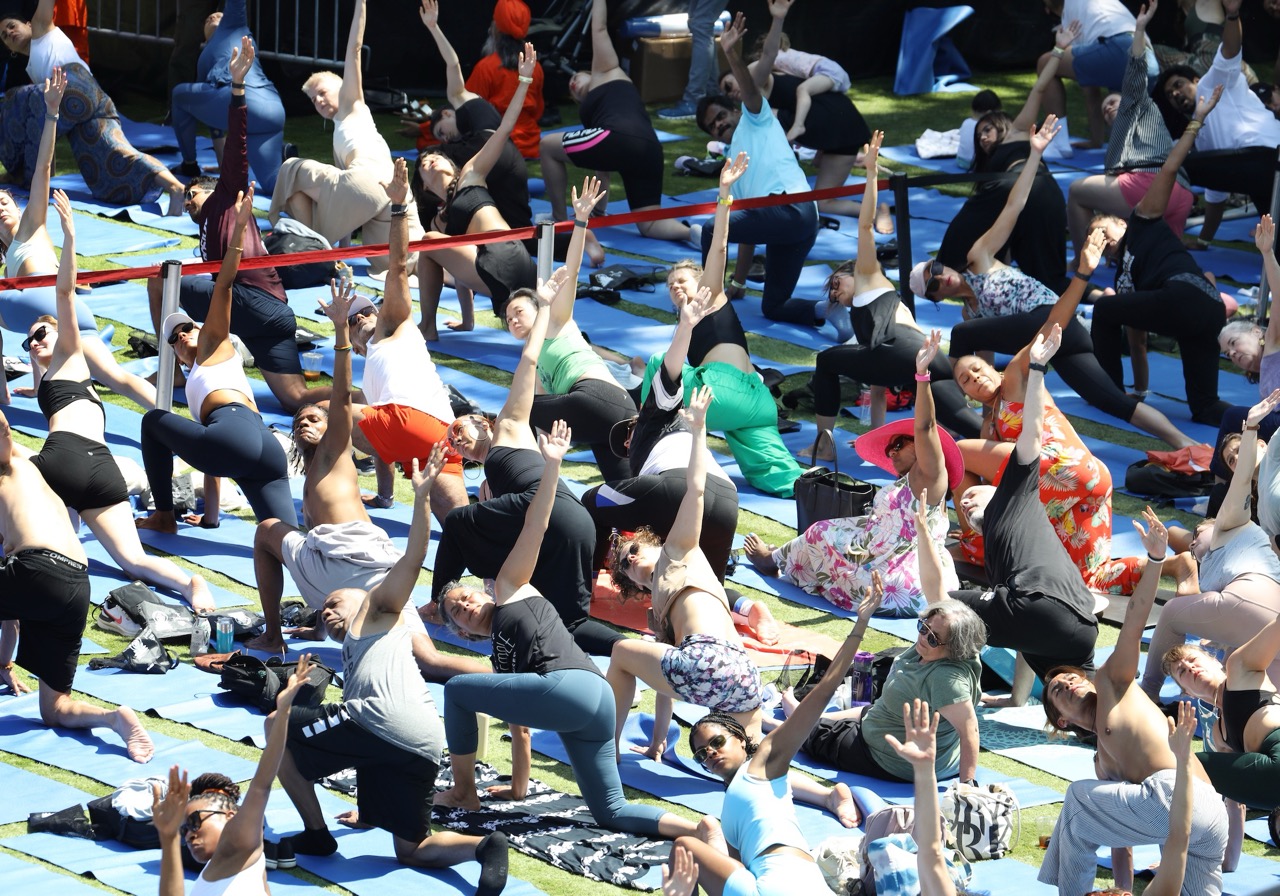
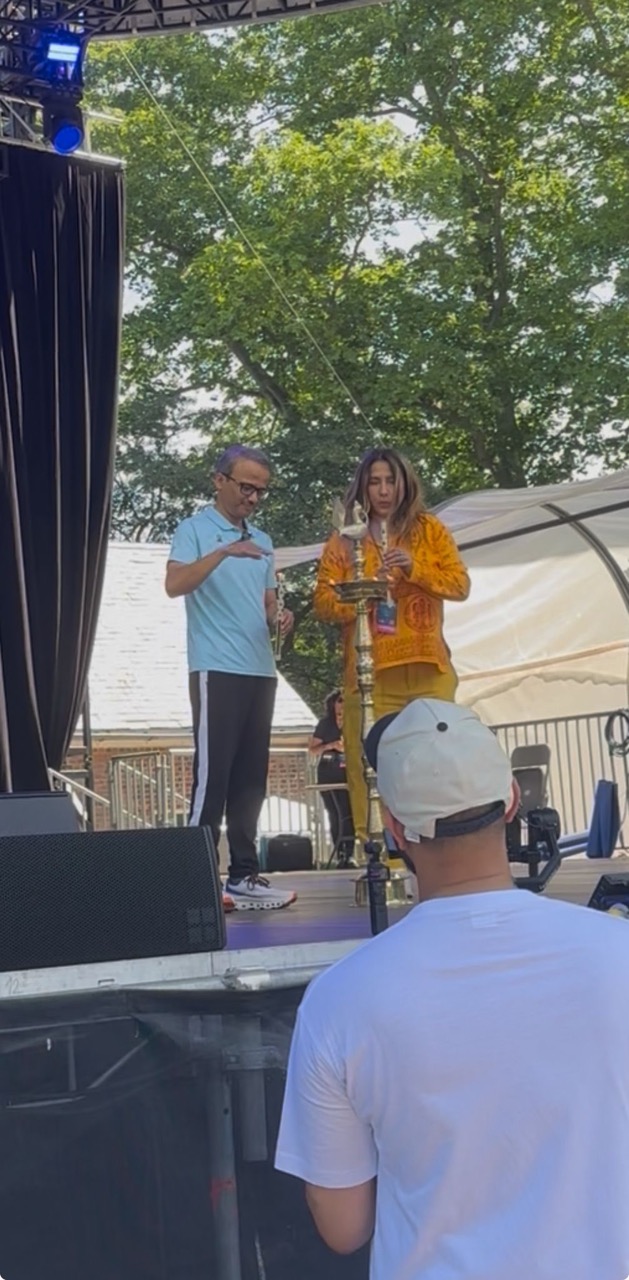
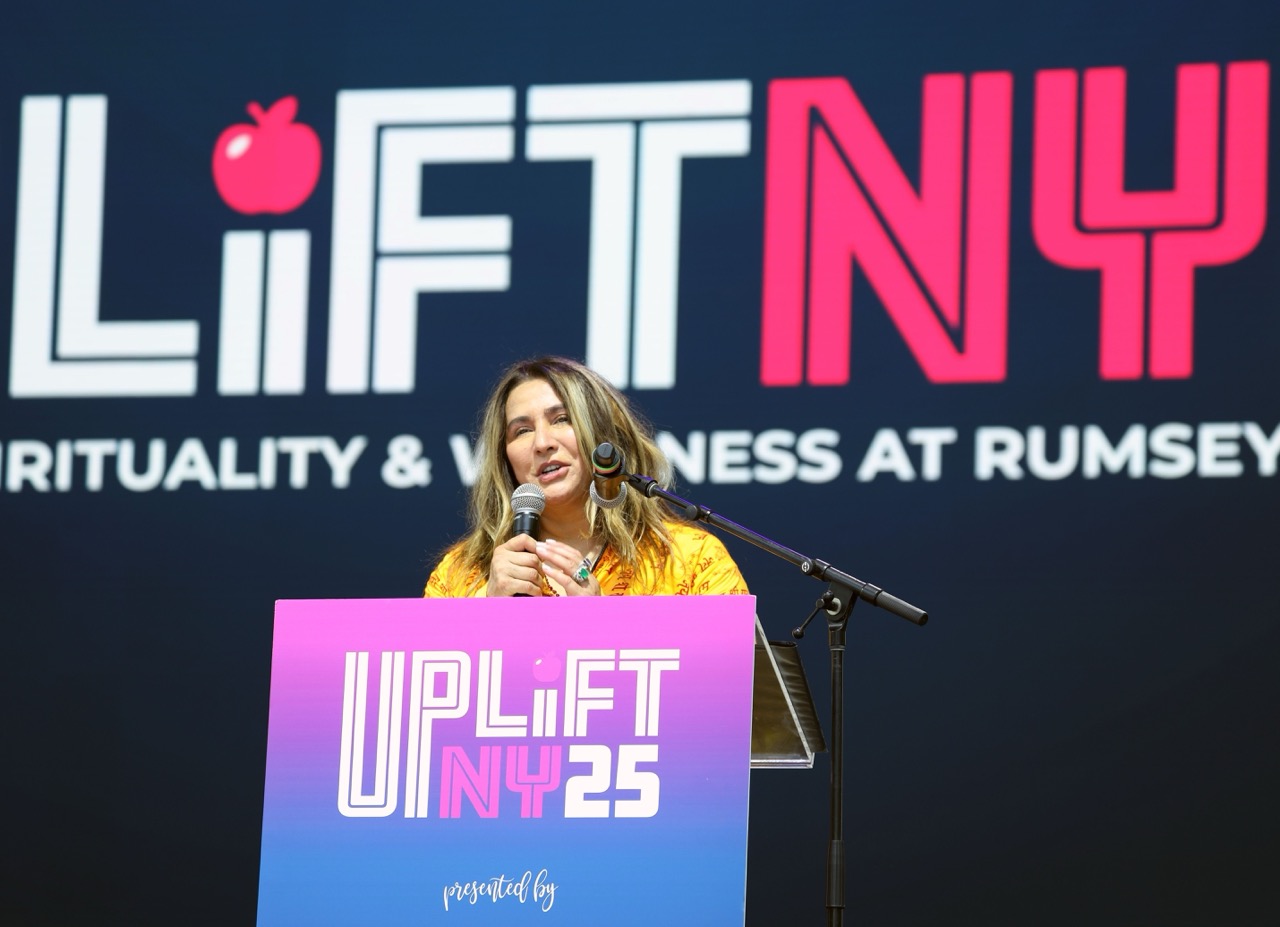 She continued community service throughout her education and early career, and in 2009, co-founded The Giving Back Foundation®, which she leads as CEO. The foundation supports global initiatives focused on education, mental wellness, and social empowerment, with 100% of proceeds from its products funding charitable programs.
She continued community service throughout her education and early career, and in 2009, co-founded The Giving Back Foundation®, which she leads as CEO. The foundation supports global initiatives focused on education, mental wellness, and social empowerment, with 100% of proceeds from its products funding charitable programs.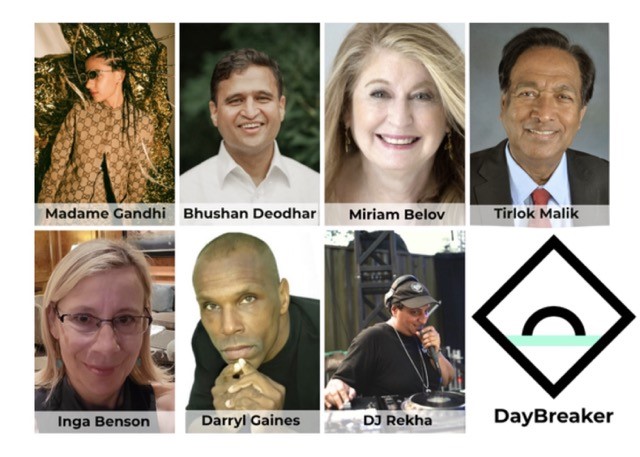
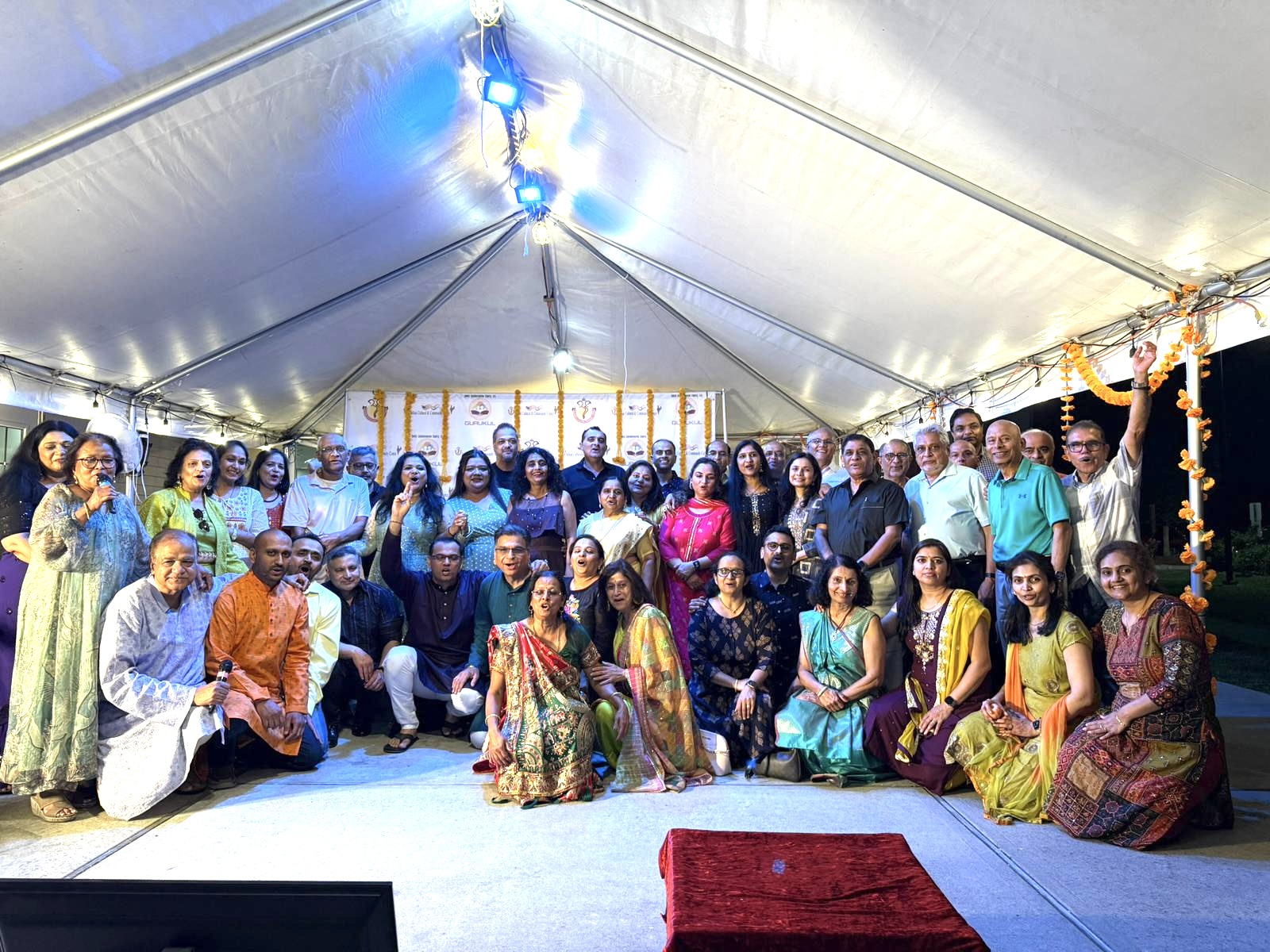
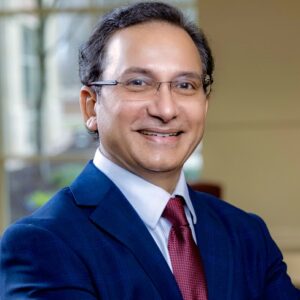 “It is my great pleasure to personally invite you all to the 43rd Annual Convention and Scientific Assembly of the American Association of Physicians of Indian Origin (AAPI), being held in vibrant Cincinnati, Ohio, from July 24th to 27th, 2025,” said Dr. Satheesh Kathula, President of AAPI, while inviting AAPI members to the prestigious event that will bring together nearly 1,000 delegates including Physicians, Academicians, Researchers and Medical students, along with guests to the Convention in Cincinnati from across the country for an enriching experience of networking, learning, and celebration.
“It is my great pleasure to personally invite you all to the 43rd Annual Convention and Scientific Assembly of the American Association of Physicians of Indian Origin (AAPI), being held in vibrant Cincinnati, Ohio, from July 24th to 27th, 2025,” said Dr. Satheesh Kathula, President of AAPI, while inviting AAPI members to the prestigious event that will bring together nearly 1,000 delegates including Physicians, Academicians, Researchers and Medical students, along with guests to the Convention in Cincinnati from across the country for an enriching experience of networking, learning, and celebration.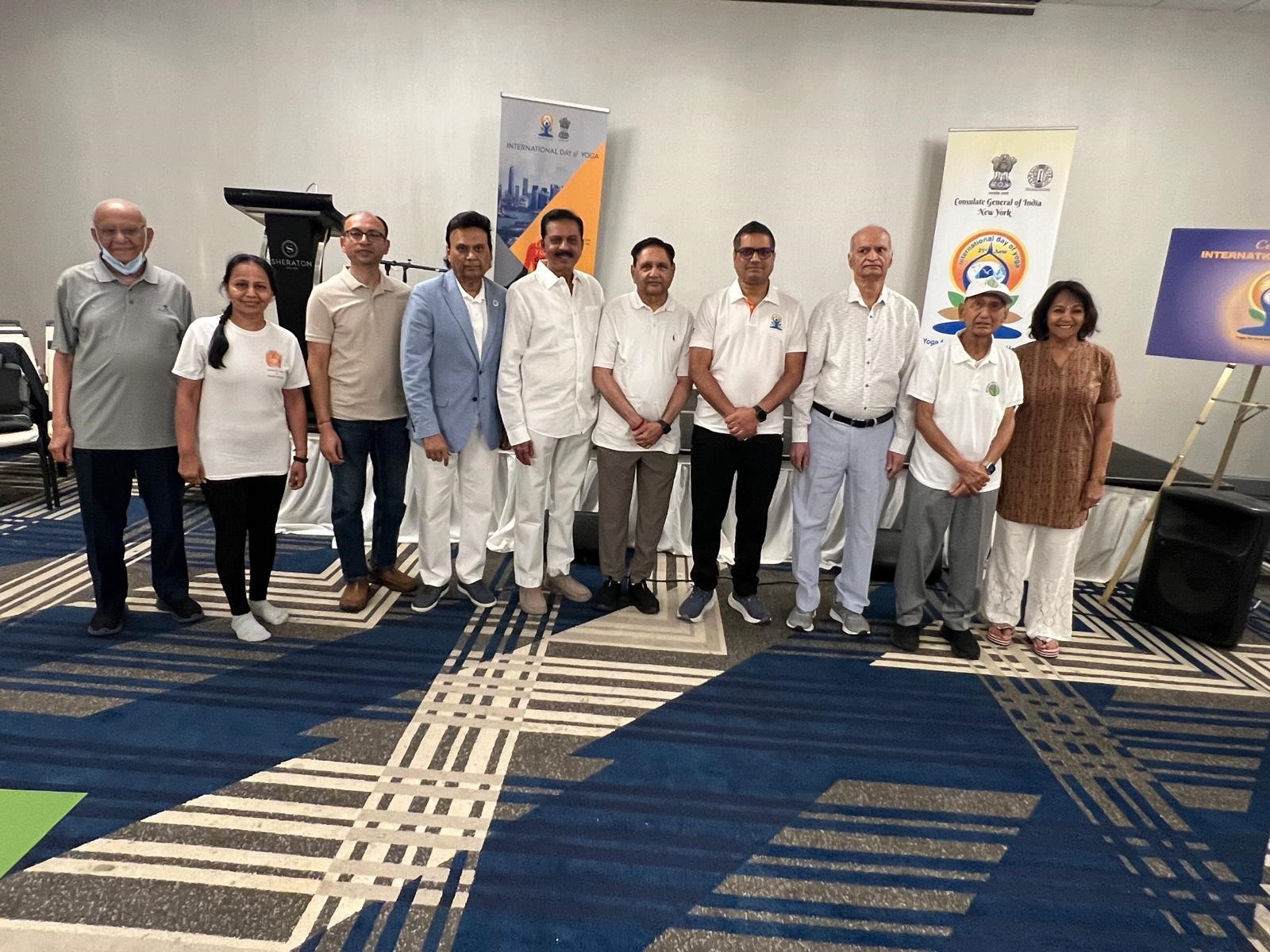 The Indo American Cultural Association of Edison, under the capable leadership of Nitin Vyas and in partnership with the Consulate of India in New York, held a vibrant International Yoga Day event on June 14 at the Sheraton Hotel in Edison, New Jersey. Despite facing heavy rainfall, the gathering saw an impressive turnout of over 300 yoga enthusiasts, supported by a number of major Indo American organizations. The participants experienced inspiring yoga sessions led by several distinguished instructors.
The Indo American Cultural Association of Edison, under the capable leadership of Nitin Vyas and in partnership with the Consulate of India in New York, held a vibrant International Yoga Day event on June 14 at the Sheraton Hotel in Edison, New Jersey. Despite facing heavy rainfall, the gathering saw an impressive turnout of over 300 yoga enthusiasts, supported by a number of major Indo American organizations. The participants experienced inspiring yoga sessions led by several distinguished instructors.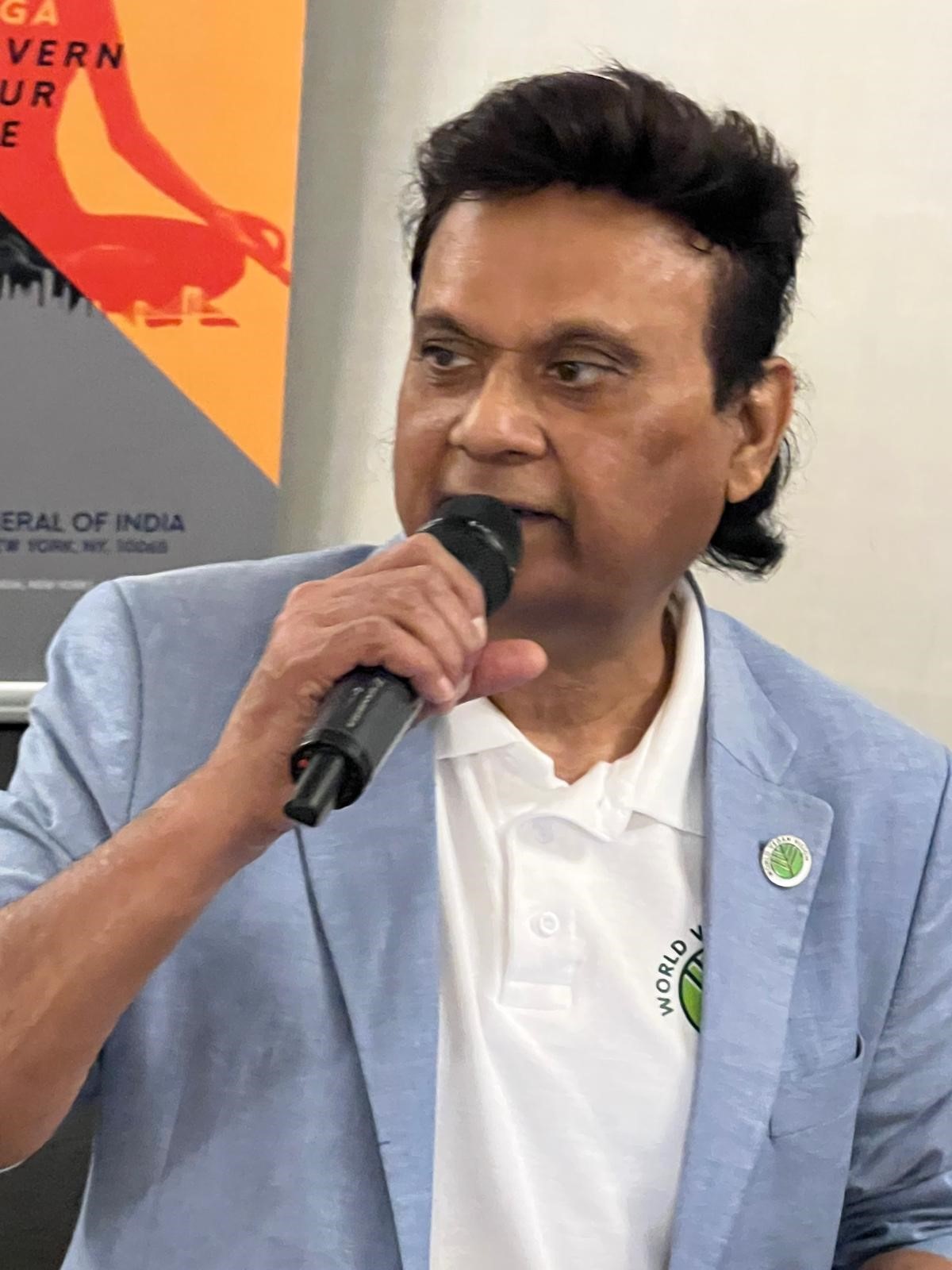 bringing a unique perspective and specialization to the celebration. Among the speakers and instructors was Guru Dileepji, who delivered an inspiring talk that encouraged attendees to embrace the spiritual side of yoga. Mark Becker contributed an insightful discussion that delved into the philosophical roots and benefits of yoga in daily life.
bringing a unique perspective and specialization to the celebration. Among the speakers and instructors was Guru Dileepji, who delivered an inspiring talk that encouraged attendees to embrace the spiritual side of yoga. Mark Becker contributed an insightful discussion that delved into the philosophical roots and benefits of yoga in daily life.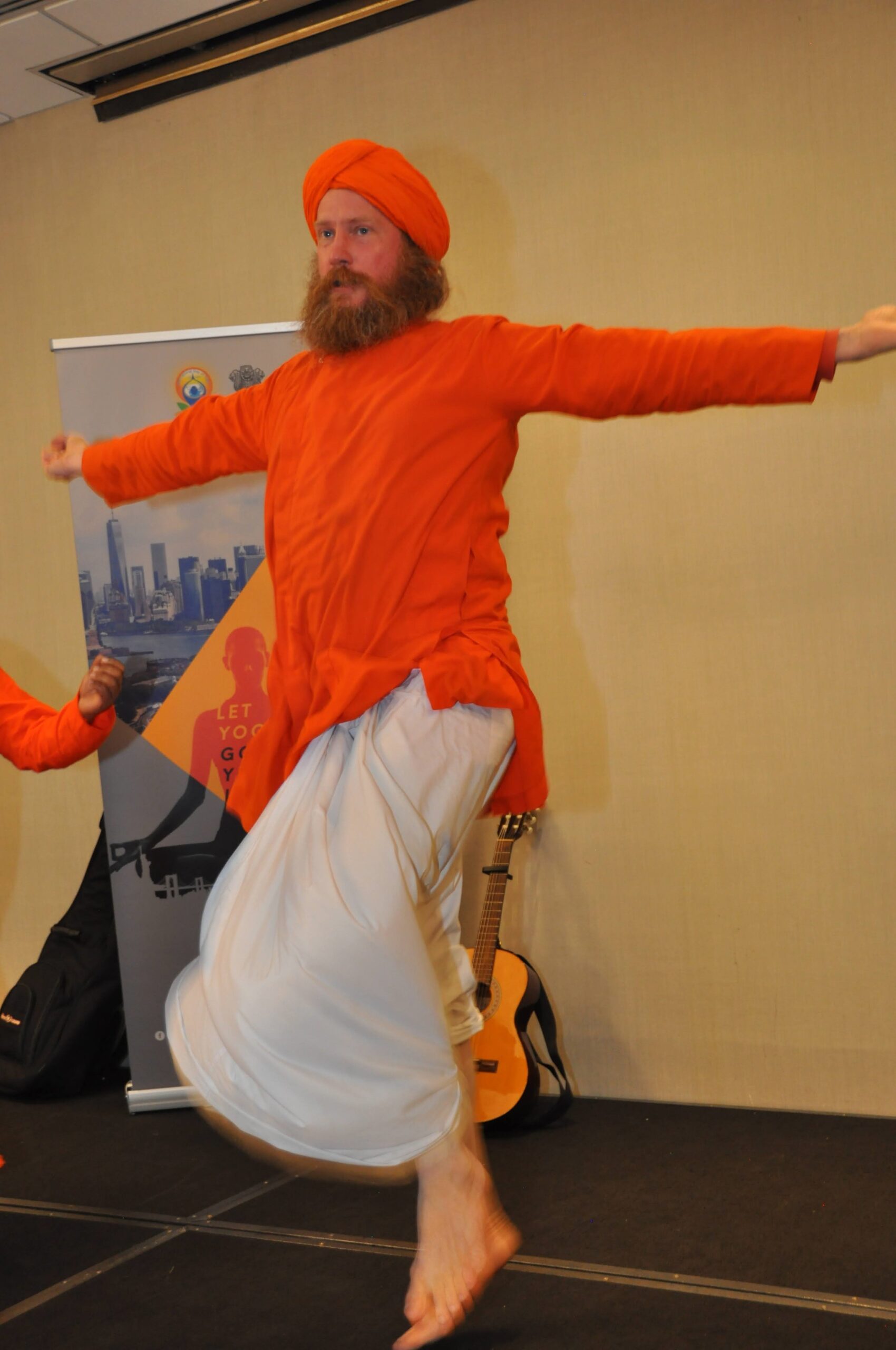 Adding to the wholesome theme of the day was a nutritious vegan lunch that was served to all participants. VIP attendees were additionally treated to a special breakfast, emphasizing the event’s broader commitment to health and wellness in every aspect. The carefully curated meals mirrored the yogic philosophy of balance and nourishment.
Adding to the wholesome theme of the day was a nutritious vegan lunch that was served to all participants. VIP attendees were additionally treated to a special breakfast, emphasizing the event’s broader commitment to health and wellness in every aspect. The carefully curated meals mirrored the yogic philosophy of balance and nourishment.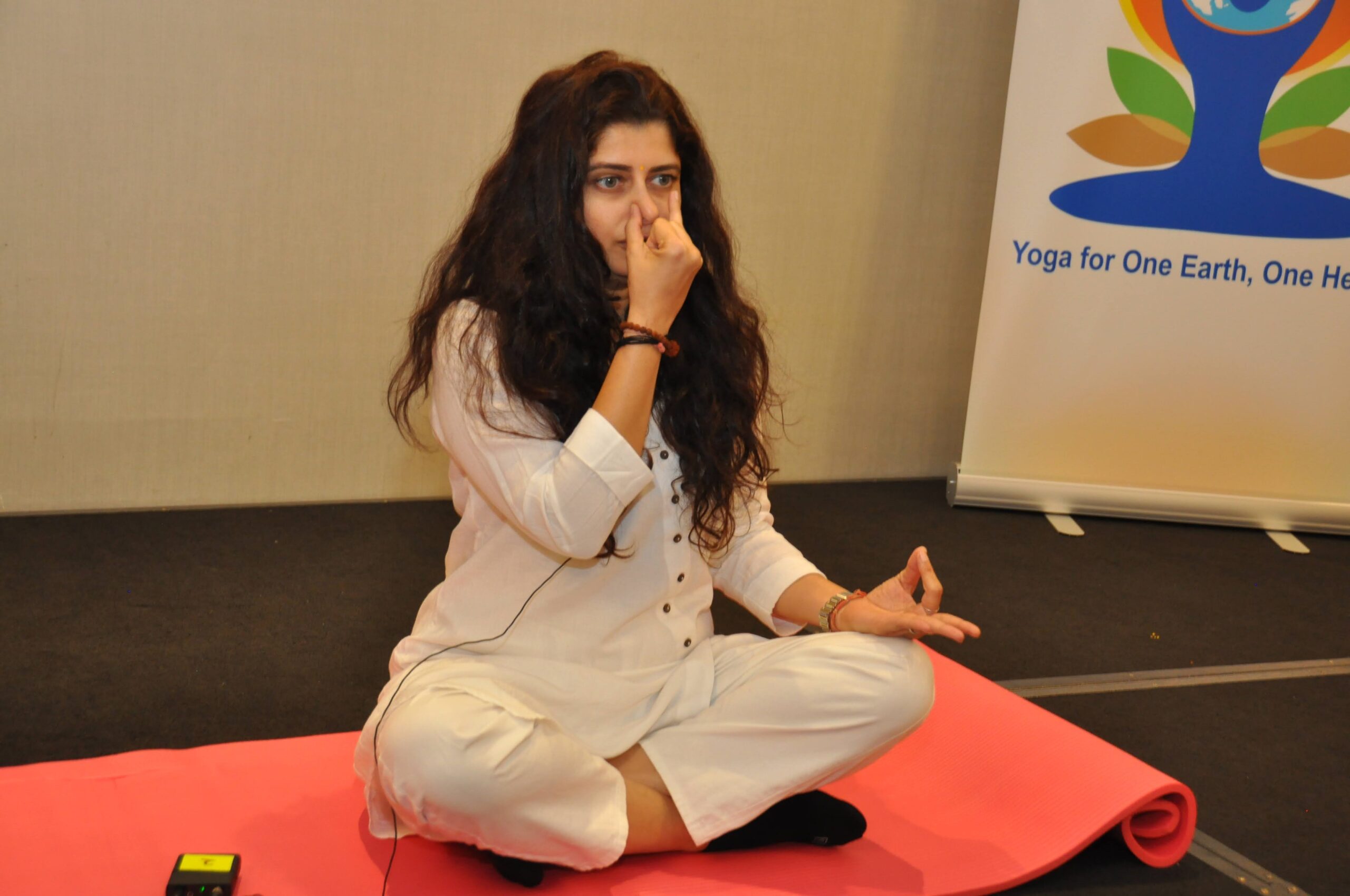 fostering unity and harmony within the community. As noted in the closing remarks, the gathering once again demonstrated how yoga serves as a bridge between cultures and beliefs. “This celebration once again showcased yoga’s ability to transcend cultural differences, fostering peace and unity,” remarked a representative of the Indo American Cultural Association.
fostering unity and harmony within the community. As noted in the closing remarks, the gathering once again demonstrated how yoga serves as a bridge between cultures and beliefs. “This celebration once again showcased yoga’s ability to transcend cultural differences, fostering peace and unity,” remarked a representative of the Indo American Cultural Association.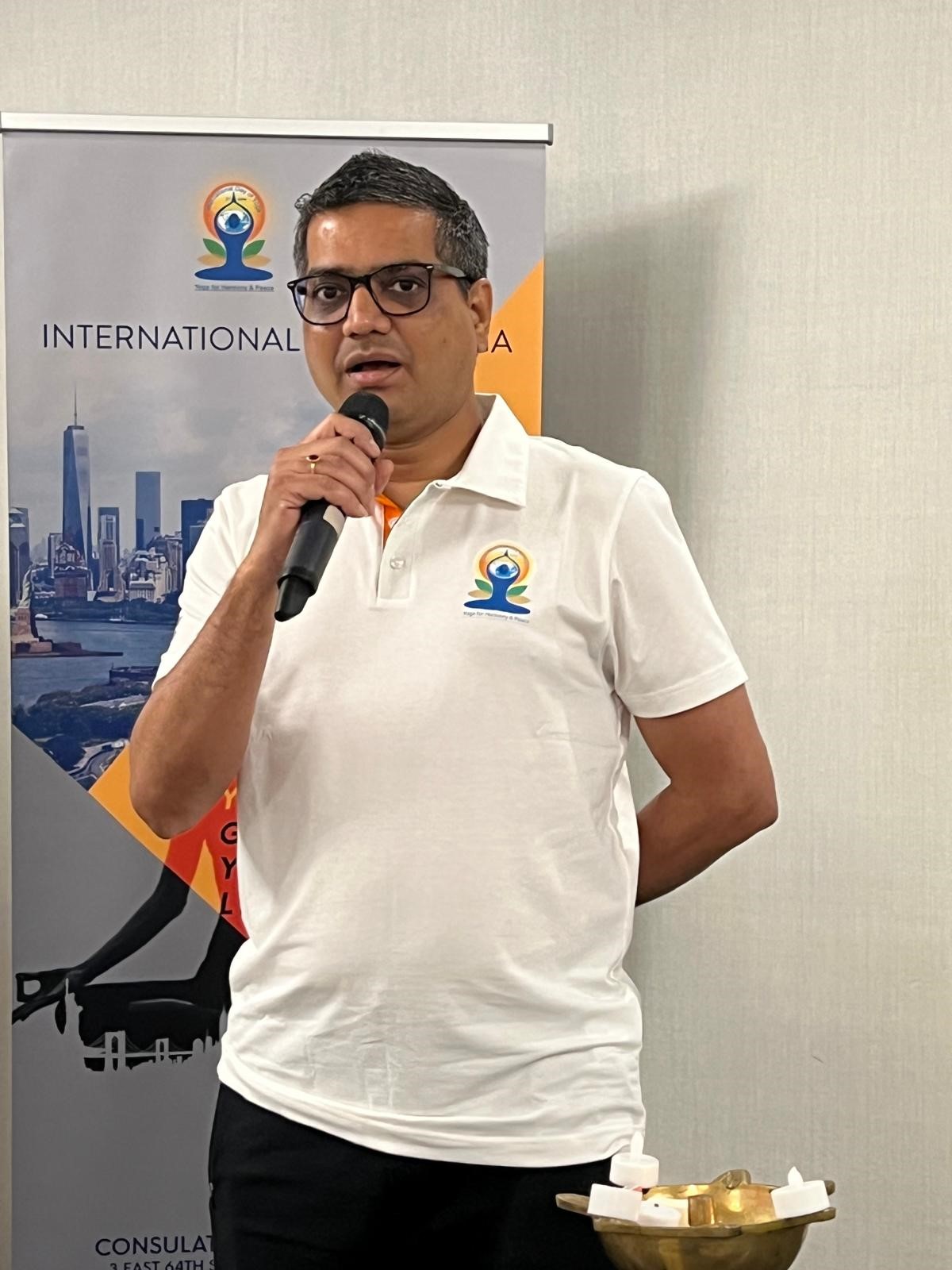 The morning began with a warm welcome and opening remarks delivered by the event coordinator, Nitin Vyas, who set the tone for the day’s spiritual and health-focused activities. The official launch of the event was marked by a ceremonial lighting of the lamp led by Deputy Consulate General Vishal Harsh. In his inaugural address, Harsh stressed yoga’s significance in promoting balanced well-being and a healthy lifestyle, highlighting its growing global influence. “Yoga offers a holistic path to health and well-being,” he stated, drawing attention to the practice’s enduring relevance in modern life.
The morning began with a warm welcome and opening remarks delivered by the event coordinator, Nitin Vyas, who set the tone for the day’s spiritual and health-focused activities. The official launch of the event was marked by a ceremonial lighting of the lamp led by Deputy Consulate General Vishal Harsh. In his inaugural address, Harsh stressed yoga’s significance in promoting balanced well-being and a healthy lifestyle, highlighting its growing global influence. “Yoga offers a holistic path to health and well-being,” he stated, drawing attention to the practice’s enduring relevance in modern life.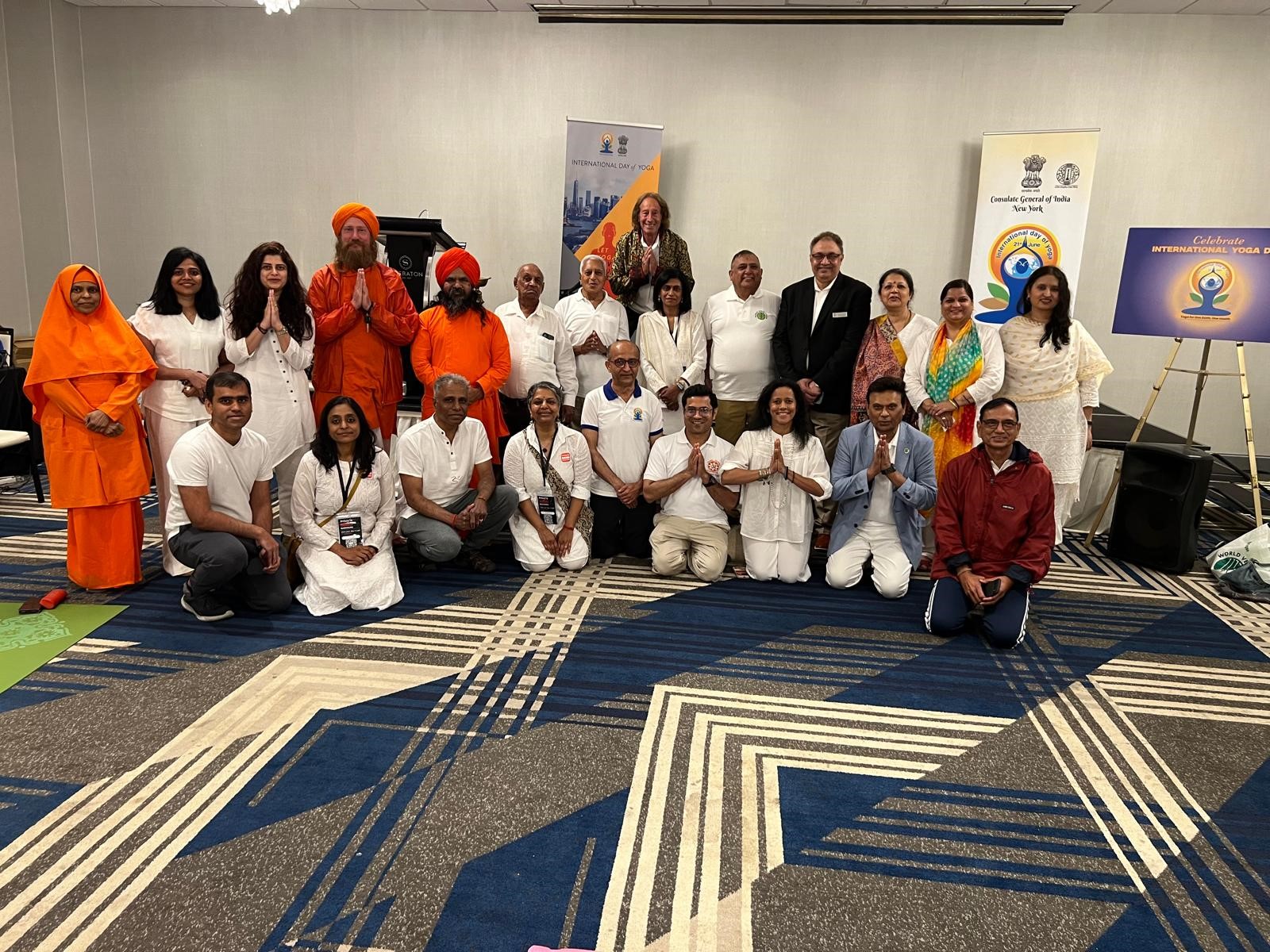 support mobility and joint health. Geeta Ji, from RadiantRays Yoga, offered a physically engaging session tailored for strength and flexibility enhancement.
support mobility and joint health. Geeta Ji, from RadiantRays Yoga, offered a physically engaging session tailored for strength and flexibility enhancement.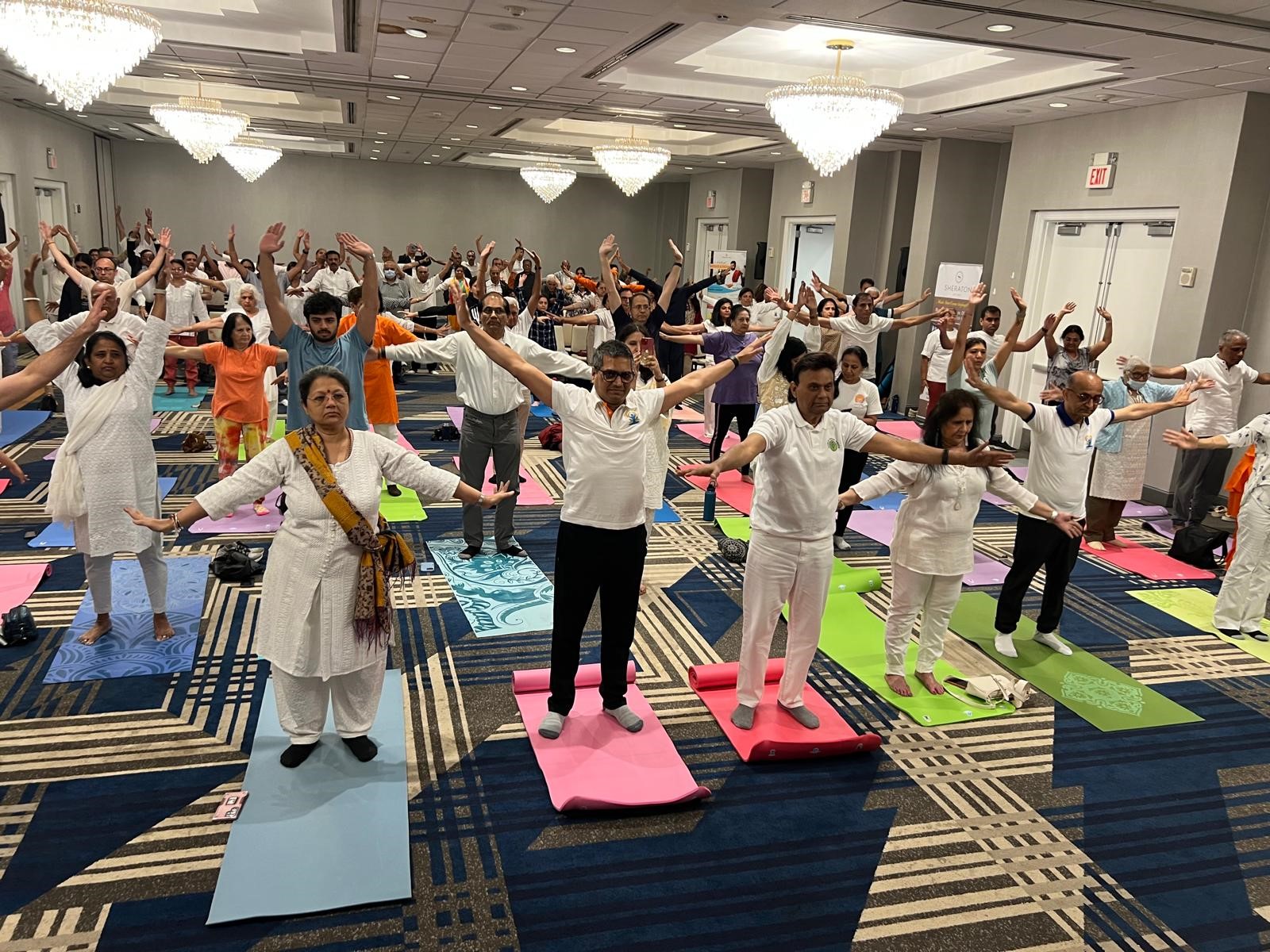 The success of the event was not only the result of well-curated sessions but also the dedicated efforts of numerous volunteers. Individuals such as Naresh Shah, Manish Parikh, Nina Vyas, Raju, and Haresh Bhai gave their time and energy selflessly. Support teams from both the Isha Foundation and Vihangam Yoga also contributed significantly to maintaining a seamless flow of the program. Their behind-the-scenes coordination helped manage logistics, participant engagement, and overall hospitality.
The success of the event was not only the result of well-curated sessions but also the dedicated efforts of numerous volunteers. Individuals such as Naresh Shah, Manish Parikh, Nina Vyas, Raju, and Haresh Bhai gave their time and energy selflessly. Support teams from both the Isha Foundation and Vihangam Yoga also contributed significantly to maintaining a seamless flow of the program. Their behind-the-scenes coordination helped manage logistics, participant engagement, and overall hospitality.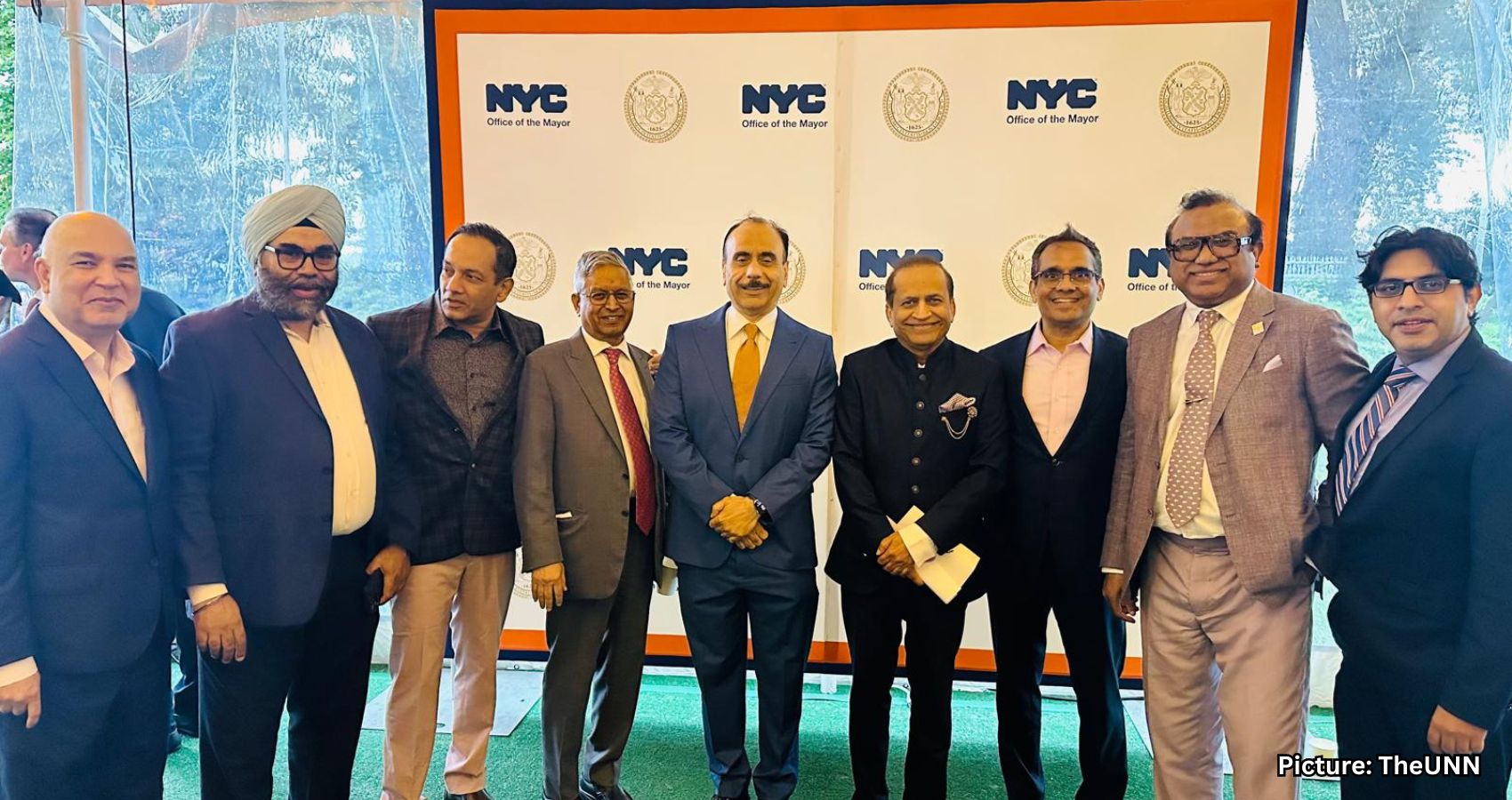 Hosted by Eric Adams in partnership with Dr. Raj Bhayani, president of the Federation of Indian Physicians Association, the event was attended by over 150 prominent community, business, and healthcare leaders from across the New York tri-state region, representing Indian, Bangladeshi, Afghanistan, Jewish, Spanish, as well as Americans and Caribbean communities.
Hosted by Eric Adams in partnership with Dr. Raj Bhayani, president of the Federation of Indian Physicians Association, the event was attended by over 150 prominent community, business, and healthcare leaders from across the New York tri-state region, representing Indian, Bangladeshi, Afghanistan, Jewish, Spanish, as well as Americans and Caribbean communities.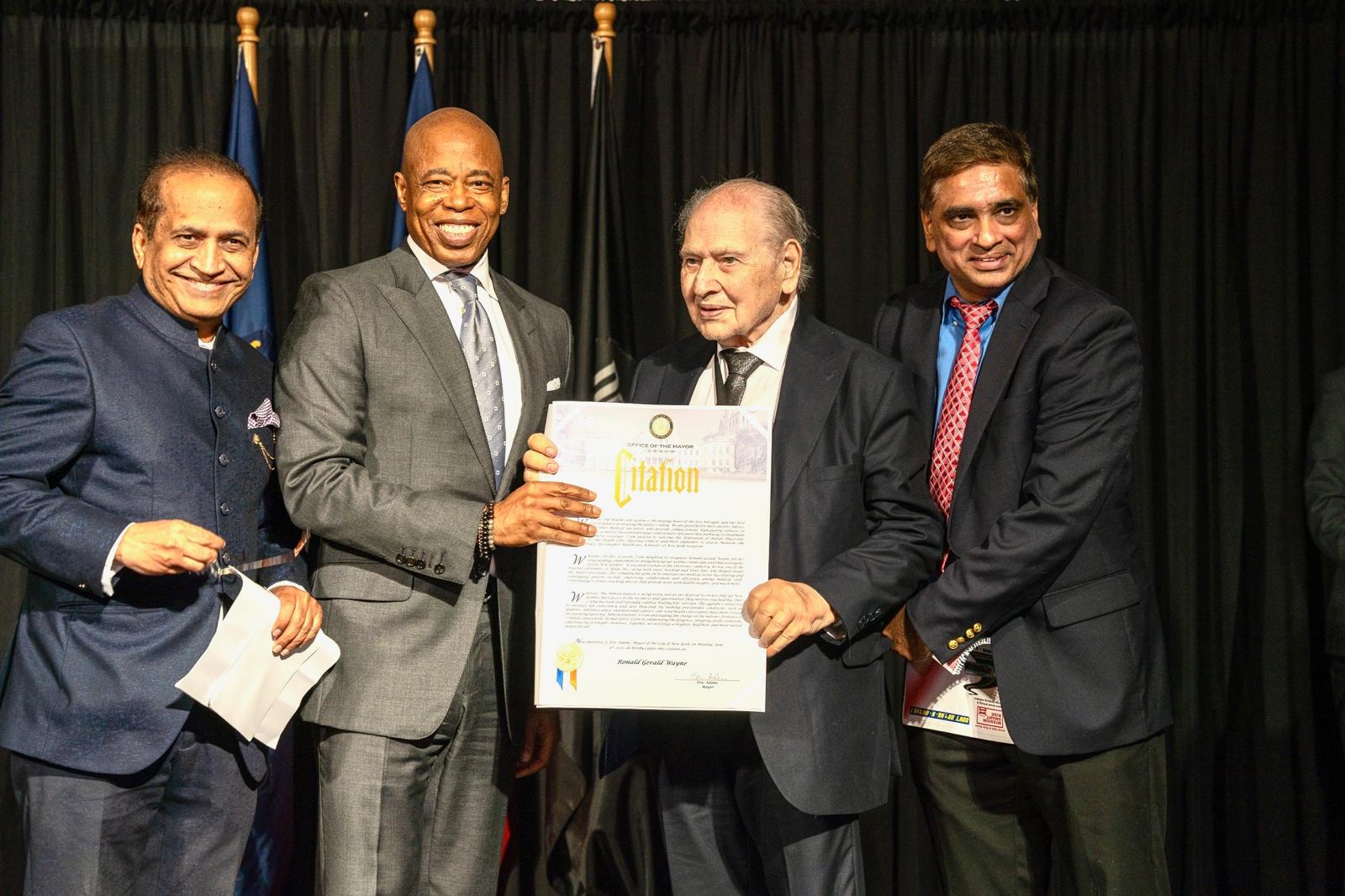 healthcare professionals. “You continue to do your job. Nothing can signify that more than COVID, when I’ve witnessed the number of healthcare professionals who were in our hospitals, our healthcare centers, who were doing the testing, who were carrying out all the functions, and still had to worry about not infecting their family members at home. They still got up every day and did their job.”
healthcare professionals. “You continue to do your job. Nothing can signify that more than COVID, when I’ve witnessed the number of healthcare professionals who were in our hospitals, our healthcare centers, who were doing the testing, who were carrying out all the functions, and still had to worry about not infecting their family members at home. They still got up every day and did their job.”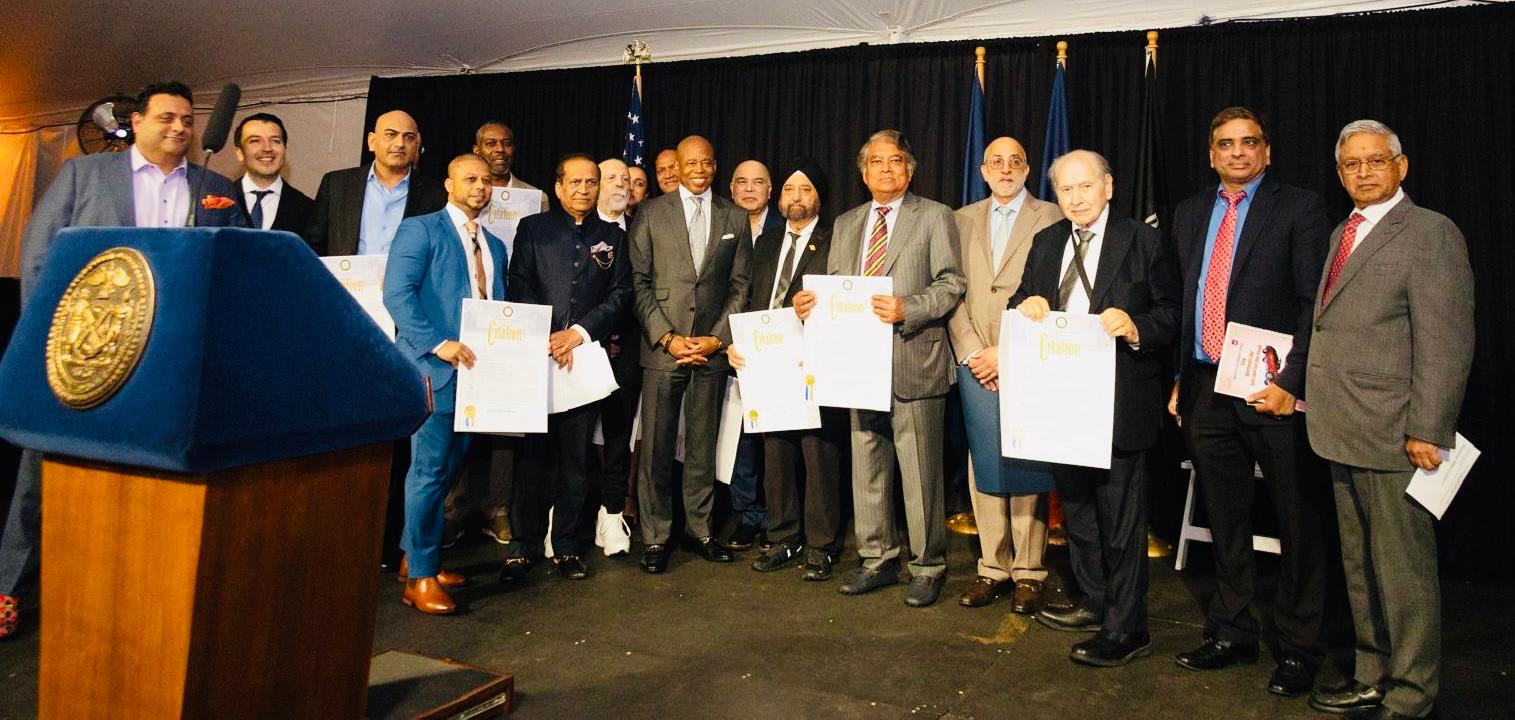 Other prominent leaders who were honored at the ceremony included; Chintu Patel, founder and CEO of Amneal Pharmaceutical; Al Mason Fintech, entrepreneur; Dr. Shamim Sharma, eminent Cardiologist; Dr. Deepak Nandi, Neuropsychiatrist and entrepreneur; Dr. Atul Kukar, renowned Cardiologist; Gary Schlesinger, Healthcare Community Leader; Ronald Blount Jr, Bronx County Executive; Gary Sikka, President, American Punjab Society; Kanan Patel, founder and CEO of Kayura pharma health and beauty products; Bhavik Patel, Healthcare executive; Ahmad Masoud, IRCM founder; Jabur Chowdhury, young healthcare entrepreneur; and Dr Eyad Hijazin, a prominent physician from the region.
Other prominent leaders who were honored at the ceremony included; Chintu Patel, founder and CEO of Amneal Pharmaceutical; Al Mason Fintech, entrepreneur; Dr. Shamim Sharma, eminent Cardiologist; Dr. Deepak Nandi, Neuropsychiatrist and entrepreneur; Dr. Atul Kukar, renowned Cardiologist; Gary Schlesinger, Healthcare Community Leader; Ronald Blount Jr, Bronx County Executive; Gary Sikka, President, American Punjab Society; Kanan Patel, founder and CEO of Kayura pharma health and beauty products; Bhavik Patel, Healthcare executive; Ahmad Masoud, IRCM founder; Jabur Chowdhury, young healthcare entrepreneur; and Dr Eyad Hijazin, a prominent physician from the region. The International Day of Yoga is a day of recognition for yoga, celebrated annually around the world on 21 June, following its adoption by the
The International Day of Yoga is a day of recognition for yoga, celebrated annually around the world on 21 June, following its adoption by the 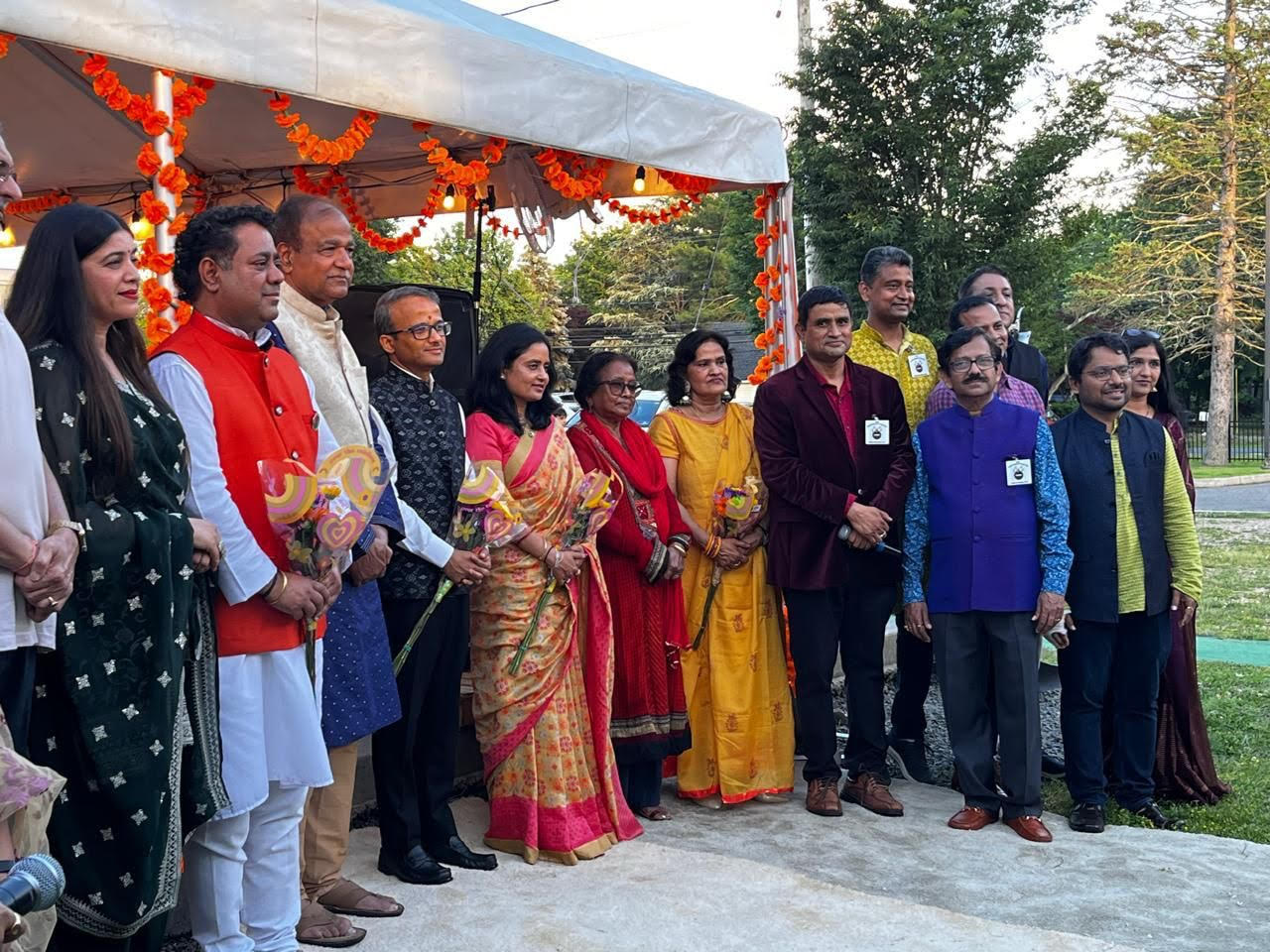 Toms River, NJ – June 7, 2025 – The DHUN Musical Group, USA, returned with its much-anticipated annual fundraising concert in support of the Siddhivinayak Temple, delivering an enchanting musical evening that captivated a packed audience of over 400 community members.
Toms River, NJ – June 7, 2025 – The DHUN Musical Group, USA, returned with its much-anticipated annual fundraising concert in support of the Siddhivinayak Temple, delivering an enchanting musical evening that captivated a packed audience of over 400 community members.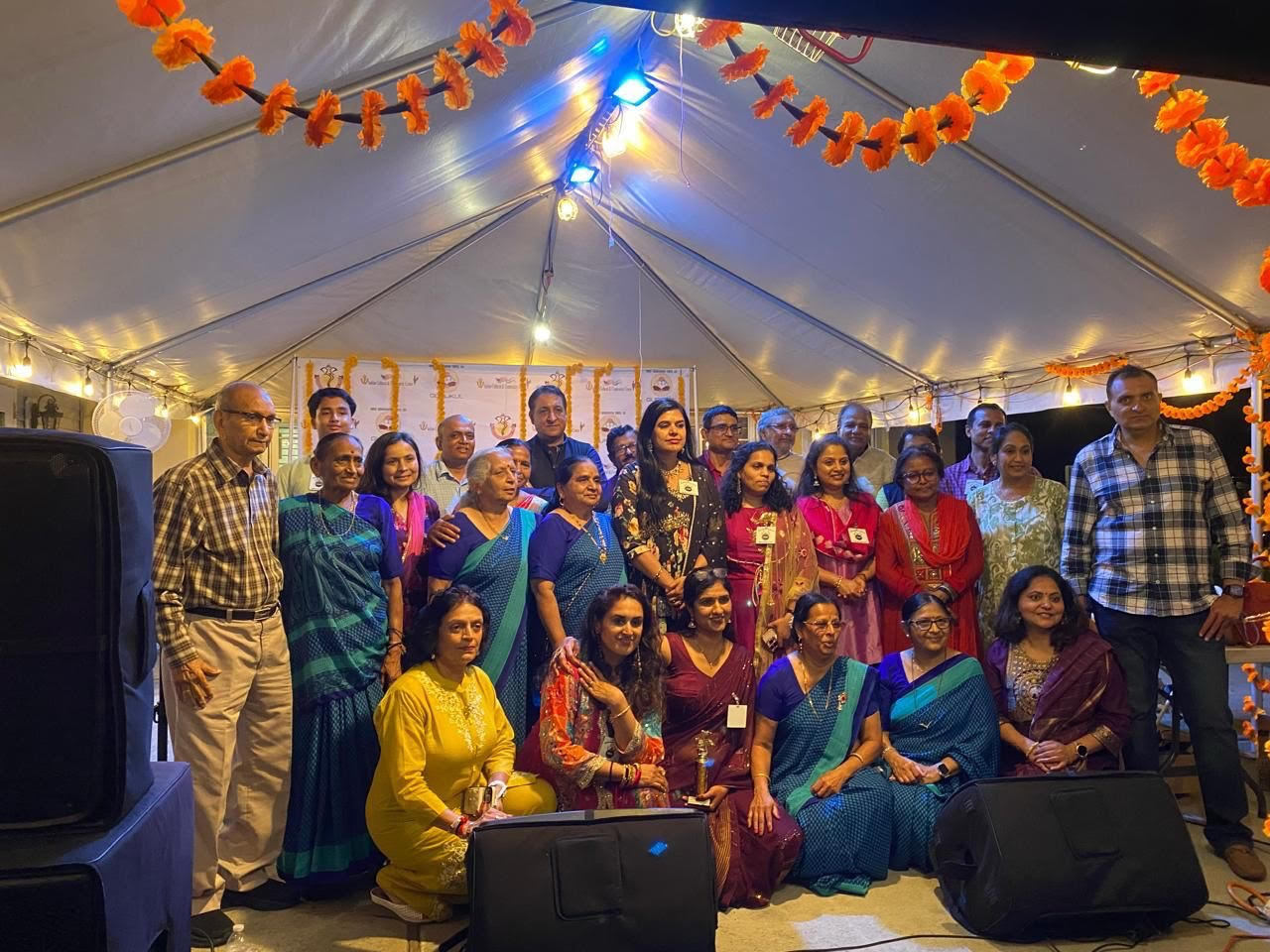 discovering, nurturing, and promoting musical talent, especially lesser-known voices, while supporting charitable causes. Their events not only entertain but uplift, consistently raising funds and awareness for local initiatives.
discovering, nurturing, and promoting musical talent, especially lesser-known voices, while supporting charitable causes. Their events not only entertain but uplift, consistently raising funds and awareness for local initiatives.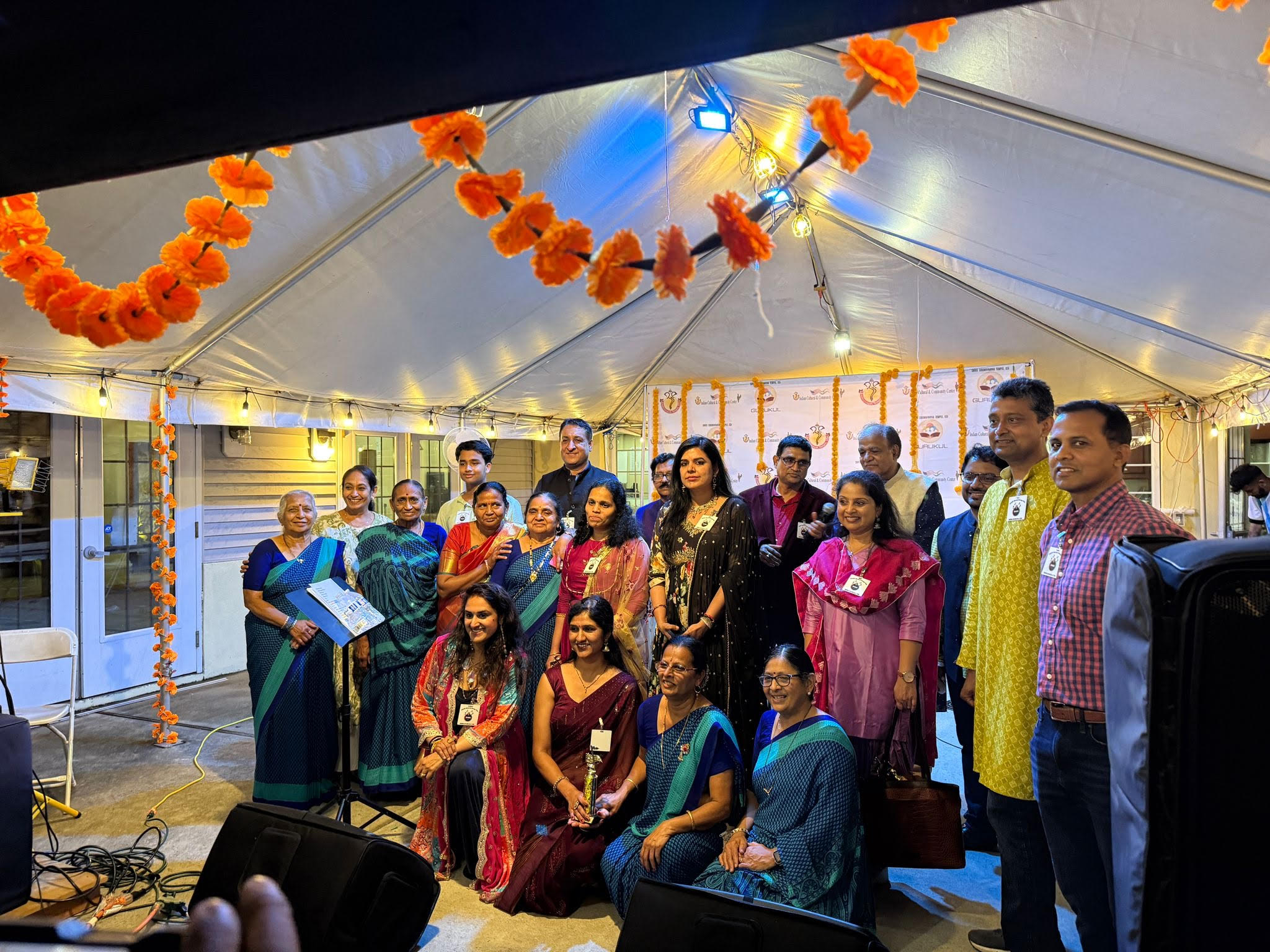 The evening was officially inaugurated by Dr. Avinash Gupta, Chairman of the Temple, and Dr. Geeta Gupta, Chief Trustee. It began with a soulful recitation of shlokas by the children of the Temple’s Gurukul, setting a spiritual and uplifting tone.
The evening was officially inaugurated by Dr. Avinash Gupta, Chairman of the Temple, and Dr. Geeta Gupta, Chief Trustee. It began with a soulful recitation of shlokas by the children of the Temple’s Gurukul, setting a spiritual and uplifting tone.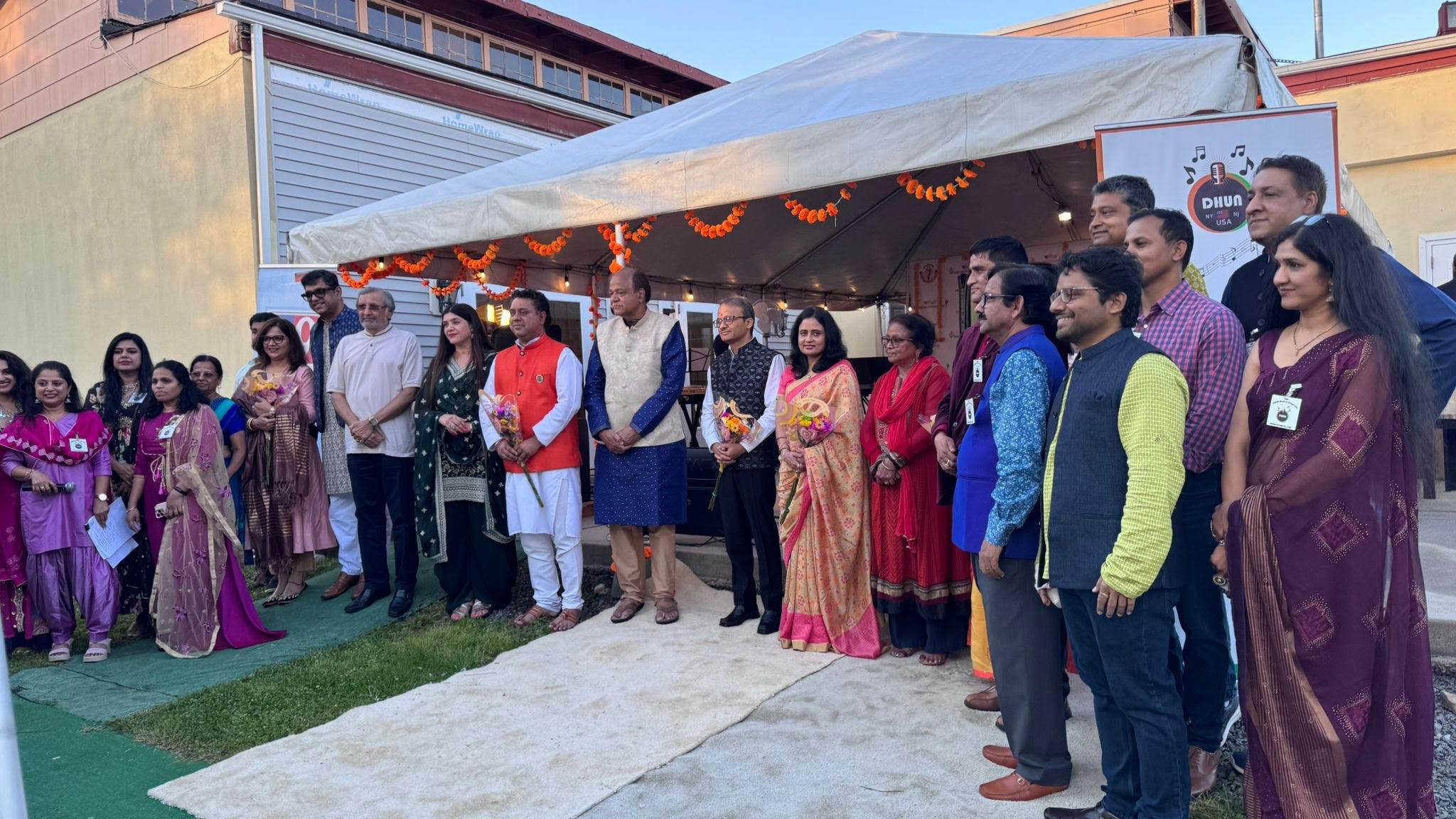 Singh himself — performed alongside a dynamic live orchestra led by Sekhar Das. The event also marked the debut of five emerging talents: Dheeraj, Teju, Keya, Ojas, and Thanmayee, all of whom were warmly received by the audience.
Singh himself — performed alongside a dynamic live orchestra led by Sekhar Das. The event also marked the debut of five emerging talents: Dheeraj, Teju, Keya, Ojas, and Thanmayee, all of whom were warmly received by the audience.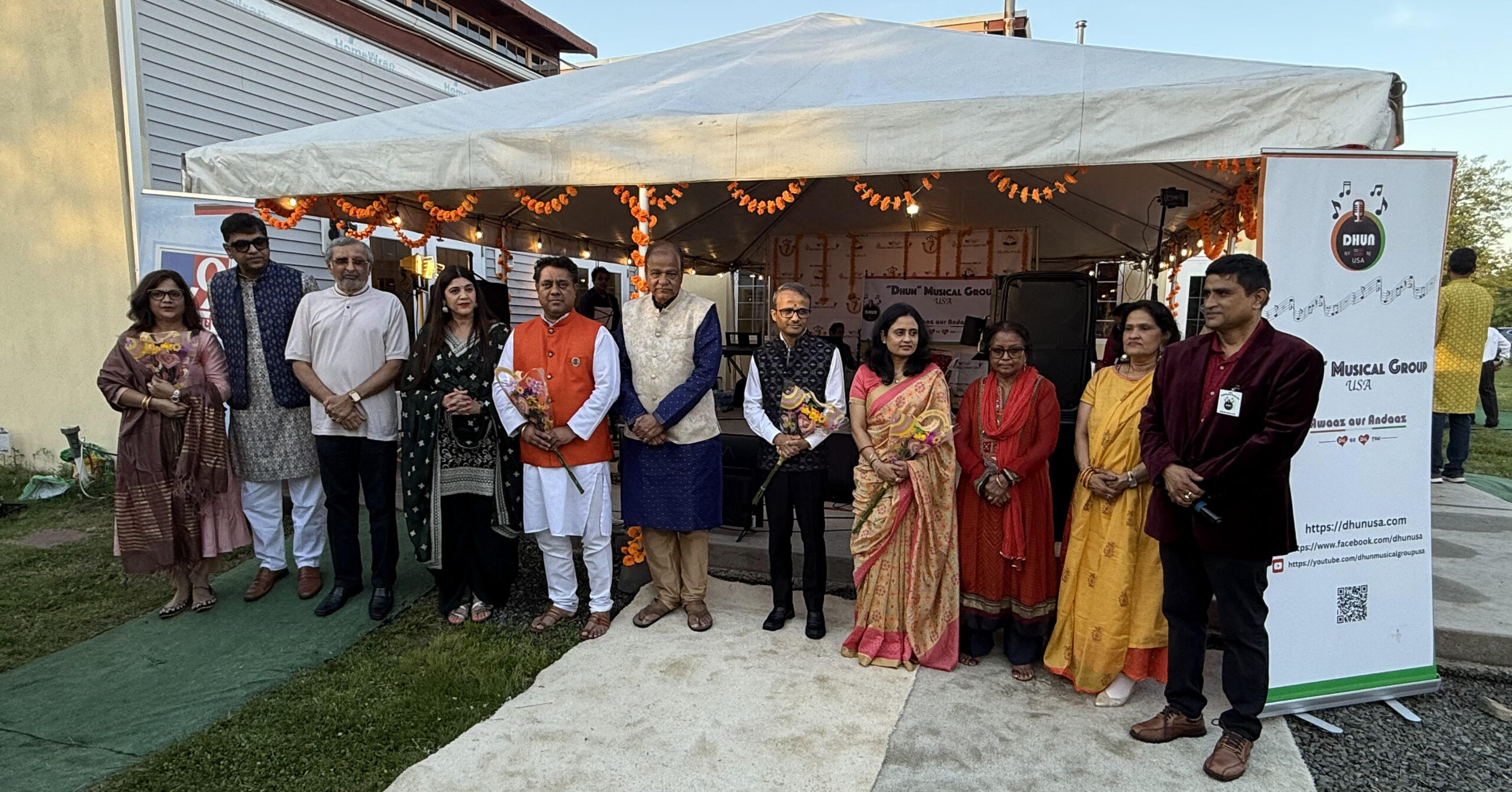 The concert’s success was a genuine community effort, brought to life through the dedication of temple volunteers, committee members, and the organizing team. In their closing remarks, both Dr. Avinash Gupta and Mr. Rajeev Singh expressed deep gratitude to all the volunteers and supporters who made the event a resounding success.
The concert’s success was a genuine community effort, brought to life through the dedication of temple volunteers, committee members, and the organizing team. In their closing remarks, both Dr. Avinash Gupta and Mr. Rajeev Singh expressed deep gratitude to all the volunteers and supporters who made the event a resounding success.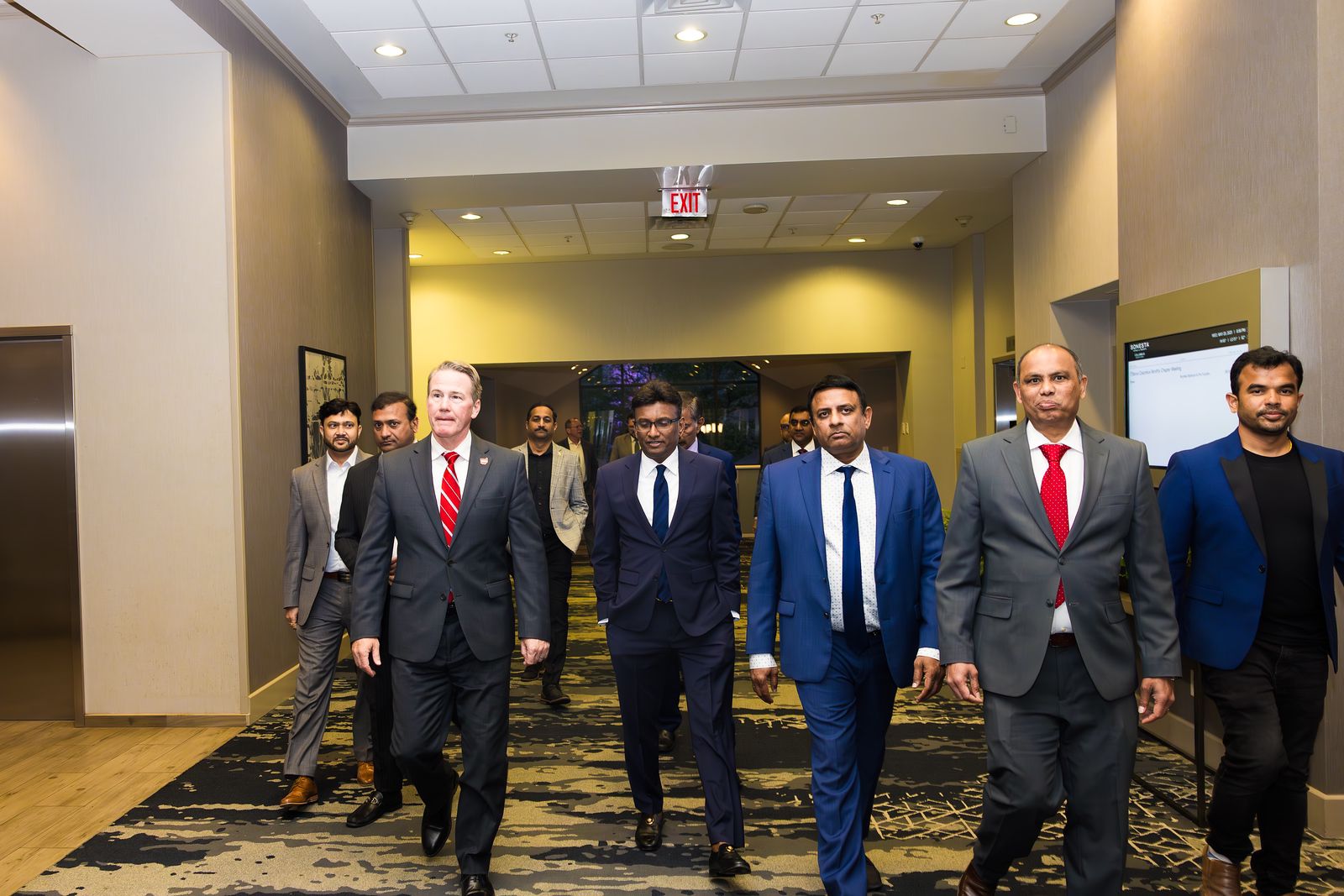 Vallabhaneni, while expressing his appreciation and gratitude to the Sen. Husted, who serves on the Committee on Health, Education, Labor, and Pensions, the Committee on Small Business and Entrepreneurship, the Committee on Environment and Public Works, and the Special Committee on Aging, said, “We truly appreciate the time he spent with us and the valuable insights he shared. His perspectives on current affairs and the evolving role of IT and AI in the industry were both timely and thought-provoking.”
Vallabhaneni, while expressing his appreciation and gratitude to the Sen. Husted, who serves on the Committee on Health, Education, Labor, and Pensions, the Committee on Small Business and Entrepreneurship, the Committee on Environment and Public Works, and the Special Committee on Aging, said, “We truly appreciate the time he spent with us and the valuable insights he shared. His perspectives on current affairs and the evolving role of IT and AI in the industry were both timely and thought-provoking.”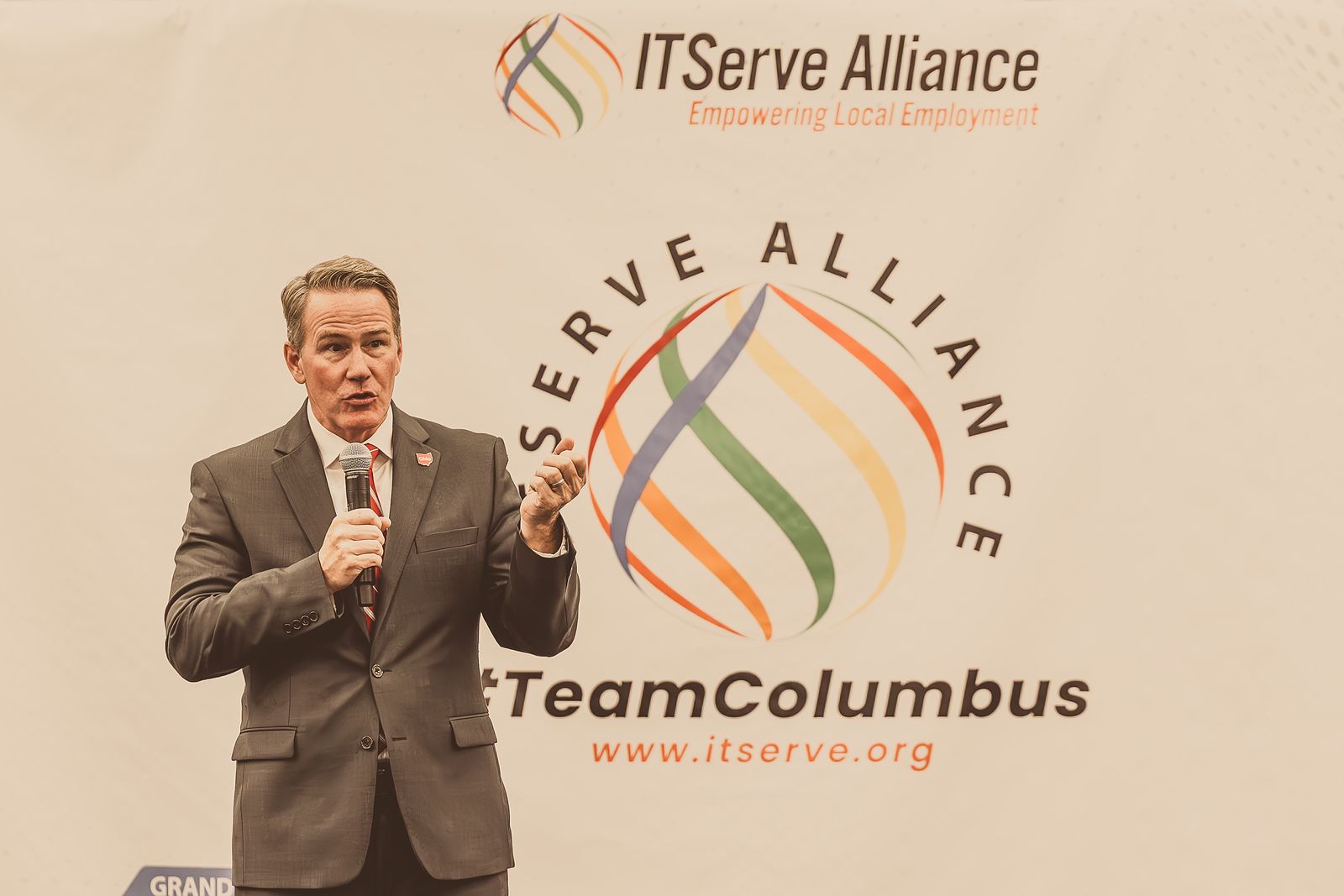 Capitol Hill Day is a vital part of ITServe Alliance, which was born out of the necessity to be the voice of IT companies in the United States, advocating for our rights, with the objective of educating lawmakers working toward meaningful changes that will benefit the IT industry and the larger society across the nation.
Capitol Hill Day is a vital part of ITServe Alliance, which was born out of the necessity to be the voice of IT companies in the United States, advocating for our rights, with the objective of educating lawmakers working toward meaningful changes that will benefit the IT industry and the larger society across the nation.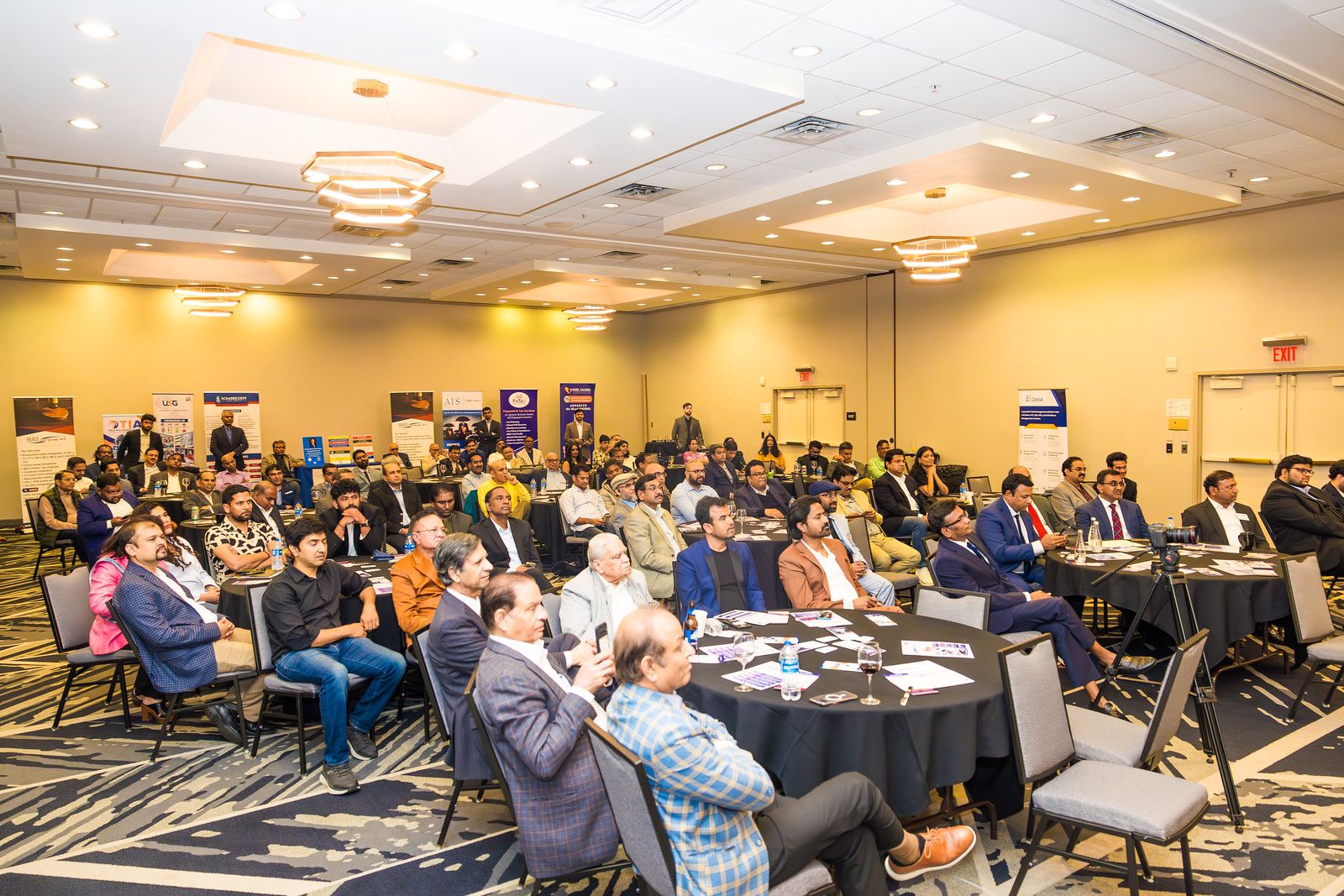 About ITServe Alliance:
About ITServe Alliance: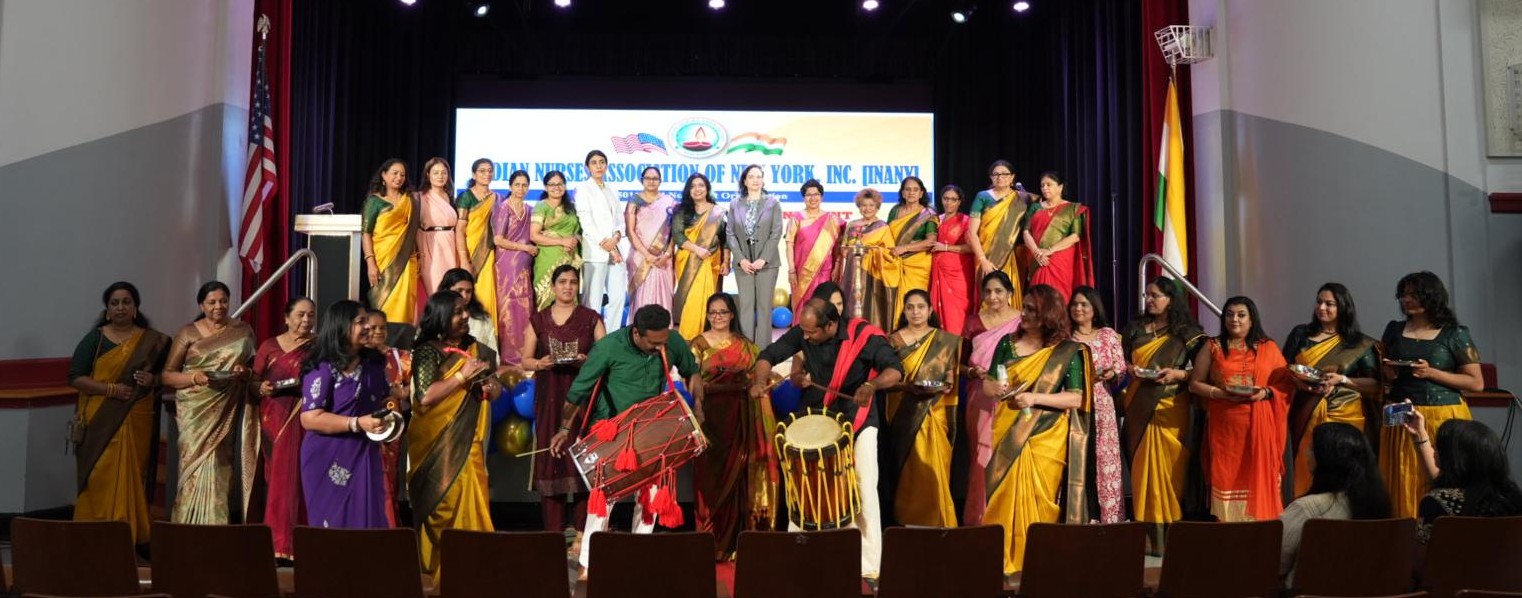 Dr. Roshin highlighted the expansive roles Indian American nurses play in healthcare—from bedside care and treatment prescription to hospital administration, education, research, and community outreach. She praised the resilience and compassion of nurses, urging them to take pride in their profession and to continue challenging the status quo to advance nursing’s impact in healthcare. Dr. Roshin also expressed gratitude to leaders such as Dr. Aney Paul, Sosamma Andrews, Usha George, Mary Philip, Tara Shajan, and Dr. Anna George for their transformational leadership, acknowledging how they have inspired a community of excellence and empowered everyone to reach beyond the workplace with open hearts and generous hands..
Dr. Roshin highlighted the expansive roles Indian American nurses play in healthcare—from bedside care and treatment prescription to hospital administration, education, research, and community outreach. She praised the resilience and compassion of nurses, urging them to take pride in their profession and to continue challenging the status quo to advance nursing’s impact in healthcare. Dr. Roshin also expressed gratitude to leaders such as Dr. Aney Paul, Sosamma Andrews, Usha George, Mary Philip, Tara Shajan, and Dr. Anna George for their transformational leadership, acknowledging how they have inspired a community of excellence and empowered everyone to reach beyond the workplace with open hearts and generous hands..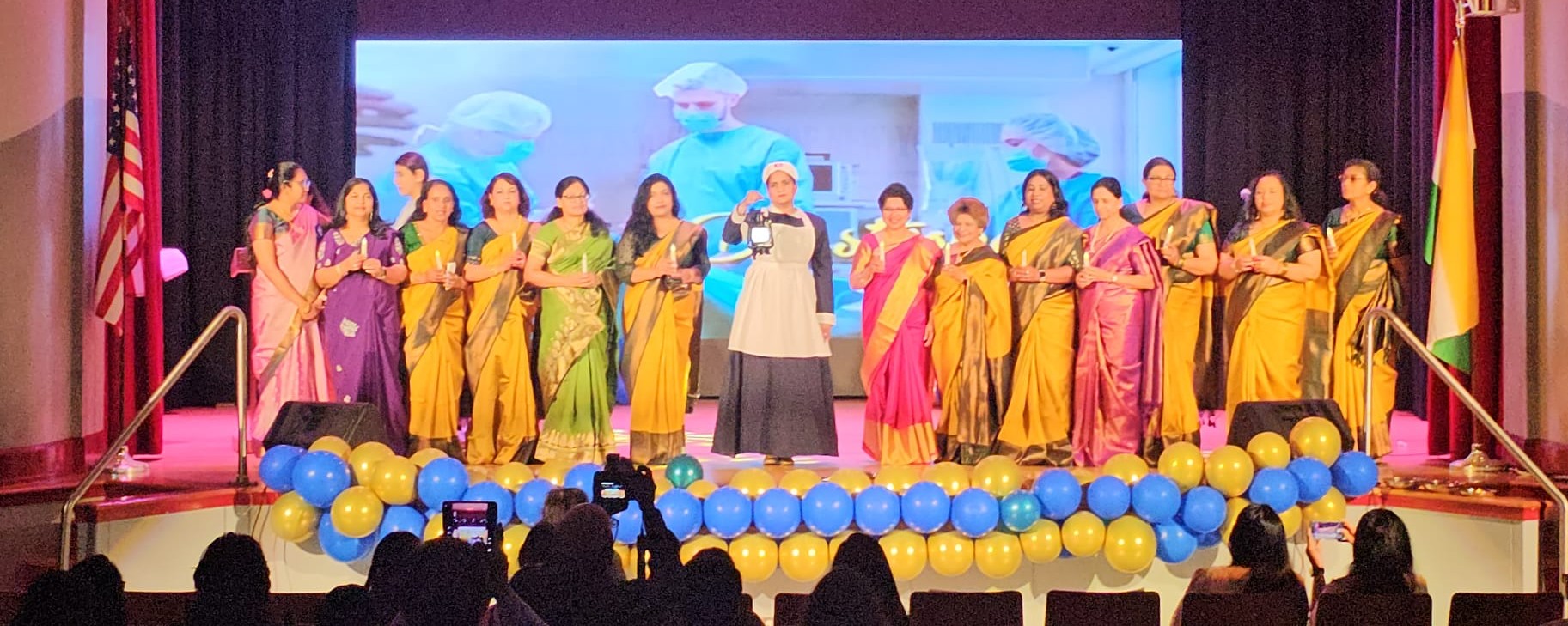 A highlight of the program was the Nurses’ Pledge, reaffirming the community’s commitment to professional excellence. Attendees were also treated to cultural performances, including melodious songs and dynamic dances by talented nurses.
A highlight of the program was the Nurses’ Pledge, reaffirming the community’s commitment to professional excellence. Attendees were also treated to cultural performances, including melodious songs and dynamic dances by talented nurses.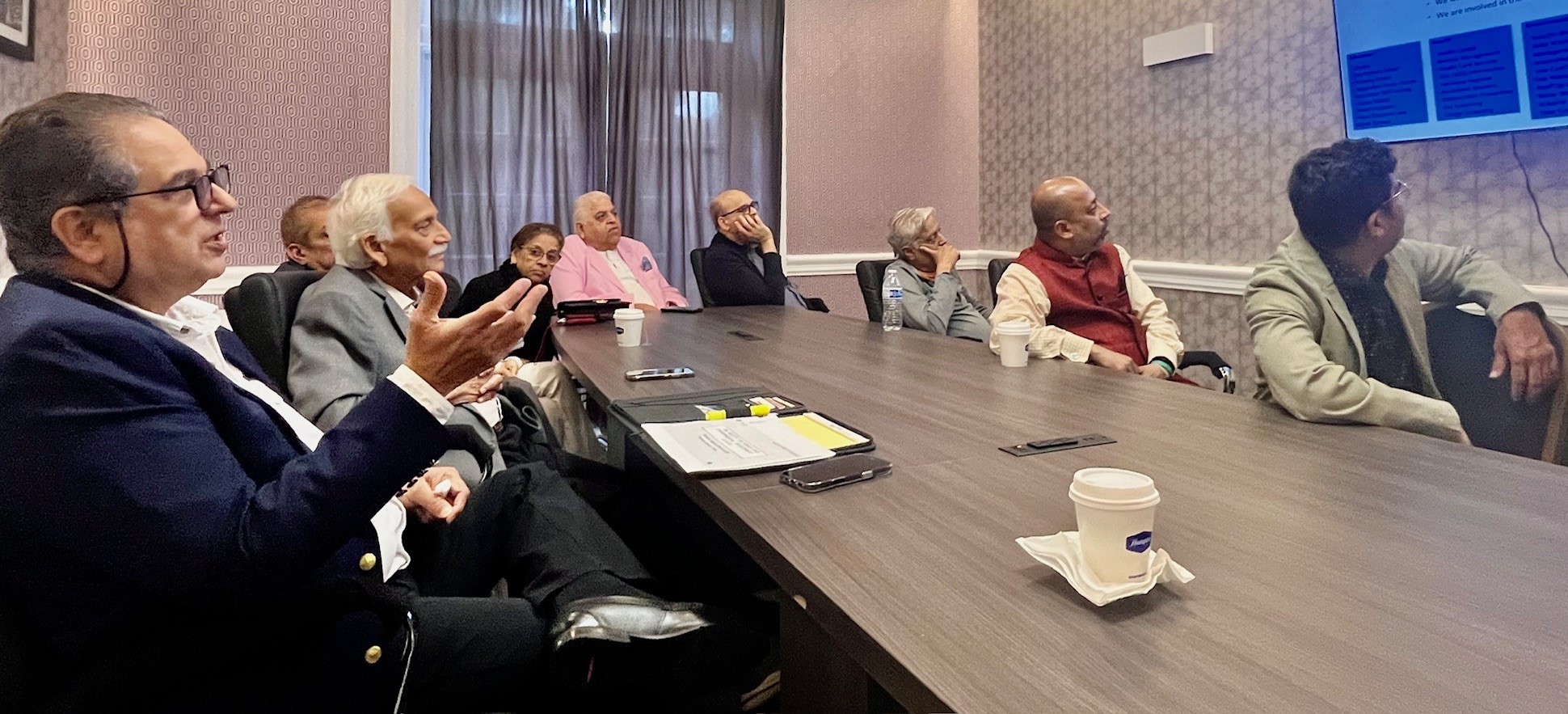 In tribal regions where access to healthcare is limited, SHED has established Health Centers that provide essential primary medical services. More severe or complex cases are referred to larger hospitals, such as Bhaktivedanta Hospital located in Meera Road. These centers serve as a crucial health lifeline in areas that often lack even basic medical facilities.
In tribal regions where access to healthcare is limited, SHED has established Health Centers that provide essential primary medical services. More severe or complex cases are referred to larger hospitals, such as Bhaktivedanta Hospital located in Meera Road. These centers serve as a crucial health lifeline in areas that often lack even basic medical facilities.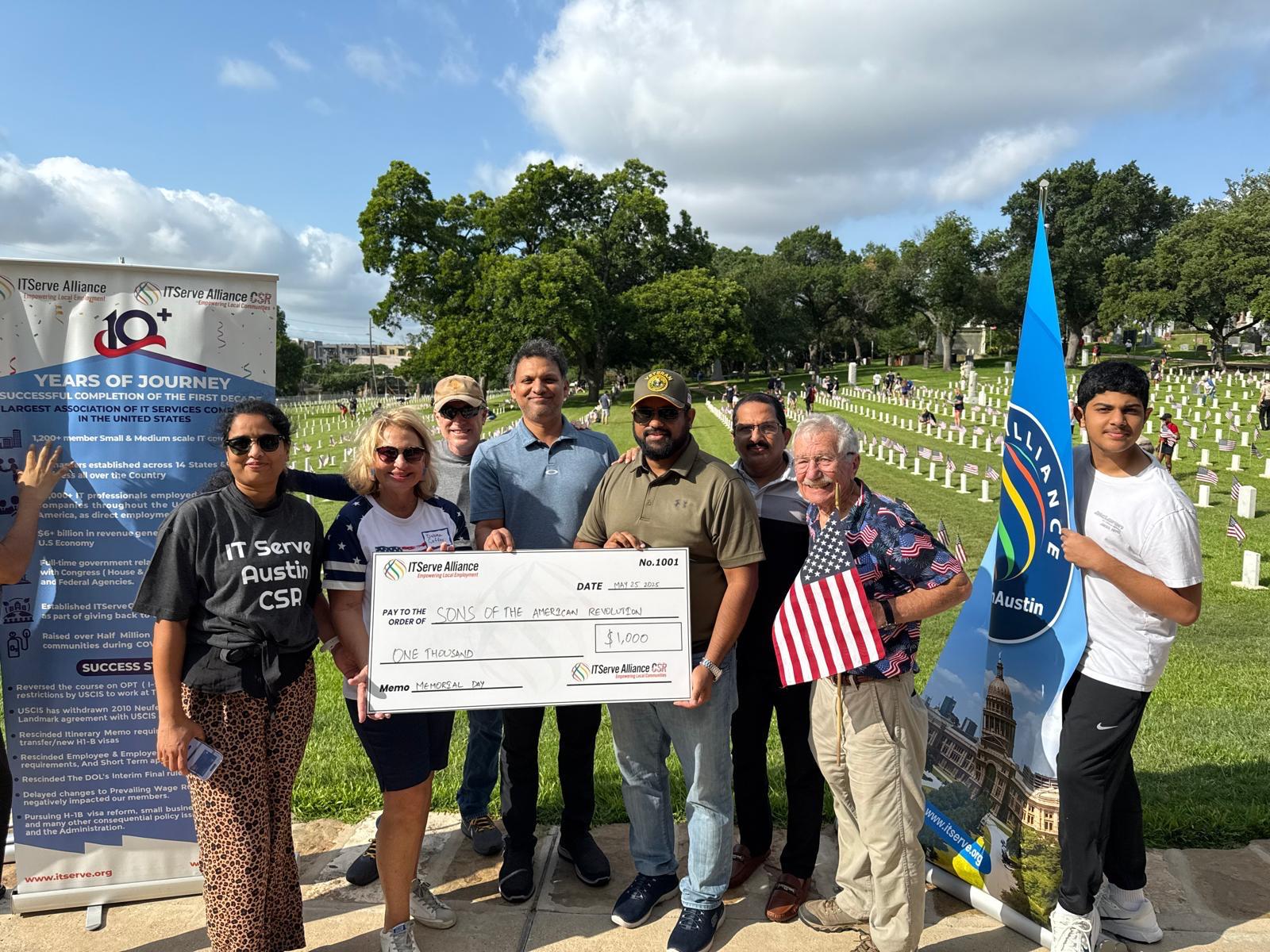
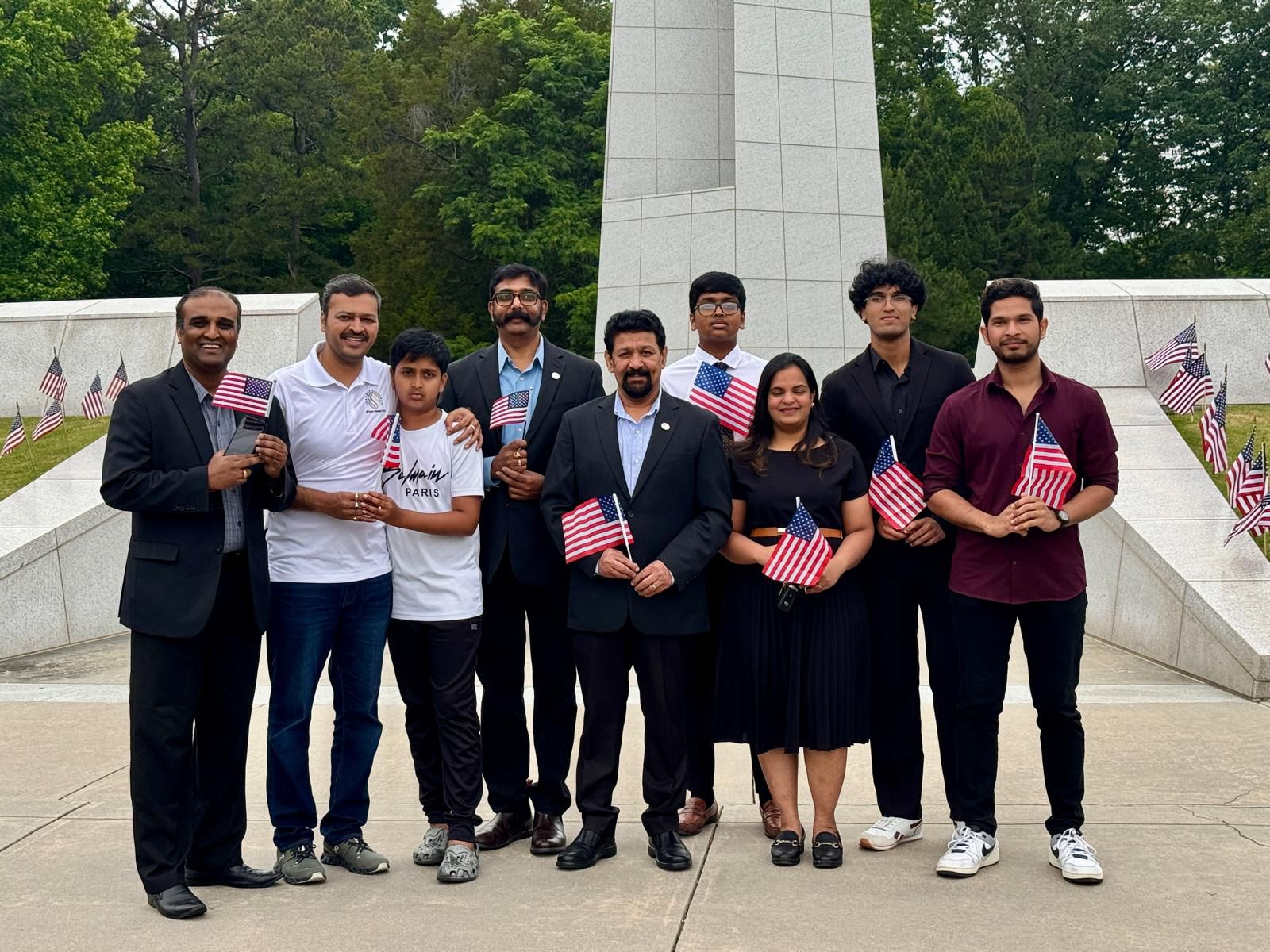 “ITServe and its member community is committed to corporate social responsibility (CSR) and actively contributing to local communities nationwide,” said Anju Vallabhaneni. “We recognize the sacrifices of our veterans and first responders, who selflessly serve our nation. Supporting them and their families is of utmost importance to us, as we express our gratitude for their unwavering dedication and bravery.”
“ITServe and its member community is committed to corporate social responsibility (CSR) and actively contributing to local communities nationwide,” said Anju Vallabhaneni. “We recognize the sacrifices of our veterans and first responders, who selflessly serve our nation. Supporting them and their families is of utmost importance to us, as we express our gratitude for their unwavering dedication and bravery.”
 A key objective of ITServe has been to raise awareness among lawmakers and the broader community about the positive impact of high-skilled legal immigration programs on businesses. Through constructive engagement and collaboration with Members of Congress and Senators, ITServe aims to address misconceptions and advocate for thoughtful legislation that supports economic growth and serves the best interests of the nation.
A key objective of ITServe has been to raise awareness among lawmakers and the broader community about the positive impact of high-skilled legal immigration programs on businesses. Through constructive engagement and collaboration with Members of Congress and Senators, ITServe aims to address misconceptions and advocate for thoughtful legislation that supports economic growth and serves the best interests of the nation.




 Special guests included AAPI President-Dr. Satheesh Kathula, Mrs. Rajul Bhalala- The President of Chinmaya Mission Chicago, Mr. Sunil Shah-Founding President of FIA, Dr. Piyush Vyas-ISMS President, Padma Shri Dr. Bharat Barai, Dr. Arvind Goyal -Executive Medical director of Illinois State Health and Family Services. The evening was filled with inspiring speeches, cultural performances, and a nostalgic Bollywood musical journey, celebrated IAMACF’s mission to deliver free, high-quality healthcare.
Special guests included AAPI President-Dr. Satheesh Kathula, Mrs. Rajul Bhalala- The President of Chinmaya Mission Chicago, Mr. Sunil Shah-Founding President of FIA, Dr. Piyush Vyas-ISMS President, Padma Shri Dr. Bharat Barai, Dr. Arvind Goyal -Executive Medical director of Illinois State Health and Family Services. The evening was filled with inspiring speeches, cultural performances, and a nostalgic Bollywood musical journey, celebrated IAMACF’s mission to deliver free, high-quality healthcare. Committee and Board of Directors. He shared a transparent financial overview, Dr. Kumar invited nominations from general membership to elect Dr. Raj Aurora and Dr. Amarjit Singh as members-at-large, for the Nominating Committee.
Committee and Board of Directors. He shared a transparent financial overview, Dr. Kumar invited nominations from general membership to elect Dr. Raj Aurora and Dr. Amarjit Singh as members-at-large, for the Nominating Committee.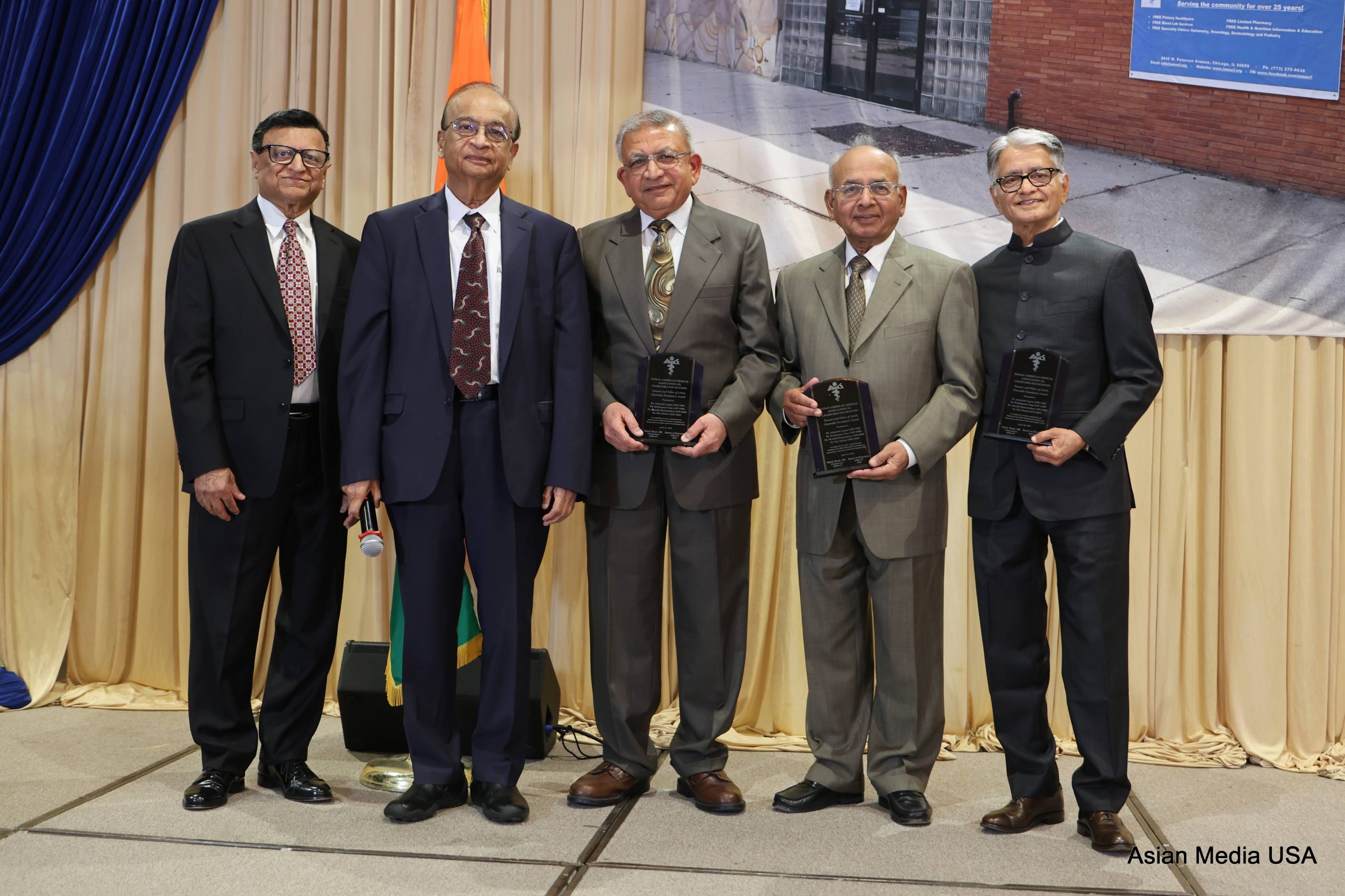 IAMACF recognized pioneers and pillars of IAMA Charitable Clinic , Dr. Ashutosh Gupta, Dr. Rohit Vasa, Dr. Marella Hanumadass, and Dr. Brij Malani for their vision, leadership and providing service as chairperson from 1994-2000. Dr. Suneela Harsoor received the Leadership Award for outstanding services and hard work as chairperson of IAMA-CF in 2023 earning the Gold seal award from NFCC. Dr. Sukanya Reddy received volunteer physician award and Dr. Dr. Praveen Mehta for his hardwork and selfless contribution as the Medical Director of the Clinic. The Numara Foundation, and Neelyx Labs, with Dr. Ram Saladi and Sham Saladi pledging free lab testing for 2025.
IAMACF recognized pioneers and pillars of IAMA Charitable Clinic , Dr. Ashutosh Gupta, Dr. Rohit Vasa, Dr. Marella Hanumadass, and Dr. Brij Malani for their vision, leadership and providing service as chairperson from 1994-2000. Dr. Suneela Harsoor received the Leadership Award for outstanding services and hard work as chairperson of IAMA-CF in 2023 earning the Gold seal award from NFCC. Dr. Sukanya Reddy received volunteer physician award and Dr. Dr. Praveen Mehta for his hardwork and selfless contribution as the Medical Director of the Clinic. The Numara Foundation, and Neelyx Labs, with Dr. Ram Saladi and Sham Saladi pledging free lab testing for 2025.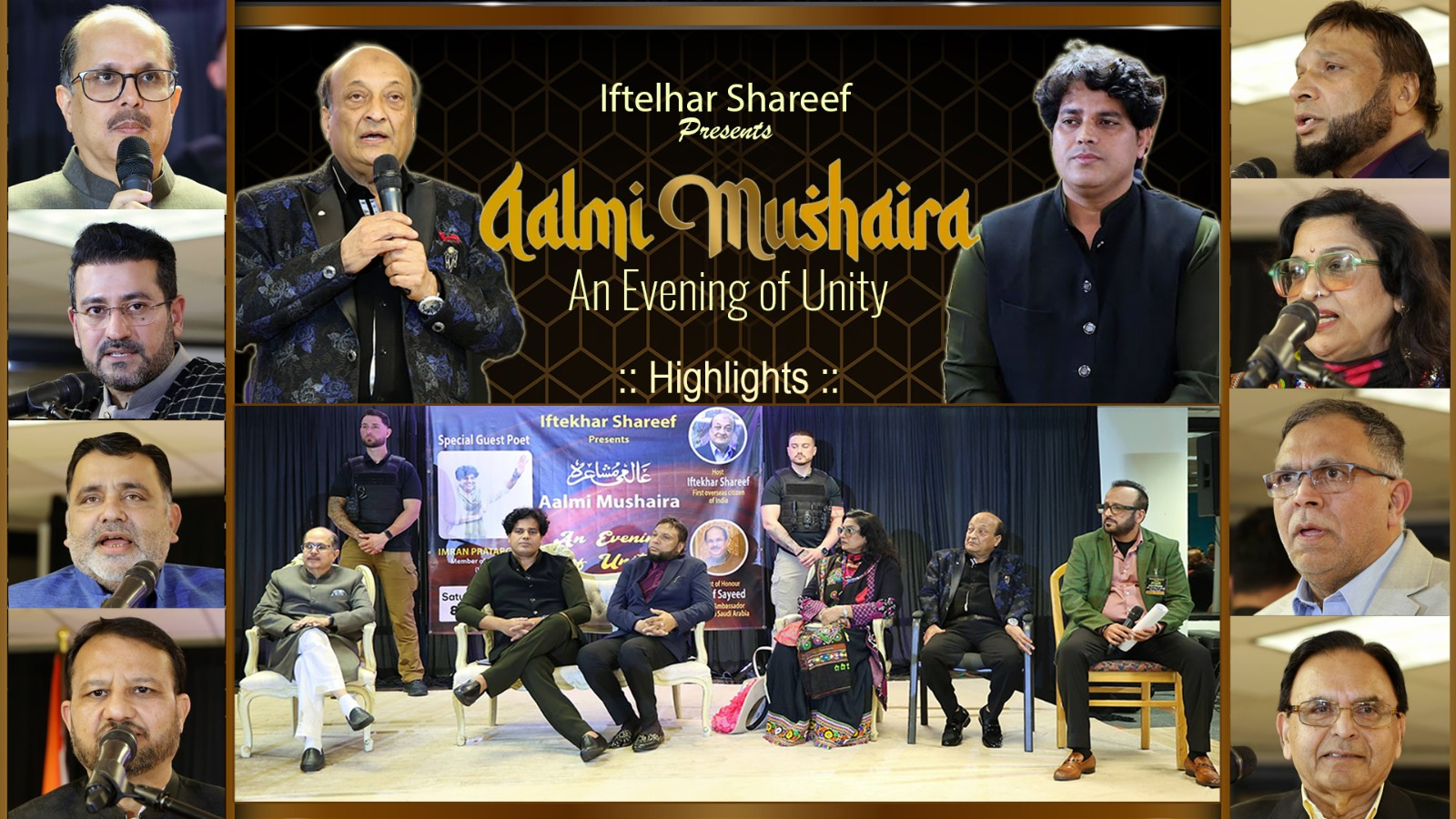 The evening was graced by
The evening was graced by 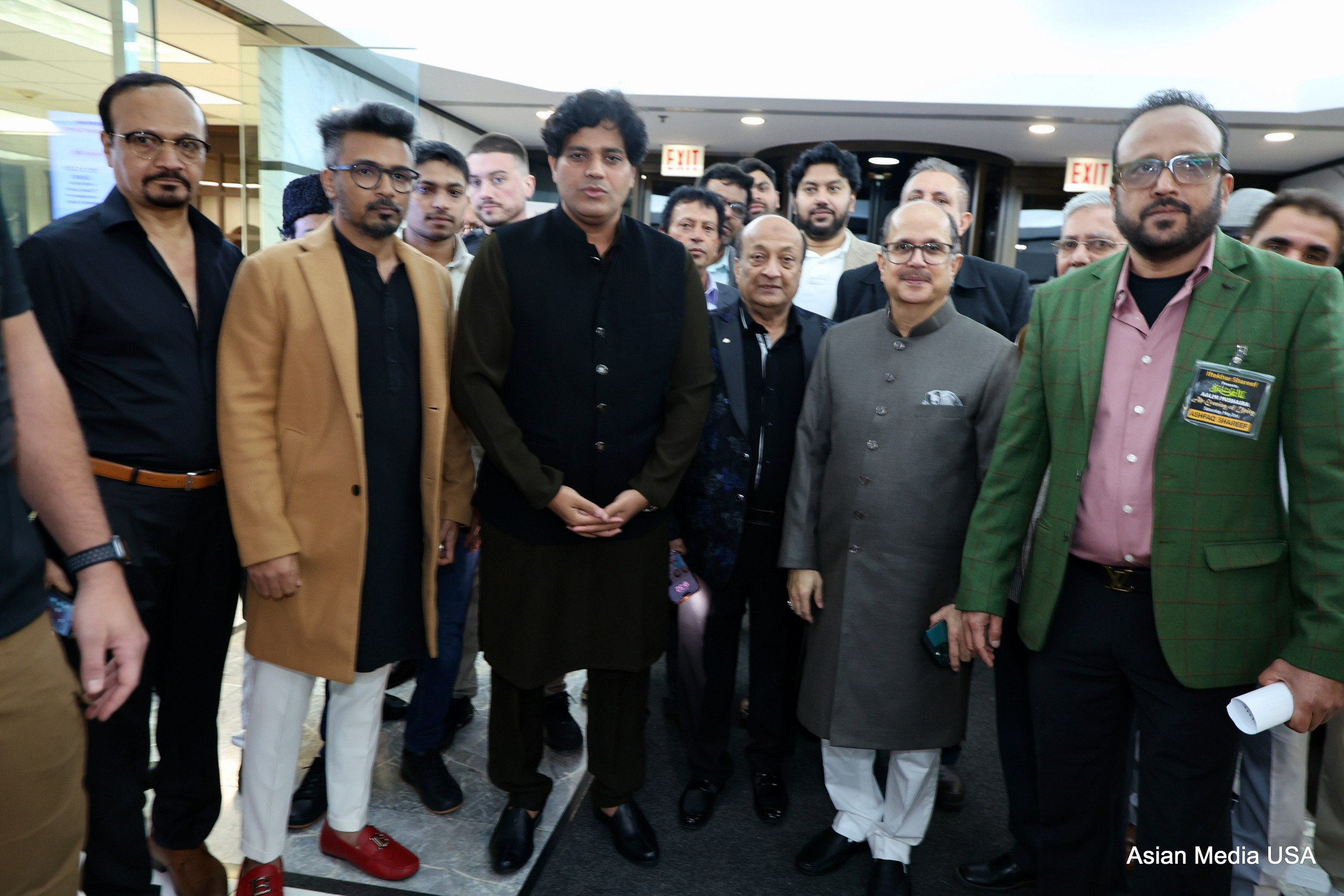 Pe Aati Hai Dua reimagined Allama Iqbal’s classic, weaving a heartfelt prayer for peace in conflict-torn regions like Palestine. “When bullets fly anywhere, it is humanity that dies,” he declared, urging the world to embrace love over hatred. His Lal Qila personifying the Red Fort as a witness to India’s history, stirred patriotic fervor, earning thunderous applause. Pratapgarhi’s ability to blend social commentary with poetic finesse left the audience spellbound.
Pe Aati Hai Dua reimagined Allama Iqbal’s classic, weaving a heartfelt prayer for peace in conflict-torn regions like Palestine. “When bullets fly anywhere, it is humanity that dies,” he declared, urging the world to embrace love over hatred. His Lal Qila personifying the Red Fort as a witness to India’s history, stirred patriotic fervor, earning thunderous applause. Pratapgarhi’s ability to blend social commentary with poetic finesse left the audience spellbound.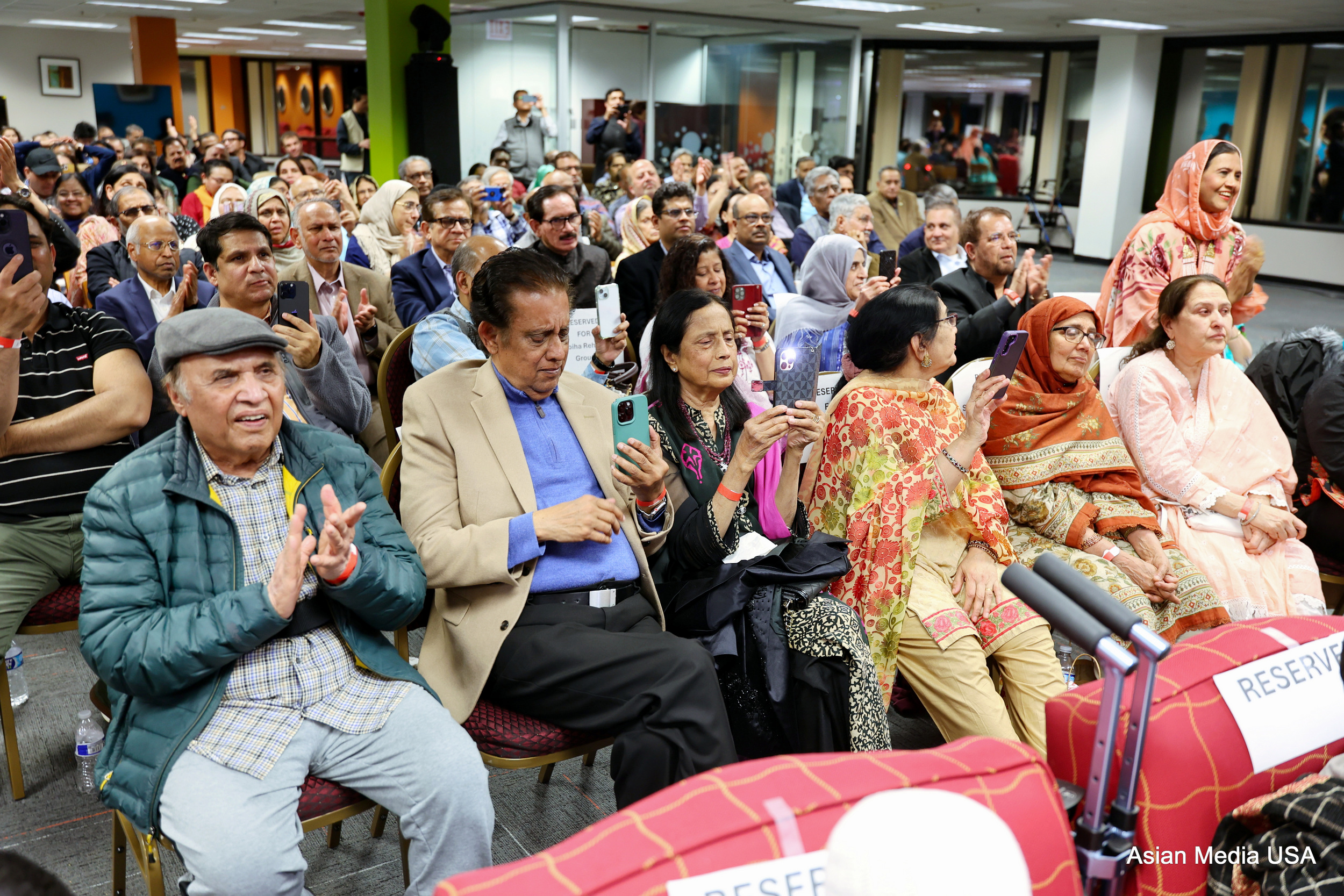 The mushaira concluded with a standing ovation for the poets and organizers, followed by the national anthems of the USA and India, symbolizing the shared values of both nations. Flowers were presented to the guest poets, and Minhaj Akhtar, President of the IOC Committee – Midwest region, joined in honoring the performers. Iftekhar Shareef’s closing remarks reiterated the event’s commitment to fostering peace and cultural harmony, leaving attendees inspired and uplifted.
The mushaira concluded with a standing ovation for the poets and organizers, followed by the national anthems of the USA and India, symbolizing the shared values of both nations. Flowers were presented to the guest poets, and Minhaj Akhtar, President of the IOC Committee – Midwest region, joined in honoring the performers. Iftekhar Shareef’s closing remarks reiterated the event’s commitment to fostering peace and cultural harmony, leaving attendees inspired and uplifted.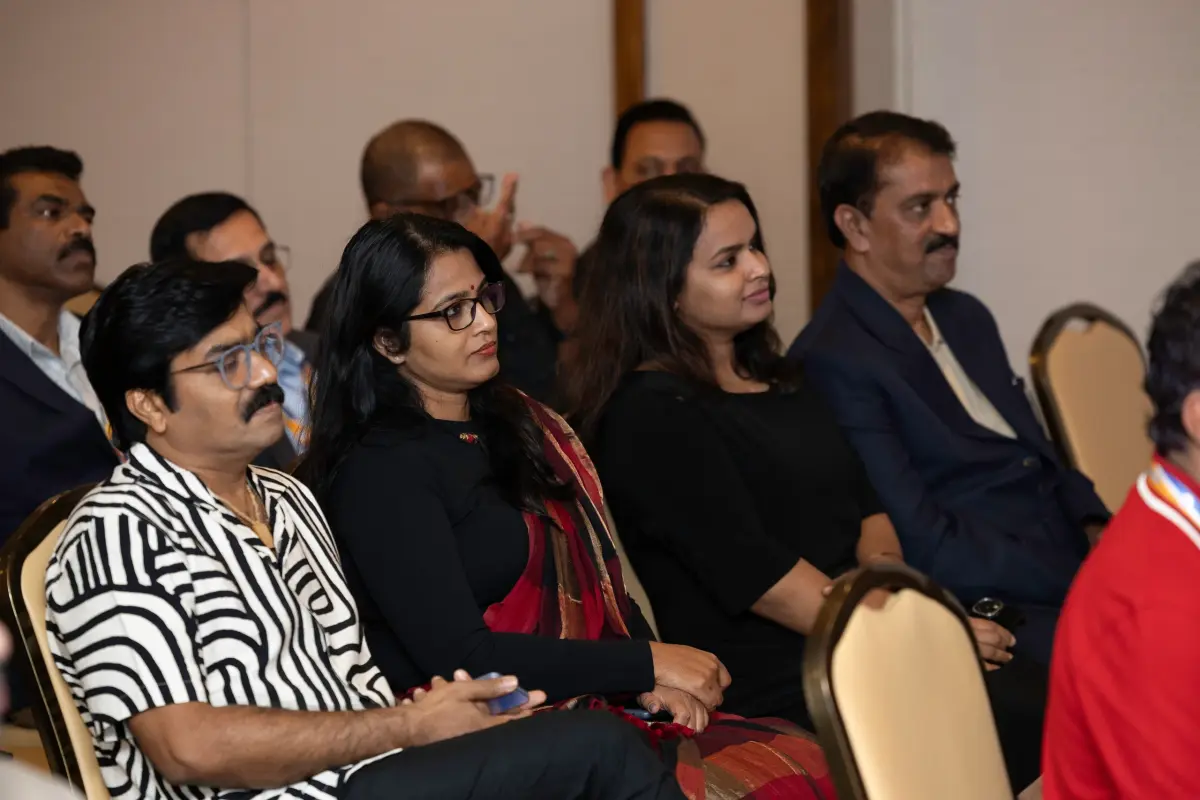 Participants at the Conference were part of insightful panel discussions, keynote speeches, and interactive sessions led by media experts, offering valuable perspectives on the evolving world of journalism. With digital transformation and press freedom remaining critical global issues, the conference facilitated discussions on key challenges and potential solutions shaping the future of journalism.
Participants at the Conference were part of insightful panel discussions, keynote speeches, and interactive sessions led by media experts, offering valuable perspectives on the evolving world of journalism. With digital transformation and press freedom remaining critical global issues, the conference facilitated discussions on key challenges and potential solutions shaping the future of journalism.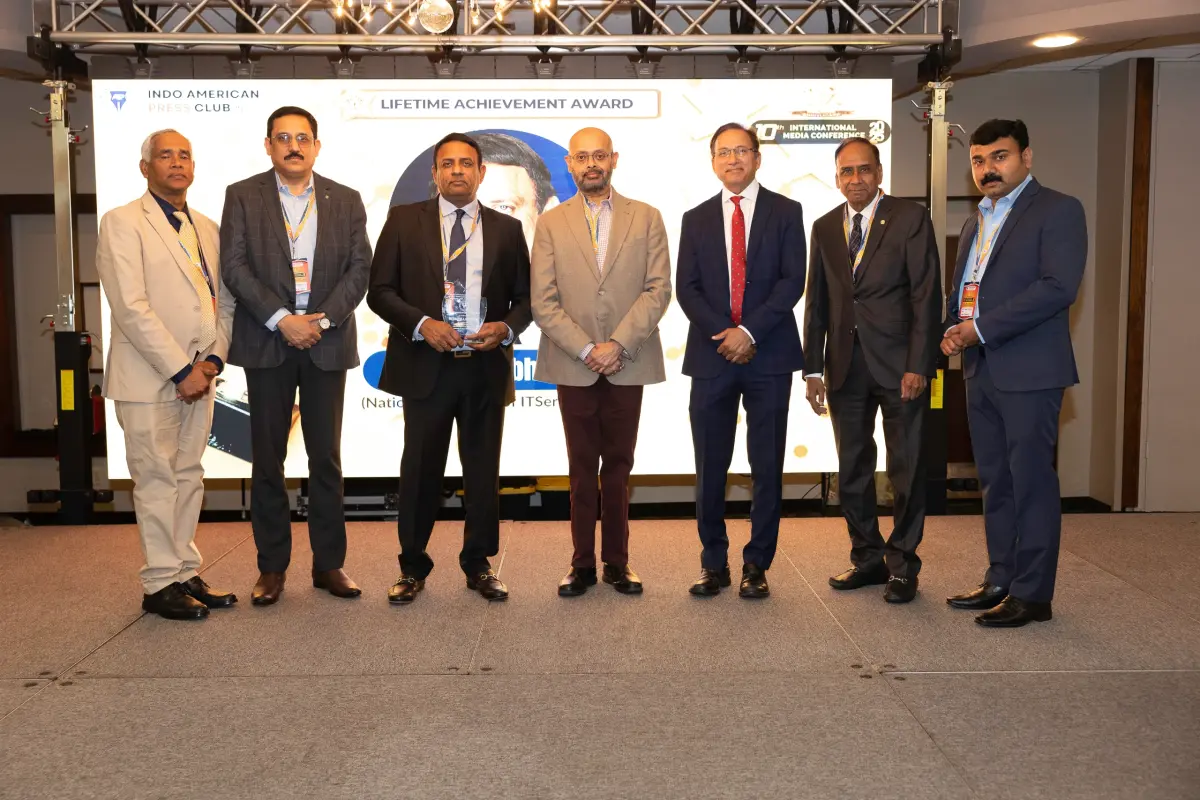 Dr. Vemuri S. Murthy is the co-investigator of a ground-breaking Cardiac Arrest Registry in India, “Warangal Area Cardiac Arrest Registry”. Dr. Murthy, a past President of the Chicago Medical Society and Indian American Medical Association (Illinois), has received several prestigious national and international awards and a Medal of US Congress as “Global Champion of Resuscitation” for his professional and community service contributions in the USA and India.
Dr. Vemuri S. Murthy is the co-investigator of a ground-breaking Cardiac Arrest Registry in India, “Warangal Area Cardiac Arrest Registry”. Dr. Murthy, a past President of the Chicago Medical Society and Indian American Medical Association (Illinois), has received several prestigious national and international awards and a Medal of US Congress as “Global Champion of Resuscitation” for his professional and community service contributions in the USA and India. The IAPC Souvenir Video edition was released after a video introduction by Dr. Mathew Joys, Chair of the Souvenir Committee and a short visual highlight of the souvenir on the screen, giving a glimpse of the beautifully curated content and memories it holds. In addition, the book “The Citizen Journalist,” written by Dr. Matthew Joys and providing guidelines for new media workers, was released by former Chairman Dr. Babu Stephen in the presence of eminent journalist Romi Mathew. The book is a compelling exploration of truth-telling in the modern world, blending insights from his rich experience in media, ethics, and civic engagement. Dr. Joys was then honored in absentia as one of the most prolific voices in the Indian American media community.
The IAPC Souvenir Video edition was released after a video introduction by Dr. Mathew Joys, Chair of the Souvenir Committee and a short visual highlight of the souvenir on the screen, giving a glimpse of the beautifully curated content and memories it holds. In addition, the book “The Citizen Journalist,” written by Dr. Matthew Joys and providing guidelines for new media workers, was released by former Chairman Dr. Babu Stephen in the presence of eminent journalist Romi Mathew. The book is a compelling exploration of truth-telling in the modern world, blending insights from his rich experience in media, ethics, and civic engagement. Dr. Joys was then honored in absentia as one of the most prolific voices in the Indian American media community.
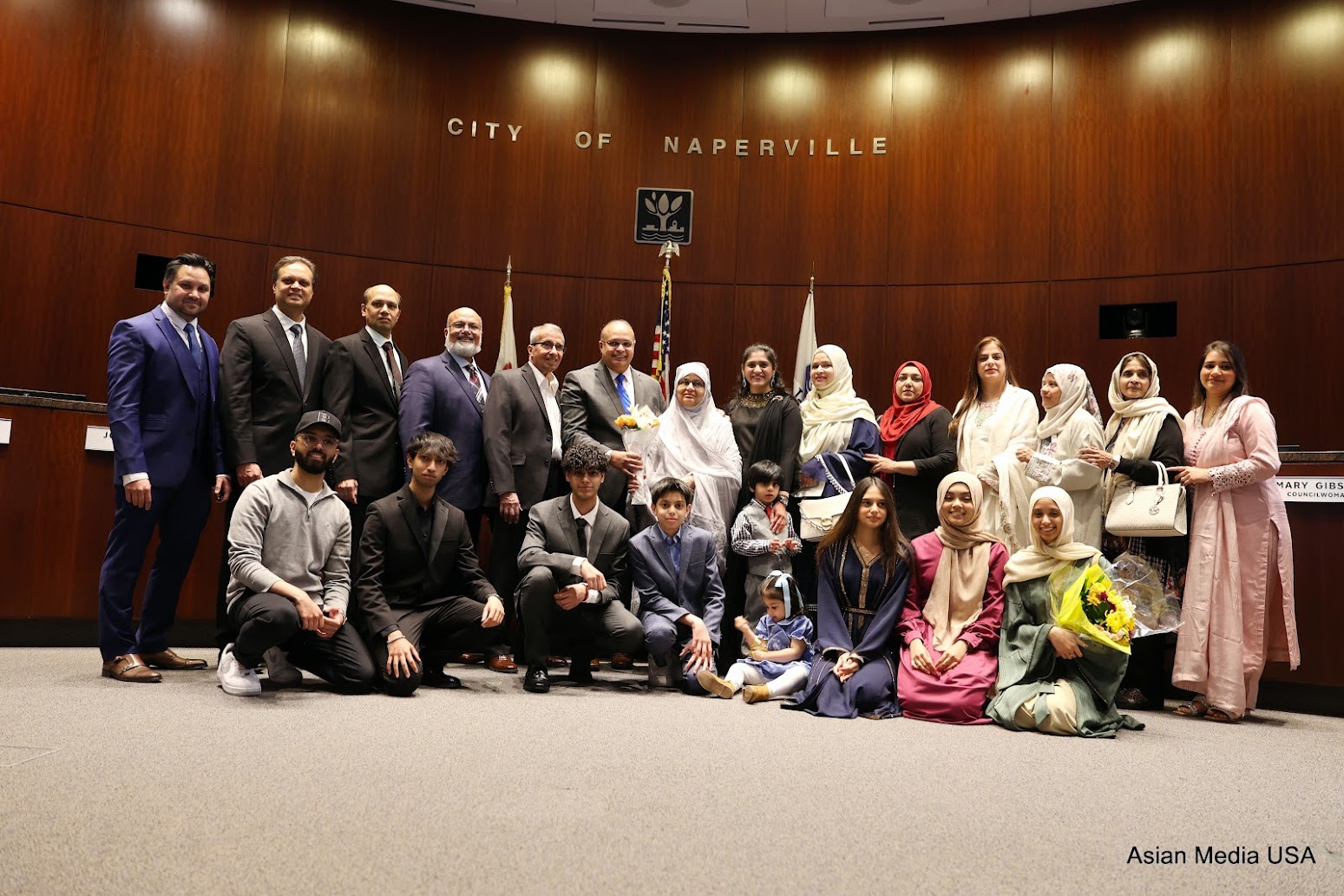 Chicago, IL: In a ceremony at the Naperville Municipal Center, Ashfaq Syed was officially sworn in as a member of the Naperville City Council. Surrounded by family, friends, supporters, and community leaders, Syed took the oath of office and delivered his inaugural remarks, pledging to serve with integrity, accountability, and a deep commitment to the people of Naperville.
Chicago, IL: In a ceremony at the Naperville Municipal Center, Ashfaq Syed was officially sworn in as a member of the Naperville City Council. Surrounded by family, friends, supporters, and community leaders, Syed took the oath of office and delivered his inaugural remarks, pledging to serve with integrity, accountability, and a deep commitment to the people of Naperville. in community needs.
in community needs.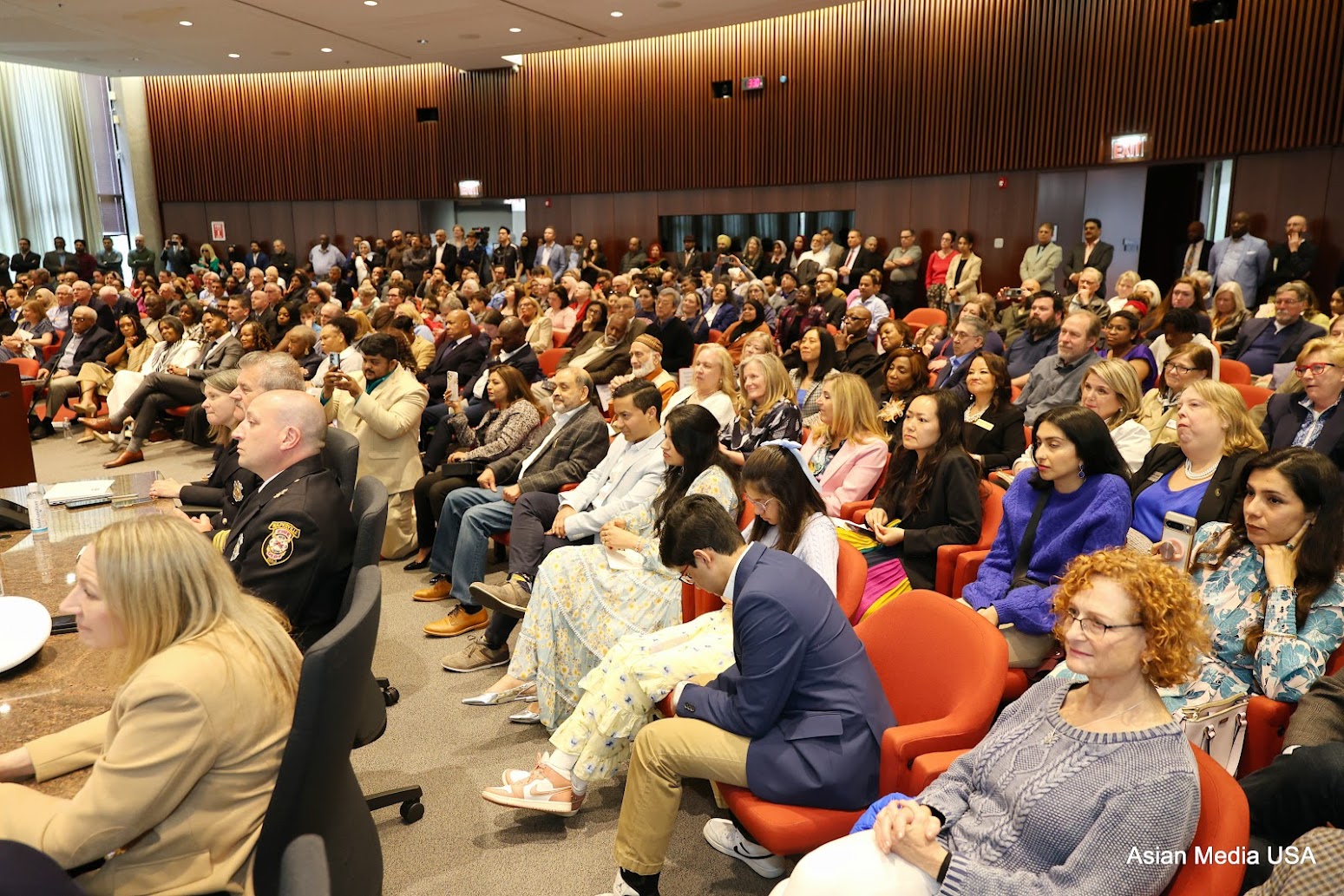 “Budgets should reflect our values,” Syed added. “City government should be as responsive as the people it serves. I will advocate for smarter growth, support small businesses, and invest in services that uplift families and strengthen our neighborhoods.”
“Budgets should reflect our values,” Syed added. “City government should be as responsive as the people it serves. I will advocate for smarter growth, support small businesses, and invest in services that uplift families and strengthen our neighborhoods.”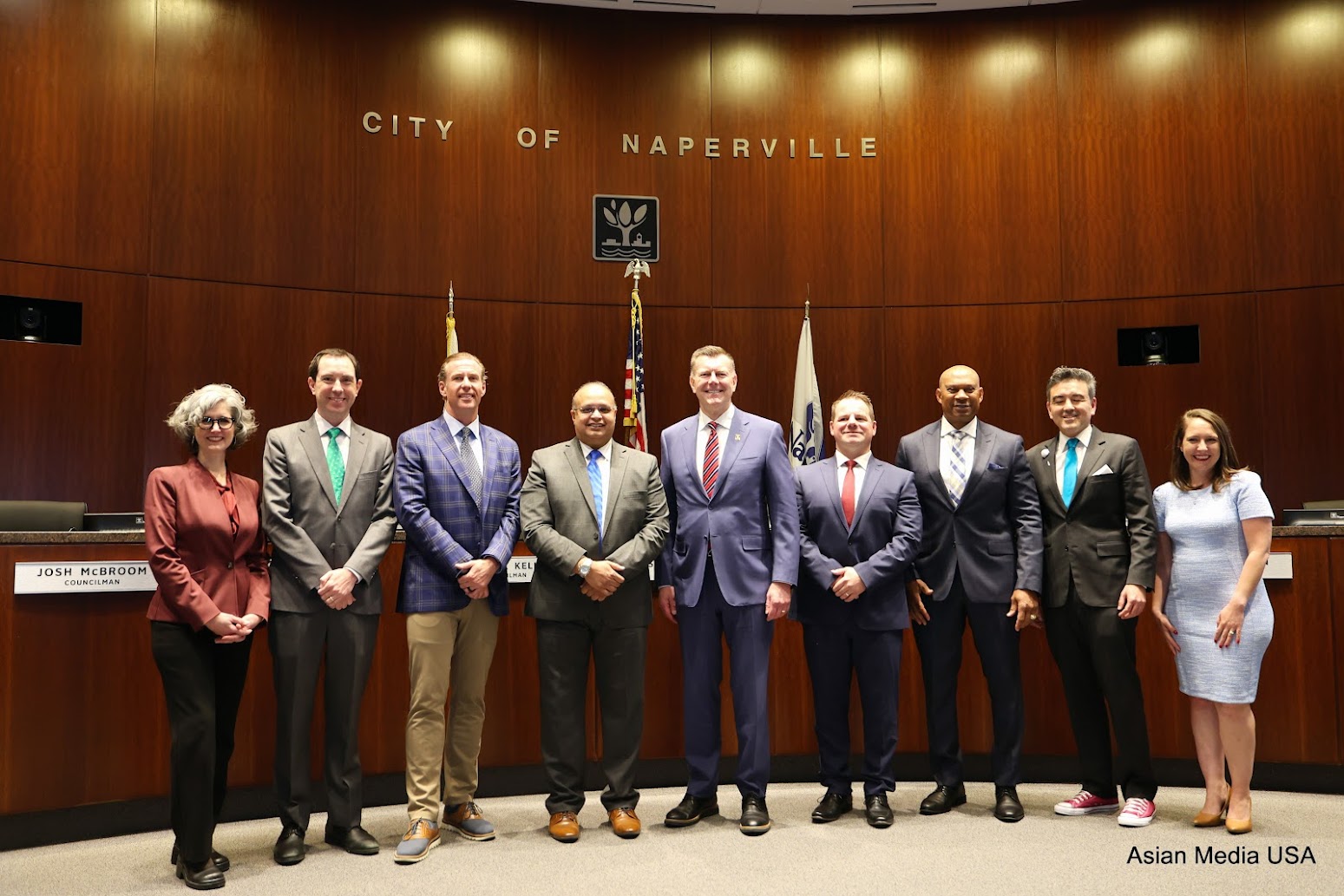
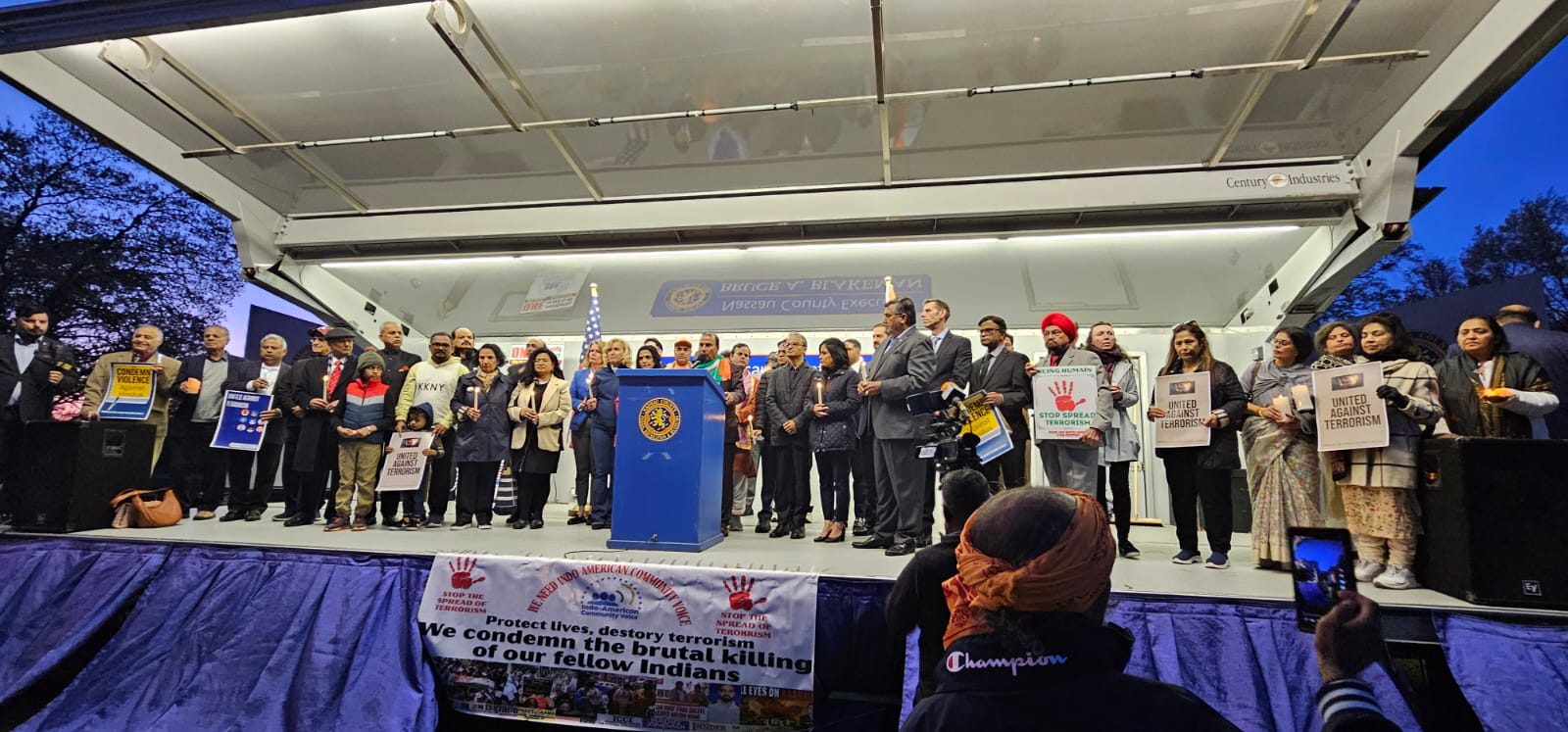 The event brought together community leaders, elected officials, and hundreds of attendees under one banner of unity and resilience. Among the key supporting organizations were: AAPI (Dr. Kishan Kumar), AIA National (Gobind Munjal), AIA NY (Beena Kothari), Arya Samaj of Long Island (Dr. Yashpal Arya & Veer Mukhi), American Malayalee Association (Thomas Joy and Hon. Kevin Thomas), FIPA (Dr. Raj Bhayani), APS (Gary Sikka & Mohinder Singh Taneja), ASAMAI Hindu Temple (Gobind Bathija), Bollywood Insider (Varinder Bhalla), FBIMA (Koshy Thomas & Dincil George), Gujarathi Samaj (Harshad Bhai Patel), HOLI (Urmila Shivaram), HSS (Jaya Patil), Humanity First (Omkar Singh), IAAC (Deepak Bansal), IANA (Vimal Goyal), IDP (Vimal Goyal & Deepak Bansal), IAF (Indu Jaiswal), IALI (Jasbir Singh), Indo American Lions Club (Anju Sharma), Indian Panorama (Prof. Inderjit Saluja), Kashmiri Overseas Association (Dr. Virender Hak & Mohan Wanchoo), KKNY (Raghu Ranganath), LIDC (Paul Bindra), LILC (Pinky Jaggi), Lotus in the Mud (Parveen Chopra), MAHIMA (Dr. Purushotaman Panicker), NYTTA (Vani S. Anugu), RANA (Neelam Modi), SAAWA (Dr. Anila Midha), SAAWO (Suhag Mehta), South Asian Times (Kamlesh Mehta), Soul of Hindutva (Gobind Singh Negi), TANA (Deepika Sammeta), TLCA (Sumant Ram), Tri-State Events (Atul Sharma), TTA (Jaya Prakash Enjapuri), The World Voice (Mukesh Modi), Vaishnav Temple (Anil Shah), VHI (Nayan Kisnadwala), WVV (Rakesh Bhargav), and YICG (Rathi Raja)—demonstrating a united front in the face of tragedy.
The event brought together community leaders, elected officials, and hundreds of attendees under one banner of unity and resilience. Among the key supporting organizations were: AAPI (Dr. Kishan Kumar), AIA National (Gobind Munjal), AIA NY (Beena Kothari), Arya Samaj of Long Island (Dr. Yashpal Arya & Veer Mukhi), American Malayalee Association (Thomas Joy and Hon. Kevin Thomas), FIPA (Dr. Raj Bhayani), APS (Gary Sikka & Mohinder Singh Taneja), ASAMAI Hindu Temple (Gobind Bathija), Bollywood Insider (Varinder Bhalla), FBIMA (Koshy Thomas & Dincil George), Gujarathi Samaj (Harshad Bhai Patel), HOLI (Urmila Shivaram), HSS (Jaya Patil), Humanity First (Omkar Singh), IAAC (Deepak Bansal), IANA (Vimal Goyal), IDP (Vimal Goyal & Deepak Bansal), IAF (Indu Jaiswal), IALI (Jasbir Singh), Indo American Lions Club (Anju Sharma), Indian Panorama (Prof. Inderjit Saluja), Kashmiri Overseas Association (Dr. Virender Hak & Mohan Wanchoo), KKNY (Raghu Ranganath), LIDC (Paul Bindra), LILC (Pinky Jaggi), Lotus in the Mud (Parveen Chopra), MAHIMA (Dr. Purushotaman Panicker), NYTTA (Vani S. Anugu), RANA (Neelam Modi), SAAWA (Dr. Anila Midha), SAAWO (Suhag Mehta), South Asian Times (Kamlesh Mehta), Soul of Hindutva (Gobind Singh Negi), TANA (Deepika Sammeta), TLCA (Sumant Ram), Tri-State Events (Atul Sharma), TTA (Jaya Prakash Enjapuri), The World Voice (Mukesh Modi), Vaishnav Temple (Anil Shah), VHI (Nayan Kisnadwala), WVV (Rakesh Bhargav), and YICG (Rathi Raja)—demonstrating a united front in the face of tragedy.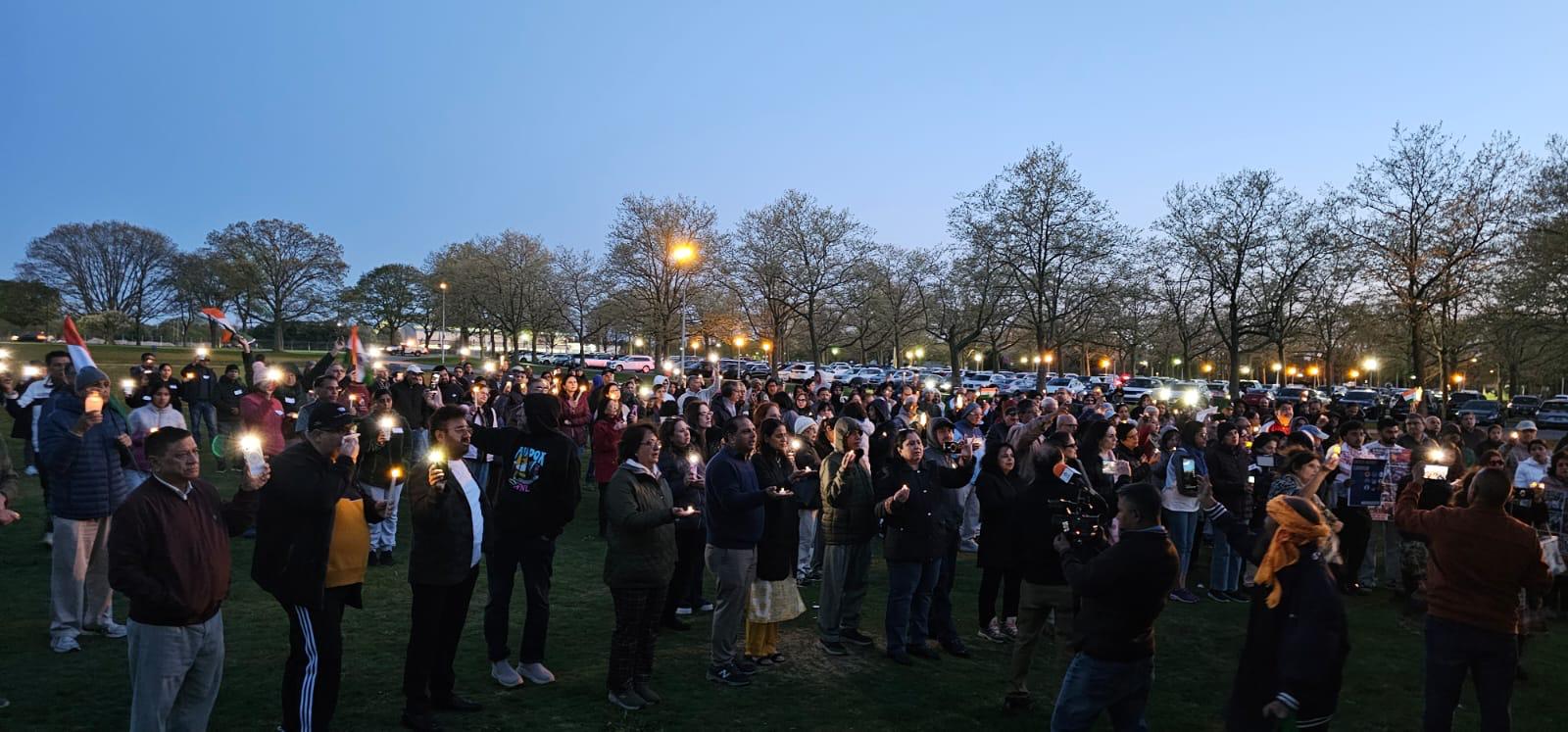 Nassau County Comptroller Elaine Phillips, North Hempstead Town Supervisor Jennifer DeSena, NY Senator Kevin Thomas, Town Clerk Ragini Srivastava, Councilman Edward Scott, and Wioleta D’Souza, Human Rights Commissioner – Nassau County, each sharing messages of sympathy, support, and solidarity. Several officials sent representatives, including County Executive Bruce Blakeman (via Elaine Phillips), Chuck Schumer, US. Senate Minority Leader for United Staes Senate (Taranbir Kaur), Oyster Bay Supervisor Joseph Saladino (Harry Malhotra), and Governor Kathy Hochul (Joey Ramirez).
Nassau County Comptroller Elaine Phillips, North Hempstead Town Supervisor Jennifer DeSena, NY Senator Kevin Thomas, Town Clerk Ragini Srivastava, Councilman Edward Scott, and Wioleta D’Souza, Human Rights Commissioner – Nassau County, each sharing messages of sympathy, support, and solidarity. Several officials sent representatives, including County Executive Bruce Blakeman (via Elaine Phillips), Chuck Schumer, US. Senate Minority Leader for United Staes Senate (Taranbir Kaur), Oyster Bay Supervisor Joseph Saladino (Harry Malhotra), and Governor Kathy Hochul (Joey Ramirez).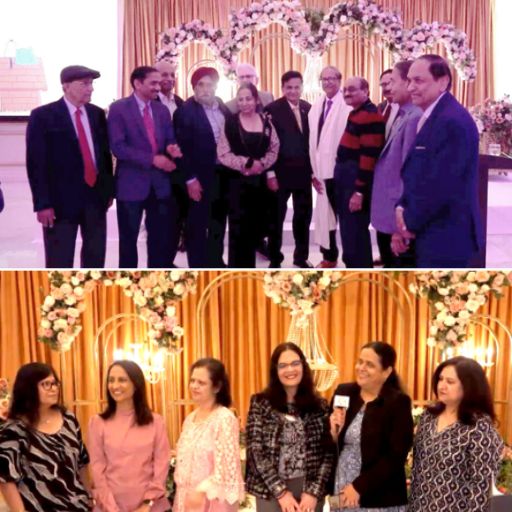
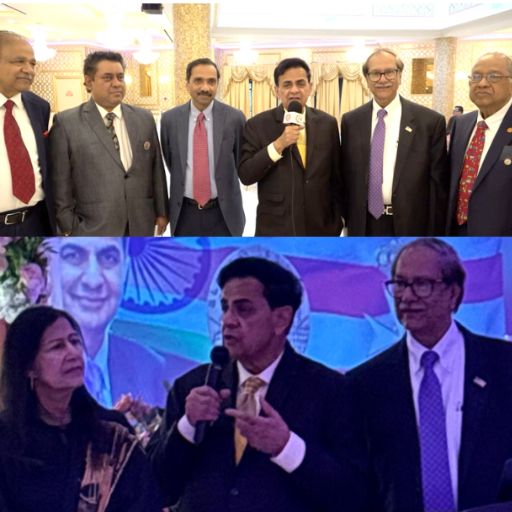

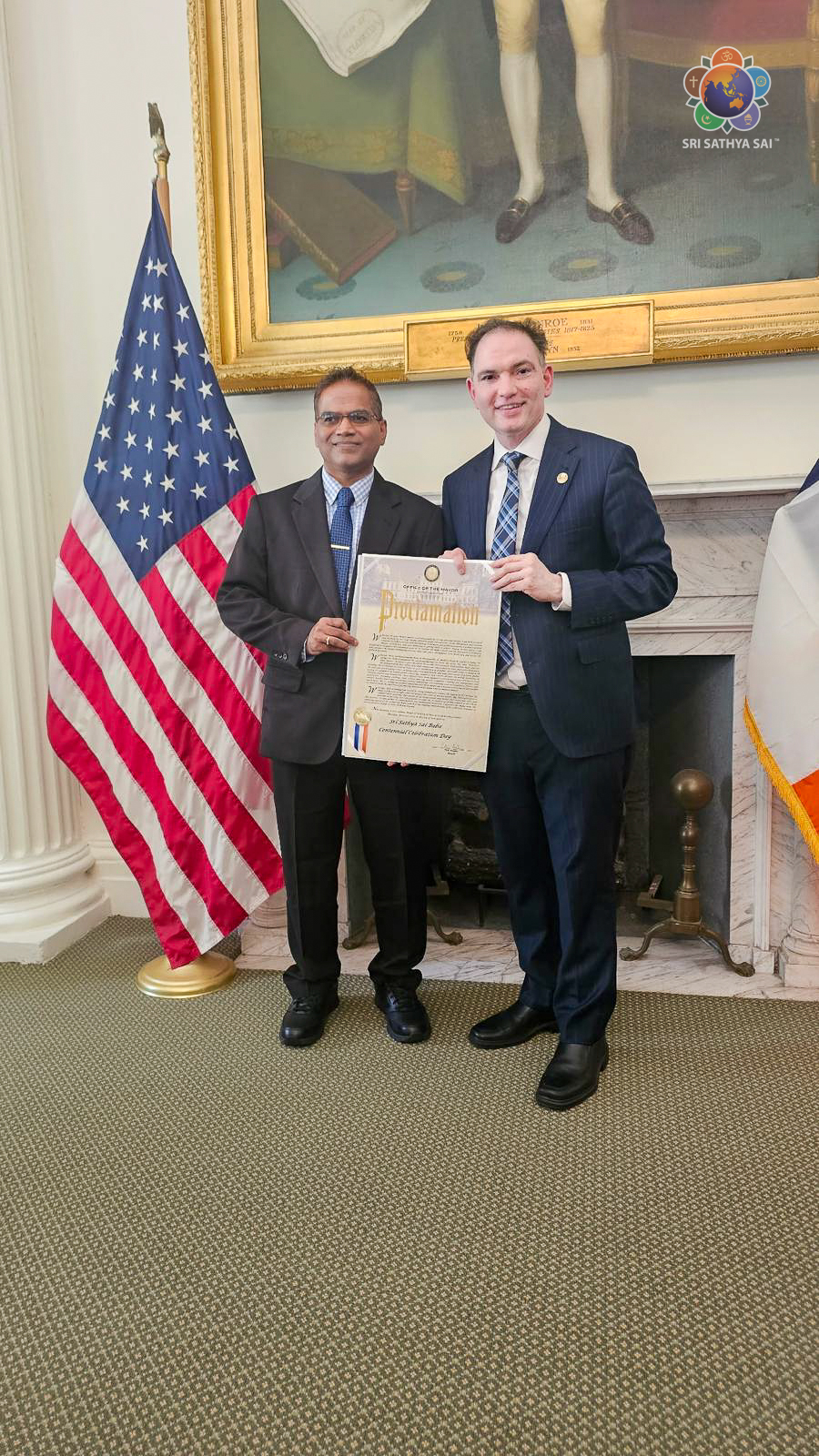 The proclamation ceremony took place in a formal setting and was presented by Deputy Commissioner Mr Dilip Chauhan. He was joined by officials from the Mayor’s Office and representatives of the Sri Sathya Sai Global Council, who gathered to witness this significant occasion. The proclamation celebrates Bhagawan’s life and philosophy, reflecting the city’s appreciation for his spiritual teachings and humanitarian work.
The proclamation ceremony took place in a formal setting and was presented by Deputy Commissioner Mr Dilip Chauhan. He was joined by officials from the Mayor’s Office and representatives of the Sri Sathya Sai Global Council, who gathered to witness this significant occasion. The proclamation celebrates Bhagawan’s life and philosophy, reflecting the city’s appreciation for his spiritual teachings and humanitarian work.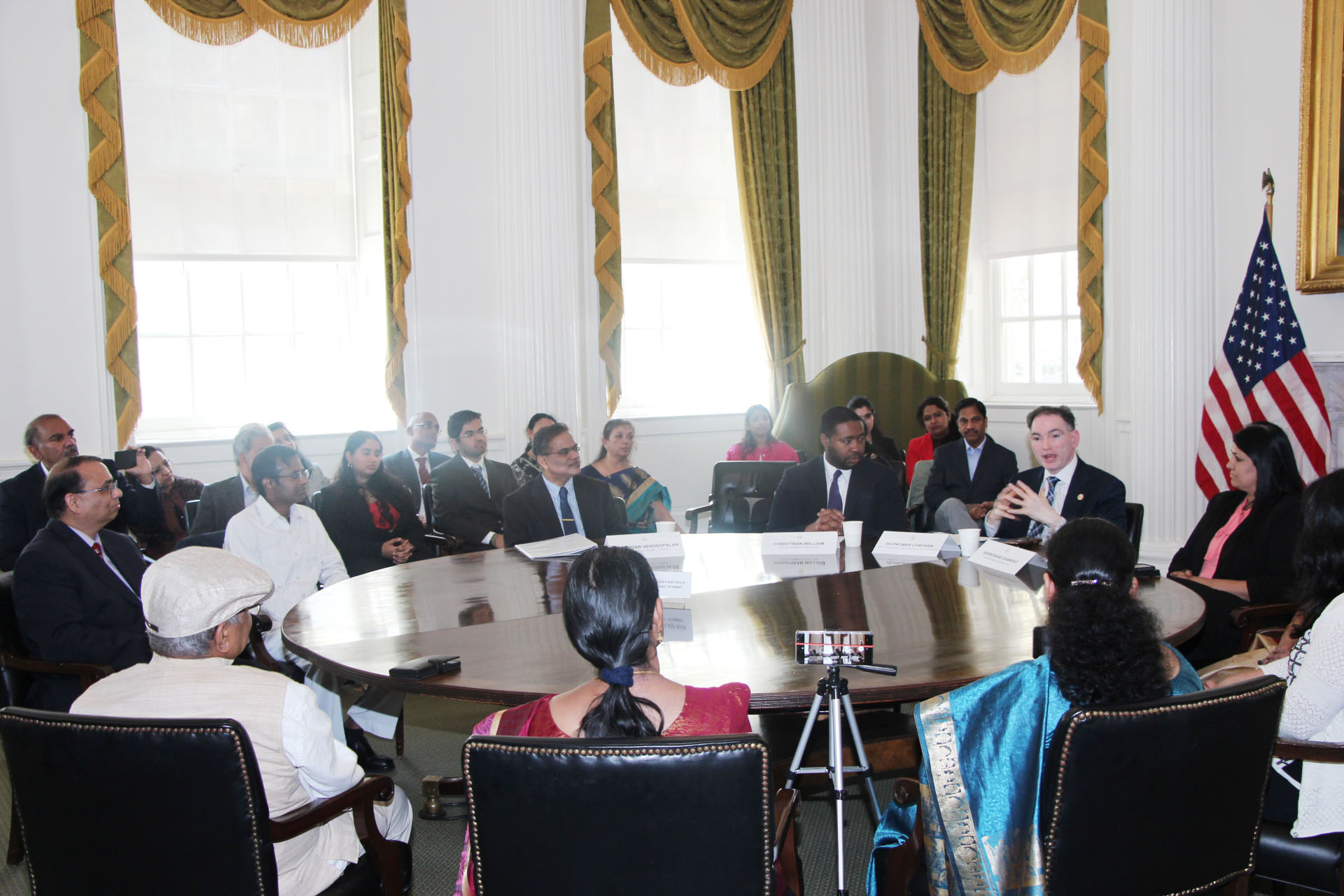 States. These include food distribution, hygiene kit supply, and youth education initiatives based on human values. Their tireless dedication was recognized as a continuation of Sri Sathya Sai Baba’s teachings, emphasizing love, service, and compassion.
States. These include food distribution, hygiene kit supply, and youth education initiatives based on human values. Their tireless dedication was recognized as a continuation of Sri Sathya Sai Baba’s teachings, emphasizing love, service, and compassion. One of the central figures present at the event, Sundar Venugopalan of the Sri Sathya Sai Global Council in Flushing, New York, accepted the proclamation on behalf of the community. Reflecting on the teachings of Sri Sathya Sai Baba, he emphasized that the core principle of all religions is fundamentally the same. “Sri Sathya Sai Baba’s main teaching was that the essence of all religions is one, urging us to see the divine spark within each and every creation,” Venugopalan stated. He added that Sai Centers around the world, including those in New York, promote spiritual growth and encourage service-oriented community engagement. “This centennial year, we are committed to expanding our service to those in need right here in New York City,” he affirmed.
One of the central figures present at the event, Sundar Venugopalan of the Sri Sathya Sai Global Council in Flushing, New York, accepted the proclamation on behalf of the community. Reflecting on the teachings of Sri Sathya Sai Baba, he emphasized that the core principle of all religions is fundamentally the same. “Sri Sathya Sai Baba’s main teaching was that the essence of all religions is one, urging us to see the divine spark within each and every creation,” Venugopalan stated. He added that Sai Centers around the world, including those in New York, promote spiritual growth and encourage service-oriented community engagement. “This centennial year, we are committed to expanding our service to those in need right here in New York City,” he affirmed.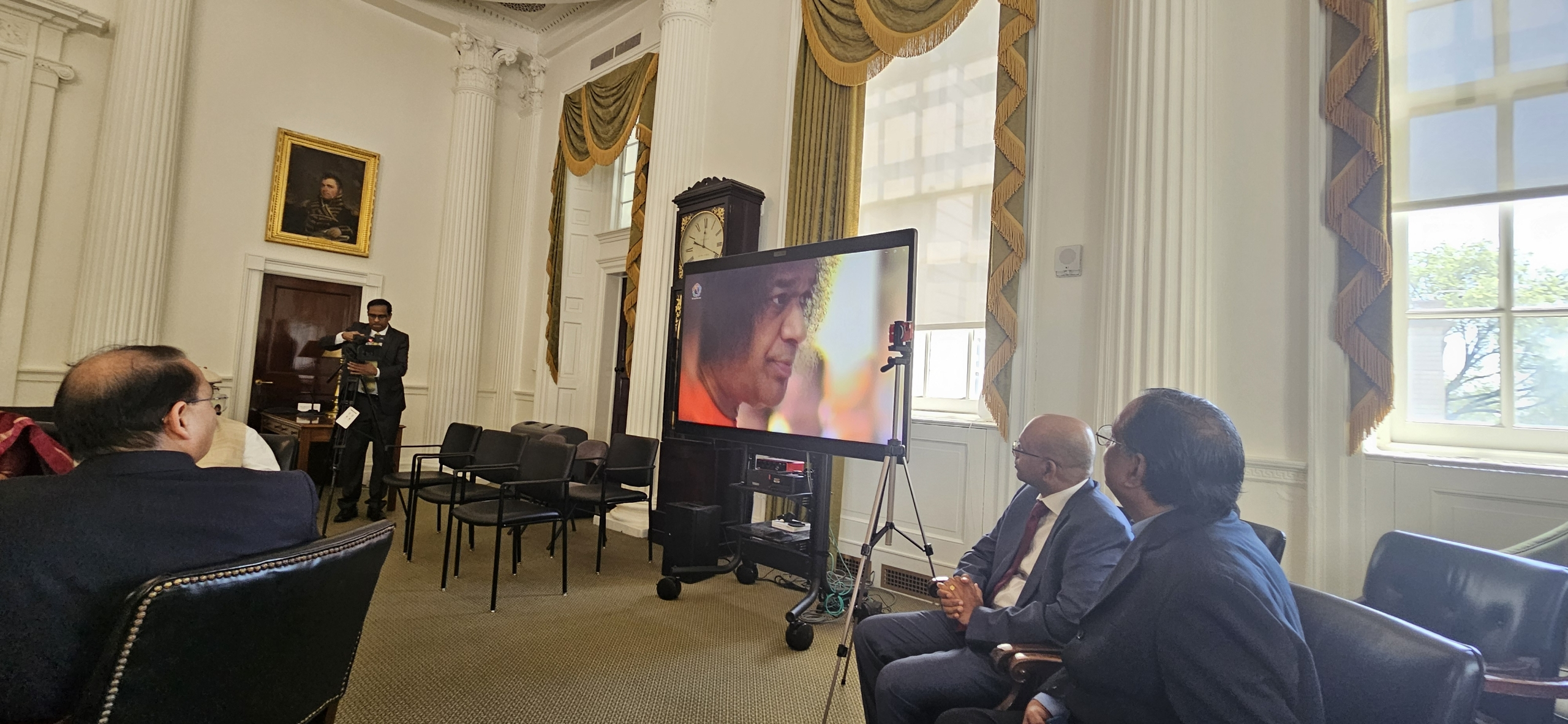 in the spirit of Bhagawan’s teachings. The proclamation from a city as diverse and globally influential as New York carries symbolic weight, reinforcing the universality of Sri Sathya Sai Baba’s message and mission. In the words of the organizers, “We offer our deepest gratitude to Bhagawan for this divine blessing. This recognition from New York City—one of the world’s most vibrant and diverse cities—beautifully echoes Bhagawan’s vision of global unity, service, and spiritual harmony.”
in the spirit of Bhagawan’s teachings. The proclamation from a city as diverse and globally influential as New York carries symbolic weight, reinforcing the universality of Sri Sathya Sai Baba’s message and mission. In the words of the organizers, “We offer our deepest gratitude to Bhagawan for this divine blessing. This recognition from New York City—one of the world’s most vibrant and diverse cities—beautifully echoes Bhagawan’s vision of global unity, service, and spiritual harmony.”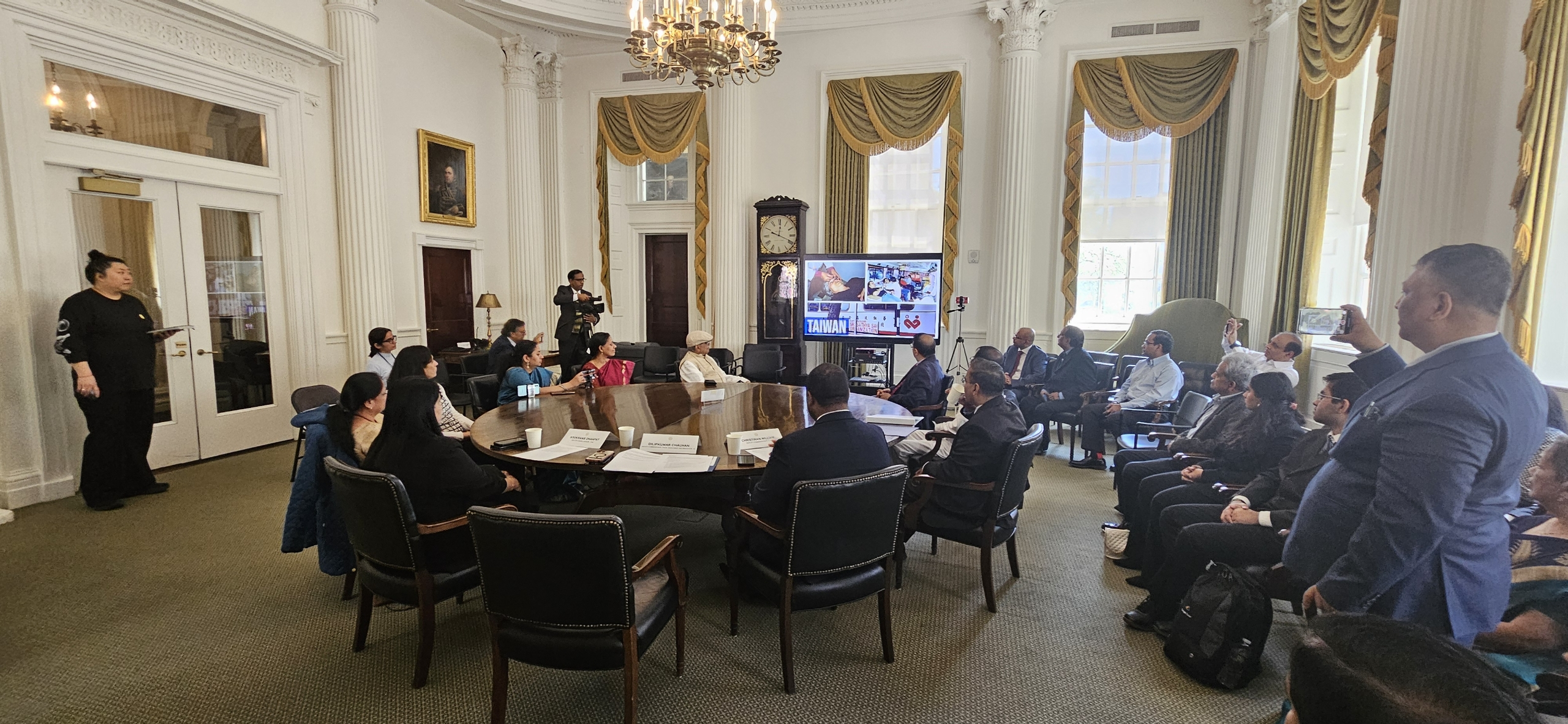 The ceremony, enriched by heartfelt expressions and multimedia tributes, concluded with renewed enthusiasm among the community to continue their work. The video documentary presented during the event provided a compelling overview of Sri Sathya Sai Baba’s global outreach efforts—ranging from free medical care and educational services to disaster relief and interfaith dialogue initiatives. These efforts were shown to be coordinated and implemented by volunteers and organizations inspired by his guidance and values.
The ceremony, enriched by heartfelt expressions and multimedia tributes, concluded with renewed enthusiasm among the community to continue their work. The video documentary presented during the event provided a compelling overview of Sri Sathya Sai Baba’s global outreach efforts—ranging from free medical care and educational services to disaster relief and interfaith dialogue initiatives. These efforts were shown to be coordinated and implemented by volunteers and organizations inspired by his guidance and values.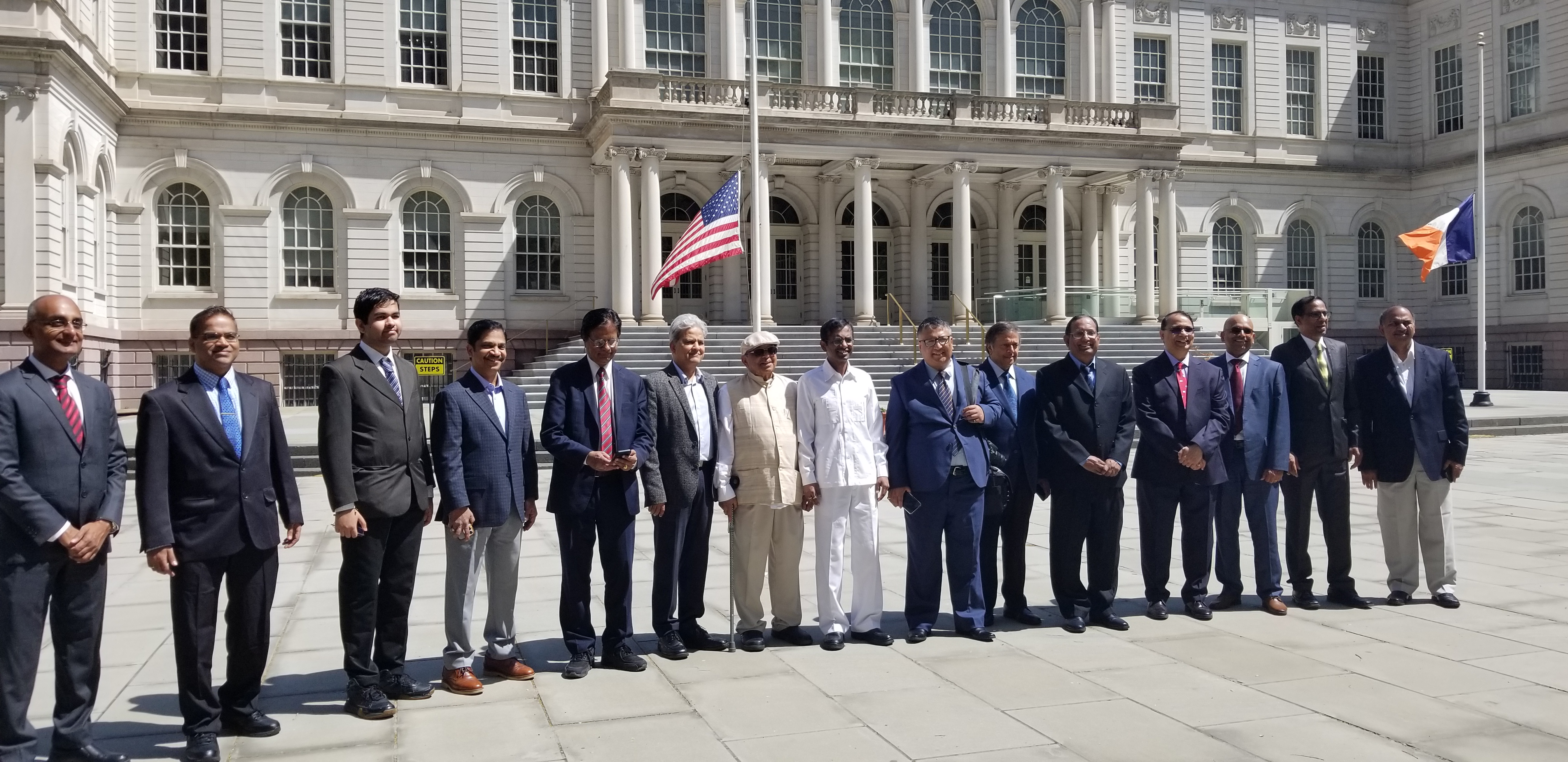 not only for his devotees but also for anyone committed to the ideals of love, unity, and humanitarian service. As emphasized by the proclamation, the legacy of Bhagawan continues to be felt through the actions of his followers who “Love All, Serve All” and live by the principle to “Help Ever, Hurt Never.”
not only for his devotees but also for anyone committed to the ideals of love, unity, and humanitarian service. As emphasized by the proclamation, the legacy of Bhagawan continues to be felt through the actions of his followers who “Love All, Serve All” and live by the principle to “Help Ever, Hurt Never.”



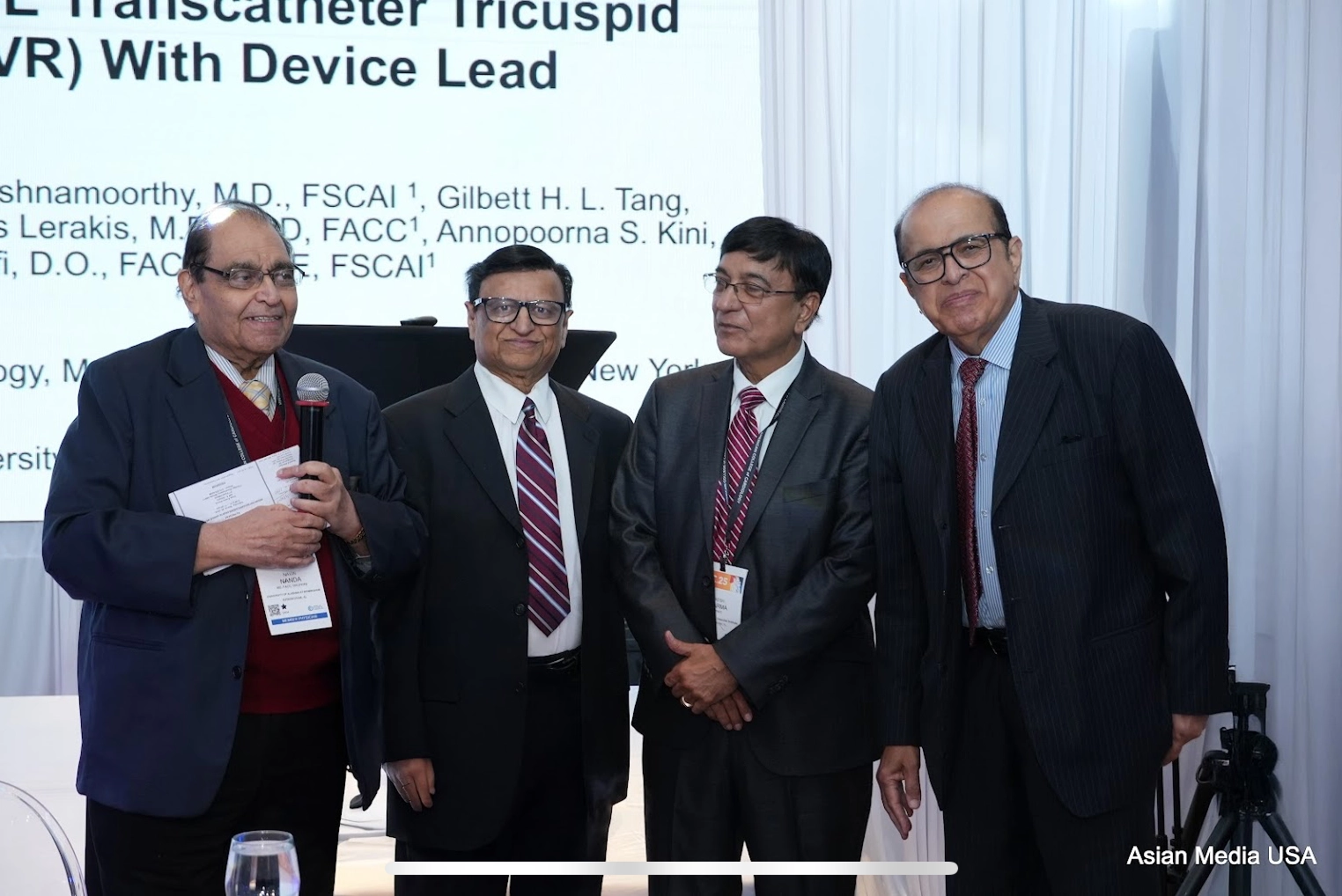

 The Global Malayalee Festival is planned to be held at the Crown Plaza Hotel, Kochi, on August 15 and 16, 2025. Describing the Festival as the largest ever Malayalees Sangamam, where Malayalees from all over the world are expected to be part of and celebrate the culture, traditions, and accomplishments of the Malayalee community, the organizers have urged people of Malayalee origin “to join in this great festival of global Malayalees in our beautiful homeland, God’s Own Country.”
The Global Malayalee Festival is planned to be held at the Crown Plaza Hotel, Kochi, on August 15 and 16, 2025. Describing the Festival as the largest ever Malayalees Sangamam, where Malayalees from all over the world are expected to be part of and celebrate the culture, traditions, and accomplishments of the Malayalee community, the organizers have urged people of Malayalee origin “to join in this great festival of global Malayalees in our beautiful homeland, God’s Own Country.” in India with an NGO status. The objective of the Festival is to offer a platform to network for the global Malayalees and stay connected for generations to come as members of the Global Malayalee Community.
in India with an NGO status. The objective of the Festival is to offer a platform to network for the global Malayalees and stay connected for generations to come as members of the Global Malayalee Community. “Malayalees from all over the World are invited to attend this great event, especially the new generation, born and raised outside Kerala. The Festival will be a perfect opportunity for the young generation to seek and explore their roots and heritage,” the organizers stated.
“Malayalees from all over the World are invited to attend this great event, especially the new generation, born and raised outside Kerala. The Festival will be a perfect opportunity for the young generation to seek and explore their roots and heritage,” the organizers stated. themes: 1. Innovating for a sustainable future, 2. Global Trade in the Digital Age, 3. Bridging Markets East Meets West, and, 4.The future of Trade, Trends and Predictions.
themes: 1. Innovating for a sustainable future, 2. Global Trade in the Digital Age, 3. Bridging Markets East Meets West, and, 4.The future of Trade, Trends and Predictions.


